Count Magazine
A SUMMER OF PROTEST
Youth take politics to the streets
WHITHER GEORGIA?
Between Russia and Europe

BREAKING THROUGH WALLS
An Israeli activist for Palestinian equality
HOUSE OF MEMELORDS
Political satire to grab voters


















 Justine Noble Deputy Editor-in-Chief
Eliana Nunes International Editor
Jamie Onslow Sub-editor
Cahal McAuley Production Editor
Vasiliki Tsekoura Art Director
Kai Kong Photo Editor
Roberta Spada Social Media Editor
Alex Daud Briggs Digital Editor
Heleena Panicker Digital Editor
Jasper Goddard Podcast Editor
Dara Zheleva Reporter
Anastasiia Udesiani Reporter
Abdi Abdalla Sub-editor
Spenser Surerus Art Director
Dom Plaskota Civic Action Editor
Lilian Crastan Culture Editor
Mia Jeronimus Chief Sub-editor
Lara Lovric Deputy Editor-in-Chief
Calum Taylor Voices Editor
Ana Garcia Sancho News Editor
Justine Noble Deputy Editor-in-Chief
Eliana Nunes International Editor
Jamie Onslow Sub-editor
Cahal McAuley Production Editor
Vasiliki Tsekoura Art Director
Kai Kong Photo Editor
Roberta Spada Social Media Editor
Alex Daud Briggs Digital Editor
Heleena Panicker Digital Editor
Jasper Goddard Podcast Editor
Dara Zheleva Reporter
Anastasiia Udesiani Reporter
Abdi Abdalla Sub-editor
Spenser Surerus Art Director
Dom Plaskota Civic Action Editor
Lilian Crastan Culture Editor
Mia Jeronimus Chief Sub-editor
Lara Lovric Deputy Editor-in-Chief
Calum Taylor Voices Editor
Ana Garcia Sancho News Editor
 Alice de Souza Editor-in-Chief
Alice de Souza Editor-in-Chief
Letter from the Editor
Dear Reader,
This is a monumental year for global democracy. Over 2 billion people, including the citizens of eight out of ten of the world’s most populous countries, have gone or are headed to the polls. Almost a quarter of the world’s population is choosing their representatives, many are advocating for their beliefs and defending democratic values.
Count is a magazine about the future of democracy, its transformations, and its challenges. We spotlight people and groups engaged in – and thinking of new ways to do – democratic politics. We at Count understand that politics doesn’t just take place at the polling station but also on the streets through individual and collective action. We believe in a future in which everyone has the right to vote and express themselves freely.
These pages contain stories about this super-election year on four continents. We hope our articles can show hope for finding new ways to promote democratic values.
Count Magazine was created as part of the 2023-2024 International Journalism postgraduate course at City, University of London.
Count Magazine Department of Journalism City University Northampton Square London
EC1V 0HB
TEL: 020 7040 8221
Email: countmagazine24@gmail.com journalism@city.com
Website: www.countmag.com
Printed by Rapidity
Count is produced by a team from 13 countries. We hope our diverse experiences and perspectives can help us illustrate our world’s growing anxieties; how authoritarian and populist leaders are achieving power through the ballot box in Indonesia and El Salvador, how the right to protest is at risk in the UK and how civil society in Georgia and Tunisia are struggling to survive.
We also show how politics is playfully and sharply expressed outside of formal spaces, through various media such as memes, theatre, cinema, music, and even video games. These stories should show that the fight to save democracy is alive and well. It’s championed by people young and old from all walks of life, from a transgender councillor who is working for local change in the UK, to an Israeli activist who is fighting for Palestinian rights, and a young Italian who is putting the climate crisis at the centre of his activism.
With democracy at risk globally, we hope these pages leave you with the understanding that your voice and vote count!
 Alice de Souza Editor-in-Chief
Alice de Souza Editor-in-Chief
Action News
Contents Civic
2 4 Overwhelming odds of Labour victory force bookies to adapt 4
candidates
of
politics 5
two-year delay 5
complicated and restrictive first
Senate election leaves citizens confused 6 ¡SORPRESA!: London’s Mexicans surprise at reelection of migrant congressman 6 Electronic voting under scrutiny in Brazil and India 7 Ignoring climate will deter young from voting, campaigners warn 10 Rights restricted 11 Citizens assemble! 12 Who will speak for Speaker’s Corner? 14 The elephant in the room 16 A summer of protest 18 Young, bold, and breaking the mold 19 An end to the two-horse race? 20 An election in the fog of war 22 Votes for kids
It’s no joke – UK’s satirical
make serious work
putting humour into
Kurdistan to hold elections after
Thailand’s
post-coup
Culture
3 28 Bodies on the ballot 30 Queer Texans and the race to the White House 32 To vote or not to vote? 33 Don’t blame the pollsters 34 House of memelords 36 Social media rebrand of Asia’s strongmen 38 Leading with an iron fist 40 Barriers at the ballot box 41 An unrecognised democracy 42 Black women resist Tunisia’s backslide 44 Georgia at the crossroads 46 Ukraine’s election dilemma 52 Passing the baton 54 Folk the system 55 A view from West Jerusalem 56 Radical hope 57 Called to climate action 58 Parklife 60 Making politics ‘sexy’ 62 Hit the notes, get the votes 64 Pop the vote! 66 Playing president 68 Fear and loathing in dystopian films
International Voices
Overwhelming odds of Labour victory force bookies to adapt
Calum Taylor
The general election campaign has now passed its halfway mark, but the Labour Party remain odds on to topple the incumbent Conservatives, according to both the bookies and opinion polls.
With three weeks left until polling day, the betting comparison site OddsChecker shows the odds are skewed towards a solid Labour victory, suggesting around a 97 per cent probability that the party wins the most seats at 1/41. This means a punter would win £1 for every £41 bet on a Labour win.
This aligns with widespread polling trends that predict a similar outcome, making the current election different to some more closely fought political contests in recent years such as the 2016 EU referendum and the 2020 US election.
Leighton Vaughan Williams, professor of economics at Nottingham Trent University, said: “2024 does present certain challenges for betting companies.” He added that when the outcome looks highly predictable, “the odds can become heavily skewed, reducing the incentive for bettors to participate and limiting the profitability for bookmakers.”
While some punters are deterred by this, many bookmakers remain optimistic.
“The prospect of a UK General Election in 2024 is particularly exciting for us,” said Kayley Cornelius, Political Specialist at bookmaker Betfred – “regardless of the polls and odds on the main outcomes.”
“Having a short favourite can be advantageous, attracting high-stake punters who bet on heavy odds favourites. For instance, we have had customers willing to stake £100,000 on a 1/10 shot to win £10,000, confident in their research and the polling data.”
But no bet is safe, and election campaigns can be volatile. For instance, when Prime Minister Theresa May called a snap general election in 2017, the odds for a Conservative majority were immensely favourable (2/11, or an 85 per cent likelihood). She later lost her majority.
Since the mid-2010s, betting on politics has boomed in popularity, fuelled partly by smartphones making it easier to access gambling platforms.
For Williams, the consequences for democracy are two-sided. Although betting can “enhance political engagement and provide additional data”, it can also “contribute to the commodification of democratic processes” and “potentially influence the behaviour of politicians and voters”.
If you have concerns about gambling, help is available at the National Gambling Helpline. Call 808 8020 133 for free information, support and counselling, available 24 hours a day, 7 days a week.
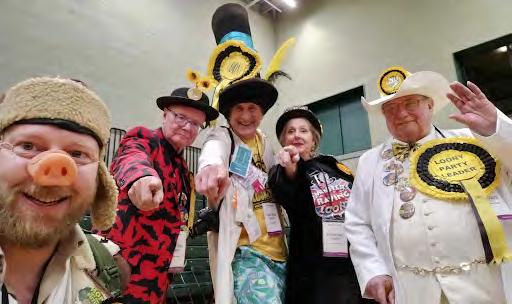
No joke: Satirical candidates make serious work of using humour
Roberta Spada
With at least 28 satirical candidates set to run in the upcoming general election, scholars say this very British phenomenon helps make politics more accessible.
“They are potentially a gateway drug into politics,” said Nicholas Holm, associate professor of media studies at Massey University in New Zealand. “These kinds of candidates often speak to people that have felt like they have been left out. It’s especially working class and impoverished youth, especially racialised youth.”
Howling Laud Hope, leader of the Monster Raving Looney Party, who is standing to represent northeast Hampshire, said: “We are the only party that’s on everybody’s side. We are the people’s party really.”
The Monster Raving Looney party was established in 1982 and is part of a tradition of satirical candidates, political figures and parties that use satire to shed light on sociopolitical issues.
“We have a laugh and joke but underneath it has many, many serious things,” said Howling Laud Hope. “The others are the joke,” he added.
Holm said these candidates’ approach helps people to emotionally connect to a political discourse that has become overly serious. “The use of humour makes it more attractive and amenable to a population who might not be as open to the critique if it were
expressed in non-humorous terms,” he explained.
For instance, one prominent satirical candidate, Count Binface, has called for a cap on the price of croissants, as well as building “at least one affordable house” in his latest manifesto. He is both mocking but also higlighting the current UK cost-of-living-crisis.
Satirical candidates have been livening up debates, creating chaos, and pushing for new policies in UK politics for decades.
Some of their achievements include campaigns for pet passports and lowering the voting age from 21 to 18. They don’t want to stop there – the Monster Raving Looney Party wants to give 5-year-olds the vote, to match what, according to them, is the behaviour of MPs in Parliament.
“If you don’t usually vote, then vote unusually,” said Hope.

4
Howling Laud Hope, the Monster Raving Looney Party
Monster Raving Looney Party
Members of the Monster Raving Looney Party
Monster
Raving Looney
Iraqi Kurdistan to hold elections after two-year delay
Eliana Nunes
Iraq’s Independent High Electoral Commission has proposed that long-overdue parliamentary elections in the semiautonomous region of Kurdistan will be held on 5 September.
The nearly two-year delay in holding the elections highlights the challenges of maintaining democracy in Kurdistan, which is home to over 6.5 million people.
“The central Iraqi government and the Kurdistan Regional Government [KRG] usually disagree on various issues including power-sharing,” Mehdi Dehnavi, a Middle Eastern affairs analyst, explained.
Their most recent disagreement was over the Kurdistan parliament’s electoral system. The ruling Kurdistan Democratic Party (KDP) boycotted elections that were scheduled for this month, after accusing the Federal Supreme Court of Iraq of making “unconstitutional” changes to the make-up of the parliament.
In February, the Iraqi court, established as an arbiter between the governments of Iraq and Kurdistan, eliminated the Kurdish parliament’s 11 quota seats for minorities –
five of which have since been restored. These minority seats typically support the KDP and enabled the party to achieve its majority in 2018.
Michael Rubin, an author on Kurdistan and senior fellow at the American Enterprise Institute, said the recent election delay had nothing to do with democracy, but was in fact a strategy to benefit the KDP government led by President Nechirvan Barzani and his cousin, Prime Minister Masrour Barzani.
“While the Barzanis control enough of the mechanism to win any election,” Rubin said, “Masrour Barzani is afraid that losing votes – a near certainty – would show him to be weak.”
But the KRG spokesperson, Peshawa Hawramani, told Count: “The Kurdistan Regional Government will do anything to ensure the elections take place.” Hawramani added that consistent election delays – the result of “disagreements between parties” –have caused “huge problems for Kurdistan’s legislative institutions”.
According to analyst Dehnavi, before September’s elections: “It is first necessary to strengthen non-partisan institutions
such as [Iraq’s] Independent High Electoral Commission to manage electoral processes transparently and fairly, free from party influence.”
Dehnavi said that if these issues are not resolved, another election delay could “have significantly negative impacts on issues of regional legitimacy”.
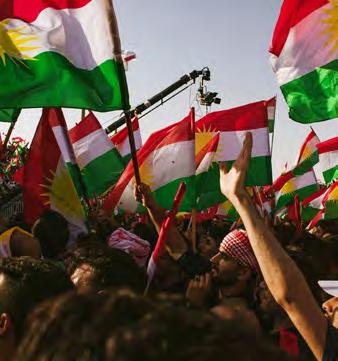
Thailand’s complicated and restrictive first post-coup Senate election leaves citizens confused
Alex Daud Briggs
Voting has begun in Thailand’s first post-coup Senate elections on 9 June, with the second of three rounds taking place on 16 June. But most Thais won’t be able to vote.
This is because the franchise is restricted to the 46,206 people who have been approved to stand in the race, to choose 200 senators in what some commentators have described as the most complicated elections in the world.
The candidates, who have been ‘self-voting’, must not belong to any political party or have held any prior political office. They also
need to belong to 20 occupational groups and categories, including “arts” “tech” and “women”.
Critics argue that the system is undemocratic. Content creator Norrachai Anansakdakul said “It doesn’t reflect democracy. To apply and vote, you need to pay a high fee of 2,500 baht (£53).
Candidates must be above 40 and have ten years of work experience, meaning many people won’t participate.”
Information about the election has also been scarce, with limited publicity and candidates barred from campaigning
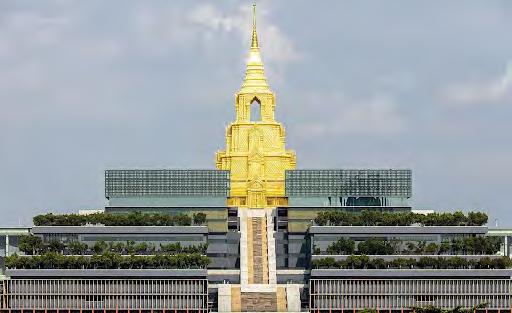
beyond posting a profile on the Electoral Commission website.
A student, who wished to be identified under the alias Pond, said she only learned about the elections a few weeks ago through a podcast. She noted that many of her peers also learned about it recently and found the voting system difficult to understand.
“There is one group for health and another for all elderly and minorities together,” Pond said. “They claim it keeps the election clean, but what stops people in different groups from making deals with each other to get voted?”
The new senate will replace one that was appointed by the military junta after the 2014 coup and is supposed to transition authority to regular citizens.
Nanyang University political professor Duncan McCargo said the complex system is being used because the junta and conservative elites who support the monarchy believe elected politicians are easily corrupted and see the senate as “wise elders”, who can keep them in check without being “tempted” themselves.
“This self-selected senate is supposed to be a force above politics,” McCargo said. “Critics, however, argue it’s to ensure the senate is composed of individuals who will not rock the boat, following their [the junta’s] influence.”
McCargo noted that information around the elections is “vague, and most people just can’t even get their heads around it”.
NEWS
5 Supanut Arunoprayote
Levi Meir Clancy
Sappaya-Sapasathan, the Thai Senate and parliament building in Bangkok.
¡SORPRESA!: London’s Mexicans surprise at reelection of migrant congressman
Ana Garcia Sancho
Mexicans abroad have had a mixed reaction to news that Raul Torres was elected earlier this month to represent them as the migrant congressman for Mexico City.
Torres was elected in what were the largest elections in Mexico’s history, with polls at national, state and local levels, and which saw Claudia Sheinbaum win the race to become the country’s first female president.
The role of migrant congressman was created by the Mexico City Congress in 2021. An advisor to the city’s Electoral Institute said at the time that “the person would be a connection of the capital-dwellers away from their home”.
Three years on, Mexican voters in London were surprised to learn there was such a representative. “I didn’t know there was such a thing as a migrant congressman. I was a bit disappointed as I didn’t have time to research them. I would like to know their proposals, but I find it amazing that there is someone to speak for those of us that are away,” said Mariana, a student.
There are 12.27 million Mexicans living
abroad, the majority of them in the US. However, according to the National Electoral Institute only 100,156 Mexicans overseas registered to vote. Still fewer were eligible to vote for the migrant congressman as Mexico City is the only area in Mexico to have one – 24,036 former residents of the city were qualified to vote for the position.
“I am especially concerned that only Mexico City is represented. It feels exclusionary,” said Sofia, a Mexican studying engineering in the UK.
This is Torres’s second term. He represents the opposition coalition to the current government, and his campaign literature stated that he had enacted positive changes for Mexicans living overseas over the past three years. For example, he established a procedure for processing and sending drivers’ licences for overseas residents of the capital.
One former Mexico City resident and former campaigner for the Mexican Institutional Revolutionary Party, said he knew about the role and was familiar with the candidates before
casting his vote. “I was disappointed in the Zoom meetings that the candidates organised for the Mexicans in London,” said Manuel. “There was no proposal focused on us. They only cared about Mexicans in the United States. They don’t realise that at least half of us are not in the USA.”
Just 68,898 Mexican citizens in the US were registered to vote, meaning 30 per cent of overseas voters lived elsewhere.
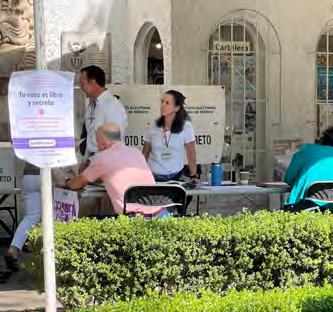
Electronic voting under scrutiny in Brazil and India
Alice de Souza
Brazilians will be voting in municipal elections in October, the first polls to be held since former president Jair Bolsonaro was banned from holding office for eight years after judges ruled he had spread disinformation about Brazil’s electronic ballot boxes. Observers see the upcoming elections as a test of voters’ trust in electronic voting machines (EVMs).
Questions about and criticisms of electronic voting have been voiced in other countries, such as India and the US, two of the ten countries that will be using
electronic ballot boxes in elections this year, according to the International Institute for Democracy and Electoral Assistance.
In Brazil, around 153 million voters will cast their ballots through EVMs, with counts expected to be ready three hours after polling stations close. Despite their efficiency in providing results, the system has been subject to disinformation, including from the former president who claimed the elections in 2022 were rigged against him.

Although Brazil’s Supreme Electoral Court (TSE) censured Bolsonaro for making false claims, a survey published by the Genial/Quaest Institute last May found that 35 per cent of Brazilians still believe the machines were rigged.
“The critics want to disqualify the electronic ballot box to disqualify the democratic process. No single fraud case has been proven in the 28 years they have been used. Independent institutions analyse all complaints,” said Giuseppe Janino, former secretary of information technology at the TSE and one of the Brazilian electronic ballot box creators.
The Brazilian machine’s security scheme includes digital signatures and cryptography. In addition, the software is open a year before the elections for auditing by 15 institutions, including political parties and the Federal Police.
Meanwhile, in India, there were also disputes about ‘e-voting’ in this year’s elections. Although EVMs have been used in the country since 1982, a research institute published the Lokniti study ahead of the election that revealed concerns about the reliability of EVMs. The country’s Supreme Court rejected a petition against using the machines.
An Indian human rights lawyer, Rohit Sharma said he was confident about the integrity of the results overall, but added there were “some polling booths and rooms where EVMs are malfunctioning”.
Connie Sanchez
Electronic voting machines in Brazil
Luiz Roberto/Secom/TSE
6
Voting poll in Mexico City

Ignoring climate
will deter young people from voting, campaigners warn
Dom Plaskota
Green activists have cautioned that the lack of climate policy discussion by the Labour and Conservative parties ahead of the general election will increase apathy among young voters.
An organiser for climate protest group Extinction Rebellion Mack, who is in his twenties, blamed the UK’s first-past-the-post electoral system. “It’s a broken system. It’s in the interest of the main parties not to talk about it,” he said.
He spoke to Count at an Extinction
Rebellion protest outside the annual general meeting of oil and gas giant Shell in London the day before Prime Minister Rishi Sunak announced the election would be held on 4 July.
Joe, another young protester, said: “I don’t think parliamentary politics is what it’s made out to be. I don’t think it’s driving people away from the two main parties. I think it means they won’t vote.”
A poll published by ITV and Savanta in April found over half of 18-25-year-olds
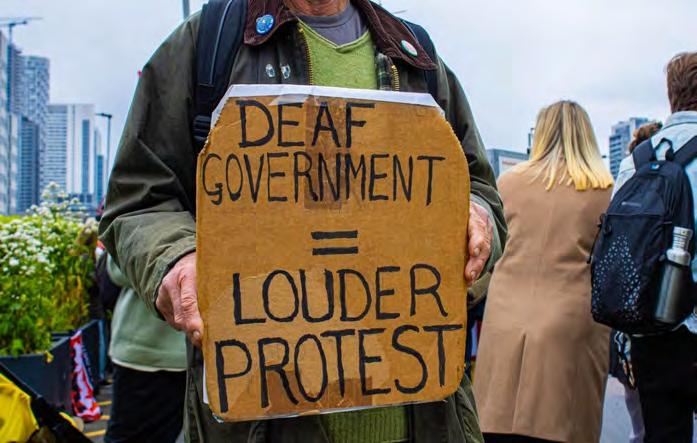
feel politicians don’t care about them. The respondents named the environment in their top five election issues alongside issues like housing and mental health.
Last year Conservative Prime Minister Rishi Sunak backtracked on the UK’s net zero commitments and delayed the introduction of key climate policies, most notably a ban on the sale of new petrol and diesel cars which was postponed from 2030 to 2035.
In February, Labour Party leader Keir Starmer reduced the amount of green investment Labour pledged to spend if they win the election from £28bn to £4.7bn.
Liberal Democrat Councillor and Lead Member for Climate Change at Guildford Borough Council George Potter said young people would feel disillusioned because “the Conservatives have backtracked to appease the hard-right, and Labour have scrapped their climate plans because they want to appeal to Conservative voters and are assuming that progressive voters have nowhere else to go”.
However, green transition expert Dr Leanne Wilson from the Labour-controlled North East Combined Authority in northeast England stressed the need for pragmatism.
In a virtual panel organised by climate policy think tank Centre for Progressive Policy, she said: “There’s a huge amount of work being done. Sometimes I think there is a risk of making the perfect the enemy of the good.”
Extinction Rebellion Youth’s Joe being carried out of Shell’s annual general meeting
Dom Plaskota
NEWS Protest outside Shell’s annual general meeting 7
Dom Plaskota






Civic Action
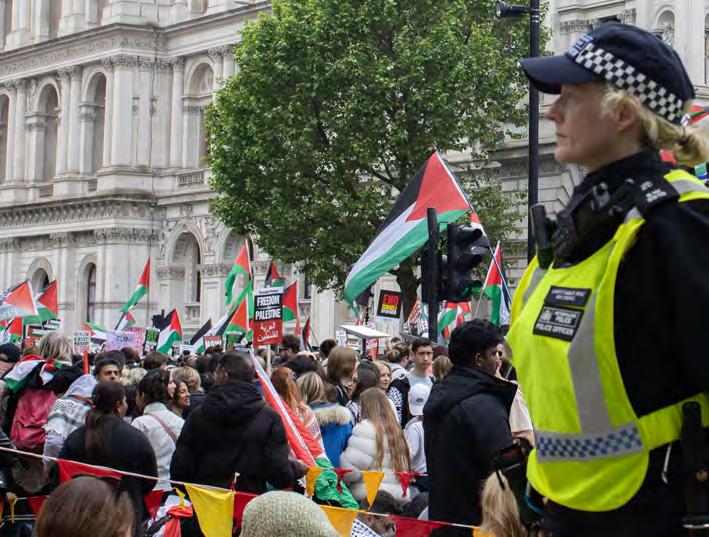
Rights restricted
How the UK government pushed back against protesting
Roberta Spada
Anoisy crowd was marching through Oxford Street wearing keffiyehs and waving Palestinian flags, when Jacob, who for safety reasons does not want to disclose his real name, felt a tap on his shoulder. A police officer started asking questions about his placard reading “intifada till victory” – one of the many slogans the people around him were chanting. Under the slogan was an explanation of what intifada (“resistance” in Arabic) meant to him.
After answering several questions from the police officer, he walked away. Soon enough he felt a hand on his arm. Police dragged him to the other side of the road and started questioning him again.
An officer explained to Jacob that he was being arrested under the Public Order Act 2023 for displaying the word intifada.
Jacob says he remains under police investigation. His case is not unique. Arrests for similar reasons have become a reality in UK protests. The Public Order Act 2023 was the last step in a series of new laws passed by the Conservative government to crackdown on protests.
The law has granted the police greater
powers, lowering the threshold for what is considered “serious disruption”.
“Essentially you have to accept the fact that there’s a very good chance that you’re going to prison if you want to do a protest that is heard by anyone,” says Gabriella Ditton, an organiser from the climate activist group Just Stop Oil. “I don’t think most people understand that in order for a protest to be effective some people are going to be inconvenienced.”
The new laws allow the police to impose a start and finish time for protests and set noise limits. They also criminalise locking-on, where protesters attach themselves to a target, and any act which interferes with the use of key national infrastructure. The restrictions are now extended not only to protest marches but also to static demonstrations.
According to Katy Watts, a lawyer at the human rights association Liberty, these new offences target specific actions which have been a signature part of climate and racial justice activism’s strategy.
“It’s clear that the government is explicitly targeting people protesting about racial justice and the climate crisis,” Watts says.
“The government was determined not to
deal with [these issues]. It instead turned to criminalising people who are making their voices heard.”
While the government has targeted certain causes, the police have targeted certain people.
“I do think there was an element of racial profiling,” says Jacob, who is a brown man, about his own arrest. He says he was the only person arrested of those displaying the word intifada.
A May 2024 report by Netpol, a police monitoring network, on the policing of pro-Palestinian protests in Britain, found that “there has been a pattern of racial profiling at demonstrations that has included not only the targeting of Palestinians or Arabic-speaking protesters but also Black and brown children and young people.”
The report also found that there were systemic abuses of power from Police Scotland throughout the COP26 conference and its associated climate protests.
“Every copper thinks that they are a good person and [so] you can trust them with more power and they won’t use it when it’s not appropriate. But that is total and utter fiction,” claims Paul Stephens, a retired policeman turned climate activist. “There will be exceptions where it will be used in the wrong way.”
The right to protest is fundamental to democracy and is a right protected by international law and by Article 11 of the UK Human Rights Act.
“The law has created an atmosphere where people are uncertain about whether or not they can take to the streets to exercise their right to protest,” says Watts. “That [has a] real chilling effect on people.”
“This government fully supports the right of individuals to engage in peaceful protest,” says the Home Office website. “However, the serious disruption caused by a small minority of protestors has highlighted that more needs to be done to protect the public and businesses from these unacceptable actions.”
Crowds continue to fill the streets of the UK, in demonstrations for climate justice, human rights, and against war. As the country heads for a general election, it is yet to be seen how the legislation will continue to affect the right to protest.
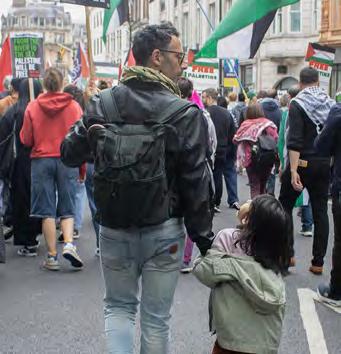 Police overlooking pro-Palestine protest 2024
Family at pro-Palestine protest 2024
Police overlooking pro-Palestine protest 2024
Family at pro-Palestine protest 2024
10
Roberta Spada
Roberta Spada

Citizens assemble!
The climate movement’s shift into deliberative democracy
Jamie Onslow
After years at the forefront of UK climate activism, Clare Farrell concluded that without any real political power, the movement would continue to be ignored by politicians.
She likens the relationship between citizens and politicians in the UK to a “parent-child dynamic; we go outside and shout and say ‘pay me attention’ [but politicians] don’t listen”.
Farrell speaks from experience when it comes to going outside and shouting – she is a founding member of Extinction Rebellion, the group that kick-started a new era of climate protest in the UK in 2019.
Five years on, she is frustrated at the government’s lack of progress on climate goals. In Farrell’s view, if the political system isn’t responding, a new way of doing politics is needed.
“We want to build up power, for people to be self-organised”
So, in 2022, alongside fellow XR founder Roger Hallam, she started Humanity Project, a movement that aims to create a national network of “popular assemblies” – or “pops” –that will leave politicians with no choice but to take notice of their demands.
The group’s activities are in the tradition of deliberative democracy, in which citizens are
empowered to make policy decisions, rather than elected politicians.
Whilst Humanity Project are currently focusing on grassroots organising, one possible vision is the replacement of the House of Lords with a “House of Citizens”, according to a Humanity Project coordinator.
So far they have convened around 50 “pops” all over the country. The organisation’s facilitators work with local community groups who spread the word through outreach efforts.
At inaugural “pops”, the focus is on listening to the needs of local communities, which are then refined into an agenda. In June, Humanity Project will hold its first national assembly, an online event at which “pop” attendees picked at random from the local meetings will work on a national agenda.
Liam Killeen is a PhD researcher at Lancaster University studying the climate movement’s political organisation. He sees this development as born out of a “feeling of powerlessness”, exacerbated by the government’s increasing intolerance of disruptive protest.
“People are scared to protest,” he says. “We’ve seen attacks on the European Court of Human Rights, [and] the 2023 Public Order Act. Liberal democratic principles are under attack.”
Killeen is a firm believer in the potential held by deliberative democracy, where citizens – not elected representatives – make decisions on policy issues.
“One thing that you witness when you go to a self-organised, deliberative democratic forum is the transformation that people in the room experience from being really
disengaged to having their voice heard and appreciated,” he contends.
Humanity Project’s activities are part of a wider trend of experimentation with forms of deliberative democracy. The UK government held a national climate assembly in 2021, and dozens more councils have held their own citizens’ assemblies, often specifically on climate issues.
Killeen is sceptical of the way citizens’ assemblies have been used so far by government bodies. “What we’ve seen [with] citizens’ assemblies around the UK is that they’ll be instrumentalised,” he insists. “People pretend to be enamoured with the idea of deliberative democracy. But when push comes to shove, councils only really want recommendations that align with their current strategy.”
Farrell similarly says that the 2021 national climate assembly was ineffective because the government set the agenda: “They retain the power, so they can have the assembly and say, ‘You’ve all had a chat and we’ve listened to you and now we can ignore it if we want to’.”
Whilst its precise contours are still being worked out, Humanity Project’s vision is more radical. It would at minimum involve deliberative bodies having independent political power. “Without any sort of material power for the assembly to assert itself into the political space, it’s just a fancy focus group,” says Farrell. “We want to build up power, for people to be self-organised,” she adds.
It remains to be seen whether Humanity Project will be able to mobilise people on the scale managed by XR, or whether the political establishment will be any more amenable to this new form of activism. The group’s emphasis on extra-parliamentary organisation leaves them open to charges that they are encouraging disengagement from electoral politics. Luke Akehurst, a member of the Labour Party’s National Executive Committee, cautions against “the urge to have non-parliamentary forms of democracy”. “I would urge people to not lose faith with the conventional democratic process,” he adds.
Killen is clear, however, that groups like Humanity Project have the potential to invigorate our political process: “[It’s not that] either you act within the current democratic institutions, and therefore you’re democratic, or you act outside, and therefore you’re not.”
CIVIC ACTION 11
Neil Marshmen
‘Pop’ in Cornwall
Who will speak for Speakers’ Corner?
Historic site is a magnet for content creators
Alice de Souza

Standing on a small green foldable bench, a man gets a rise out of onlookers by calling for the sterilisation of all men and heterosexuals. “Please do the right thing. You’ll no longer be a danger to women and society,” he says. No more than ten people are present listening to him. Some laugh at the scene. Others are annoyed and interject, raising their voices to defend straight peoples’ sexual freedom.
Despite the small size of the speaker’s live audience, around 330 people follow his speech online on a gaming platform called Kick, as it’s live-streamed by 32-year-old Shako Mako. While filming, Mako says that this is the moment her 15,000 followers are most eager to see.
Shako is one of many live-streamers who visit the Speakers’ Corner on the north-east edge of Hyde Park in London each Sunday. This historic space, known as the oldest living free speech platform in the world, is currently a hotspot for digital content creators.
Located near Marble Arch, Speakers’ Corner stands in the same place that convicts would deliver their dying speech before being taken to Tyburn Gallows, where public hangings took place between 1196 and 1783. In 1866, it became a forum for wider political discourse after people marching to support the Reform League used it as a platform to campaign for universal manhood suffrage.
“Speakers’ Corner has always been a space for people who don’t get their voices heard in the mainstream media, to go there to try and get their voices heard,” says John Roberts, professor in sociology and communications at Brunel University London. According to him, this is one reason it’s still active today. “People used to gather there to see people executed, but also turning up to see those institutions that are very critical of the government,” he explains.
The Parks Regulation Act of 1872 frmalised the existence of Speakers’ Corner in Hyde Park. However, Roberts notes that while the space is regarded as a “powerful symbol of the arrival
of liberal democracy in the UK, free speech has never legally existed in that space”.
Nevertheless, every Sunday since the Act, a crowd of speakers gathers between late morning and afternoon to spread their messages and ideas to passers-by and tourists, whether they are interested in hearing them or not.
As a barometer of the last two centuries of political and social change, Speakers’ Corner has had speakers such as Karl Marx, Vladimir Lenin, and George Orwell. It was also the birthplace of the suffragettes’ ‘Votes for Women’ campaign.
Nowadays, in Mako’s words, it is much more of a “content corner”. “People come here to film and photograph the speakers who come to say random things. As a content creator, I feel this is my place,” she says. Others, however, still retain the original tradition of listening to the speakers in person without worrying about content.
Mako has attended Speakers’ Corner every Sunday for at least three years. A year ago, she started doing live-streams there and sometimes
12
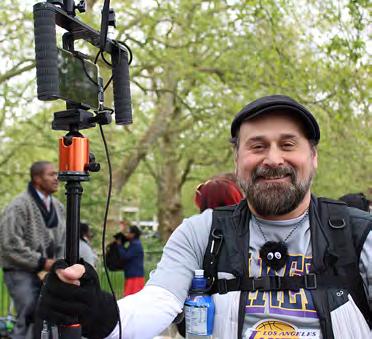
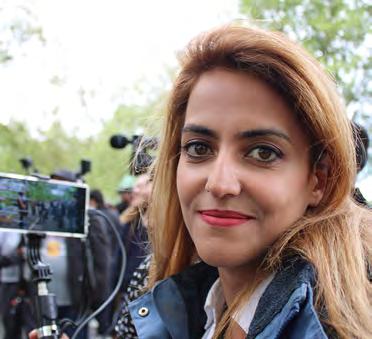
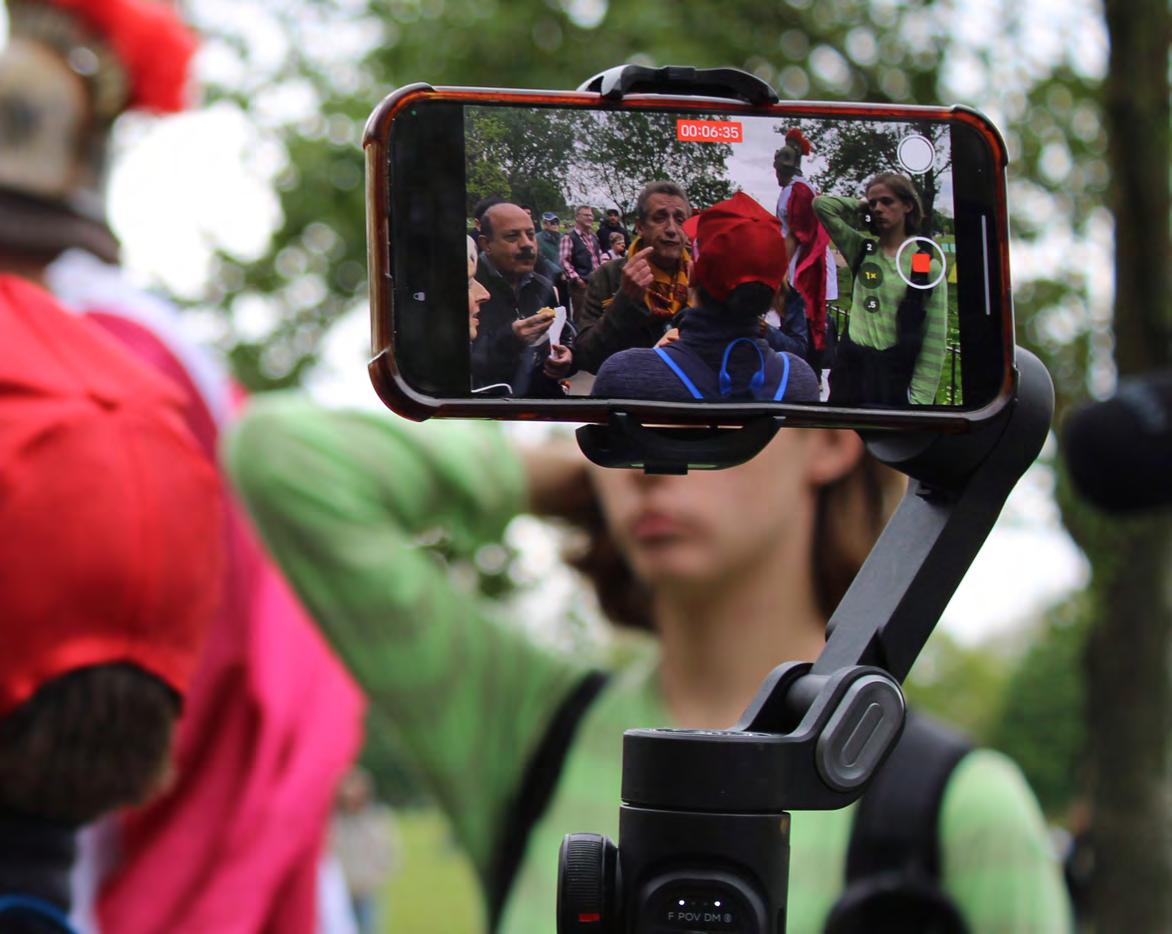
spends up to seven hours wandering among the speakers and hecklers. She has become familiar with the regulars.
The man who defends the sterilisation of heterosexuals is her favourite. “He says absurd things, but seriously, and people believe him,” she laughs. At this point, she’s already been live-streaming on her mobile phone for over four hours. “I stay here until the battery runs out,” she says.
Next to her, a man stands next to a mobile tripod containing a live-streaming mobile phone, a GoPro camera, and a directional microphone. He refuses to state his identity and age without explaining why, and prefers to be identified by his YouTube channel, Hafez Reflects, which has 1,500 subscribers and gets around 300 views per video.
Hafez has been going to Speakers’ Corner since 2018 to watch the speeches of far-right activist Tommy Robinson, but it was the diversity of conversation that roped him in for good. “This place becomes very addictive
because it’s only one day a week,” he says. He especially enjoys how he can start a conversation with someone and return to it later. “If you don’t finish it, you return next week,” he explains.
He started doing his YouTube lives at least twice a month around a year ago, targeting viewers overseas, especially in the United States. Now, it’s a regular thing:
“I do a live because a lot of my audience loves it. This is like their Sunday thing now. They complain when I don’t come.”
As he’s being watched by 21 people, he’s even wary of stepping away from the action for an interview. “Nothing is happening, so it’s boring for them,” he says.
However, not everyone with a video camera at Speakers’ Corner is there for entertainment. Some are there to film organisations and speakers, as is the case with 34-year-old cinematographer Gary Blake who has been filming the speeches of an Islamic organisation there for eight years.
For him, even though he can’t contribute, Speakers’ Corner is simultaneously exciting and frustrating. “You learn a lot from others. But some things said are offensive, and we can’t do anything about it because this is a place of freedom of speech,” he says.
Despite this feeling, the 1872 Act establishes rules for being at Speakers’ Corner, and police officers are often seen at the crowd’s edges. When the debate heats up, they get closer.
However, those at Speakers’ Corner aren’t looking for a fight. Here, unlike in the digital world, exposure to public scrutiny directly impacts how speakers and hecklers fuel speeches and responses. They all seem to be doing their best to ensure Speakers’ Corner will survive more centuries to come.
“A social movement that’s just online will be quite limited. These spaces are important to reclaim public areas for the commons and democracy,” concludes Professor Roberts.
Sunday in May, 2024, at Speakers’ Corner
CIVIC ACTION 13
Alice de Souza
Shako Mako
Hafez Reflects
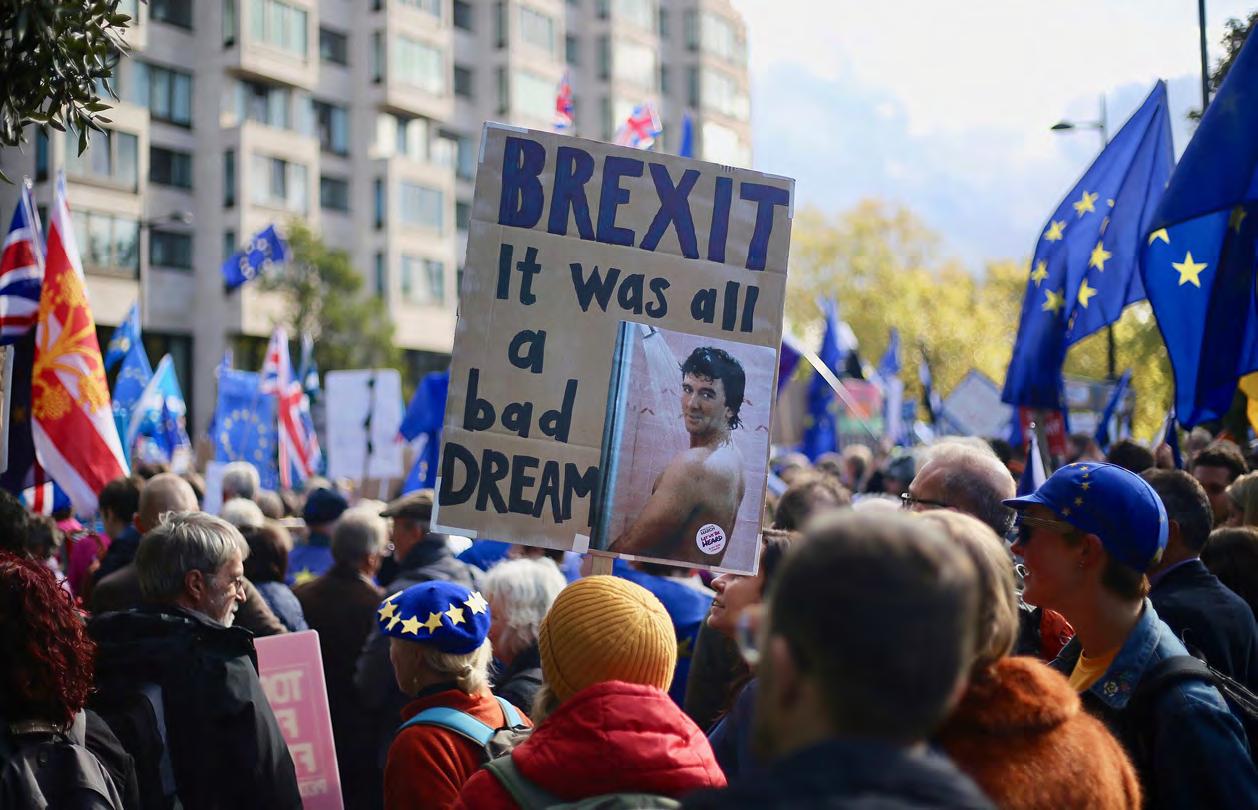
The elephant in the room
Britain’s two main parties are silent about
Brexit
as the country heads into a general election
Calum Taylor
It’s been almost eight years since the 2016 EU referendum. But for many young Brits, it’s still an unresolved issue.
Cecilia Jastrzembska, president of the Young European Movement, is trying to change this.
“We managed to get national coverage,” she says, describing her organisation’s recent campaign pushing for the UK to rejoin the EU-backed student exchange programme, Erasmus+.
“We worked with the British Council,” she explains, “who then made some recommendations to the European Commission, and then they, quite to our surprise, actually kind of accepted them. That was very exciting. We launched a petition
that got 40,000 signatures.”
Soon after, the EU proposed a youth mobility scheme with the UK. This would allow UK and EU citizens under 30 to live and work in either area without visas.
“Another civil war over membership of the EU is the last thing they want”
After all of this, however, the UK’s two main political parties gave the same response:
“They flatly shut it down,” says Jastrzembska with frustration.
A new generation of voters have come of age in the UK since 2016, having grown up in a period of British politics dominated by Brexit. The Conservatives won the 2019 general election with the slogan “Get Brexit Done” emblazoned across everything from posters to tractors.
However, in 2024 with a new election campaign underway, the B-word is barely uttered – at least not by the major political parties. A consequence of this muffled silence is that voters are unsure how their future government may handle UK-EU relations.
If current polling trends continue, the Labour Party will win power. But their
Wikimedia Commons People’s
Vote March, October 2019
14
rejection of the youth mobility scheme, and their lack of engagement on the topic of Brexit more generally, makes it hard to predict how they would approach it in government.
“It’s unsurprising to be honest,” Jastrzembska concedes. “No party in its right mind is going to put that [closer UK alignment to the EU] in its manifesto, right? No. Because obviously then the whole election would be fought on that, and it would cause so much disunity and division.”
Jonty Bloom, a journalist who has reported extensively on Europe, explains it another way: “Brexit is very boring to most of the voters who are fed up with hearing about it. They want to move on and another civil war over membership of the EU is the last thing they want. Fair enough.”
However, with the only parties likely to form a government shying away from the topic of Brexit, voters concerned about it (many of them young or first-time voters) are forced into a difficult position.
Annette Dittert, a senior German broadcaster based in the UK, is frustrated at how Labour and the UK media reacted to the youth mobility proposal.
“Labour are obviously far less ideologally bound to Brexit”
Her only advice to young people is to vote. “Apathy will not help your case. That is the biggest problem with young people. The apathy is immense and Labour does not inspire.”
For many, including Jastrzembska, Labour’s response to the youth mobility proposal highlights how little they wish to reopen Brexit discussions. The last time a general election was fought over Brexit, they lost 60 seats.
“I personally would rather they at
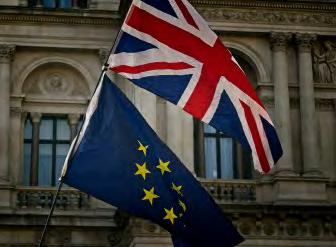
least entertain the idea [of the scheme],” Jastrzembska says. “But I do understand this as a strategic move rather than a complete dismissal.
“Of course, I’m not in Keir Starmer’s head, so I don’t know if he would be completely opposed to it. But from an external perspective, it wouldn’t make sense as a party that’s trying to get elected, especially after so long out of power.”
While Brexit is important for many young voters, it is not their only priority either.
“For young people,” Jastrzembska explains, “there’s a cost-of-living crisis in the UK. There’s a rental crisis and a housing crisis. There’s an energy crisis – there’s a lot of crises.”
She believes that Britain’s relationship with the EU will move up the agenda once young people have achieved career mobility and financial stability.
What is clear is that eight years on from the 2016 referendum, many first-time voters find themselves unable to use their vote to
voice their feelings about Brexit.
Bloom says that the current election campaign is forcing “the young and proEuropean majority in a bind, because neither party which might form a government is paying them any attention at all”.
“Their only solace is that Labour are obviously far less ideologically bound to Brexit, do not lie about it being a great success and have made it clear that they would do it better,” he continues. “Which makes them the far better option for pro-EU voters.”
It will be clear only after election day whether this strategy pays off.
Young pro-EU campaigners like Jastrzembska show few signs of giving up. Despite the current state of play, she remains hopeful. “Labour has said ‘We have no plans right now.’ That doesn’t mean there are no plans.
“If there is enough political appetite, which we [the Young European Movement] have demonstrated there is – because it’s a win-win – then there is a road to possible reintegration.”
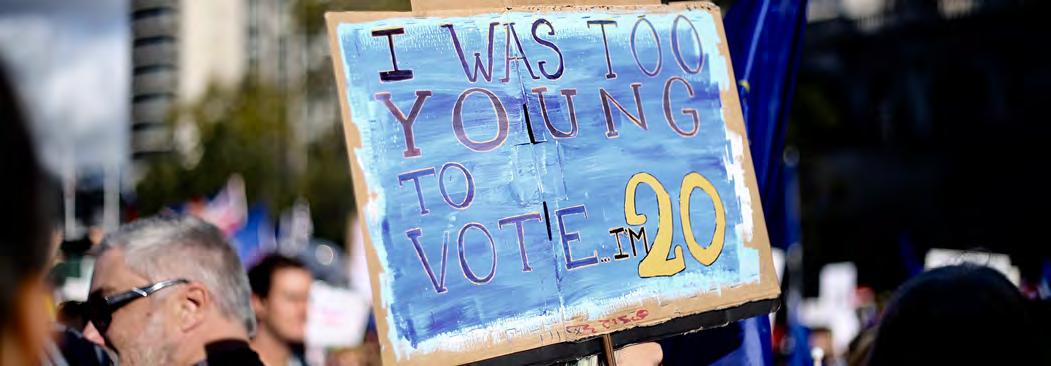
Gary Kmight Wikimedia Commons People’s Vote March, October 2019 CIVIC ACTION 15
Phoebe Plummer does not look like someone found guilty in a landmark anti-protest trial, as they scutter around, dishing out snacks, hugs, and cups of tea at the weekly Just Stop Oil vegan soup night.
“As a 22-year-old, I didn't really think I'd be preparing for my third time in prison,” they say. “But I know that fundamentally, the way in which I've acted is the morally right thing to be doing.”
The anti-capitalist was convicted in May alongside two other Just Stop Oil campaigners for delaying traffic during a slow march for the climate in November. The trio, due to be sentenced in July, could spend up to a year in prison.
“As a 22-year-old, I didn’t really think I’d be preparing for my third time in prison”
“I don't want to be away from the people I love,” Plummer says. Their partner, a fellow activist, likewise faces the prospect of a prison term. “It's a very weird relationship anxiety to have, [worrying that] we're constantly going to miss each other,” they say.
Like Plummer, thousands of young people
A summer
A new protest group for young people
Abdi Abdalla
across the world are turning away from electoral politics to direct action protesting movements like Just Stop Oil. According to the group’s own records, 2,039 people have taken action with the group, and 138 have spent time in jail. Just Stop Oil’s central demand is that the British government end all oil licensing and investment.
According to David Bailey, associate professor in politics at the University of Birmingham, this upsurge in extraparliamentary politics in Britain can be traced back to the 2010 student protests against a rise in university fees. In the context of “economic insecurity, ecological crisis, war, and a growing sense of hopelessness,” Bailey says it is “unsurprising that there is a heightened level of social dissent and protest".
Just Stop Oil is now part of the “Umbrella” coalition of different protest groups whose stated aim is to “bring about a revolution”. One fellow coalition member
is Youth Demand, a group that made headlines in April when its activists daubed the Ministry of Defence in red paint.
Their campaign has two demands of the UK government: ending all new oil and gas drilling, and an arms embargo on Israel.
At a recent talk for newcomers in King's Cross, Youth Demand organisers spoke to an audience of around 40 about the need for civil disobedience, ahead of a planned campaign of direct action in the summer.
As is made clear by the speakers, a willingness to get arrested is a key trait for anyone hoping to take action with the group. Youth Demand was inspired by the Children’s March in Alabama in 1963, when hundreds of Black schoolchildren were arrested whilst demonstrating for civil rights.
In late May, the group held a session at a hall in Waterloo, where the participants were introduced to the philosophy of nonviolence. These sessions are
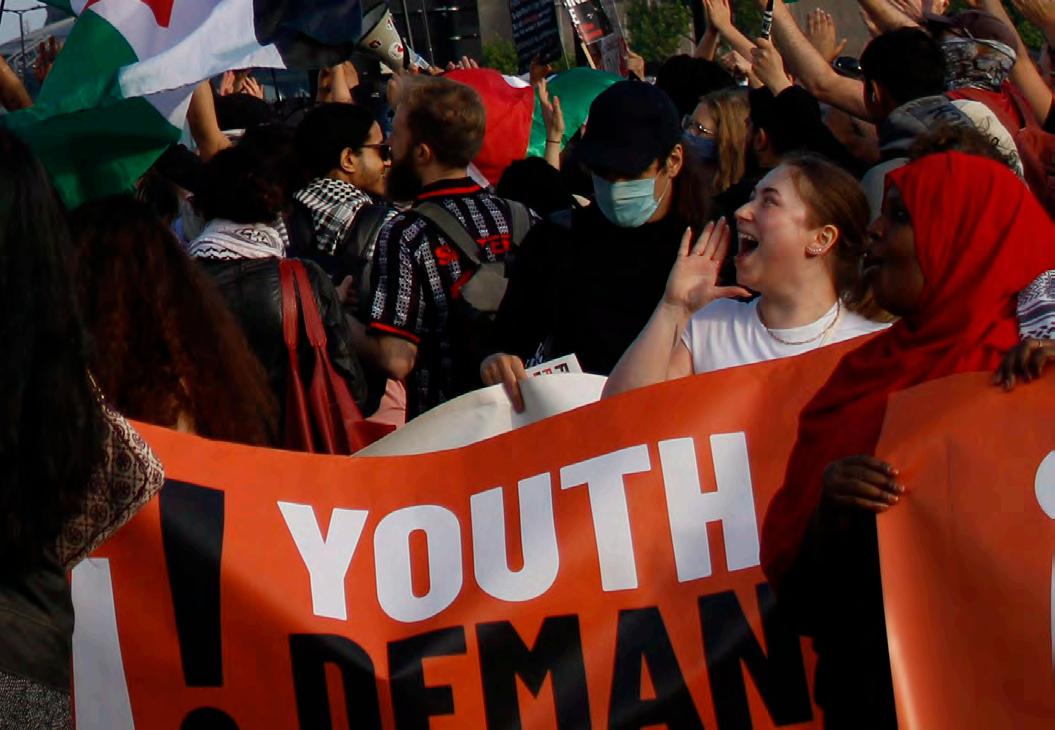
16
Youth Demand march on Waterloo Bridge
Abdi
Abdalla
plans a summer of mass disruption of protest
compulsory for those who sign up for arrestable actions. They are taken through a simulation of disruptive action on a busy road and taught how to de-escalate tense encounters.
One of the instructors made it clear that emergency vehicles must be allowed through blockades, and cites a Freedom of Information request disproving the accusation that Just Stop Oil has obstructed ambulances – a charge levelled at the group by critics.
Youth Demand’s politics - like Just Stop Oil’s - are decidedly international. Speakers at both groups’ weekly meetings paint a picture of a world divided into a privileged north and an exploited south, where billions face a “structural genocide” caused by the north’s fossil-fuelled mode of living.
When the wave of student rebellions in support of Gaza arrived from the United States in early May, students at University College London were among the first to occupy their campuses. Two days after the first tents were erected, Youth Demand cofounder Sam Holland spoke to the crowd gathered at the gates, pledging to shut down the capital city in solidarity with Palestine.
“The endgame is causing mass material disruption”
Horrified at the scale of the climate crisis, the 22-year-old Bristolian quit university in November 2022 to dedicate his time to activism. He has subsequently been arrested multiple times with Just Stop Oil. “There are more important things than career or income,” he says.
Holland acknowledges that governments “don’t care about symbolic action” like throwing soup at paintings – a tactic used by climate groups to gain public attention.
“The endgame is causing mass material disruption,” he says. This involves “blocking the roads, blocking infrastructure, train stations, airports– strikes and general strikes.”
Holland accepts that fear deters some young people from direct action. But he insists that “if you want to change regimes, if you want to change policy, you have to get arrested. You have to break the law. You have to cause disruption.”
 Abdi
Abdalla
Police watch as protestors occupy Waterloo Bridge
Abdi
Abdalla
Police watch as protestors occupy Waterloo Bridge
CIVIC ACTION 17
Young, bold and breaking the mold
Youthful British politicians face significant challenges due to their age
Dom Plaskota
Starting out in politics at the tender age of 18 has been a baptism of fire for Liberal Democrat councillor Tom Penketh.
Penketh, a funeral director, felt that he could represent his community well after he won a seat on Shaw and Crompton Parish Council, near Manchester, last year. It wasn’t his first venture into politics. By the time he was sitting his A-Level exams and campaigning for elections, the buoyant, mop-haired youngster had already been a member of the Liberal Democrat Party for two years.
His natural optimism, however, has been tempered by his experience in his first year as an elected representative. Other councillors sometimes speak down to him and ignore what he says. When people do listen, he feels that he faces more intense scrutiny, simply because of his age.
“I had to work a lot harder and be more impressive than others”
“Opposition’s healthy,” he says. “You’re going to have disagreements. You’re not going to want the same thing or to get it done the same way. But then it gets personal.”
While some people prefer their politicians to have had plenty of life experience, the current impasse in the US, with two unpopular elderly candidates battling to be president, shows that there is a limit.
As one of the UK’s youngest councillors, Penketh is one of the country’s few young politicians. Just 3 per cent of MPs elected in the last general election in 2019 were aged between 18 to 29, even though young adults make up almost a fifth of the UK’s population.
This lack of representation contributes to low turnout among young voters, Penketh claims. At the last general election, the
18-24 and 25-34 voting groups had almost 25 per cent lower turnout than voters aged 65 and over.
Penketh also thinks young people are deterred from going into politics after seeing how young politicians are mistreated. Mhairi Black, who was the youngest MP when she was elected at 20 in 2015, has blamed Westminster’s toxic environment for her decision not to stand in the upcoming general election, although some suggest she stepped aside because of the high likelihood she could lose her seat.
Young politicians are also less likely to be financially independent than their older colleagues, so they feel the financial burdens of a political career more acutely. While MPs are paid £91,346 annually, councillors receive limited compensation.
According to the Local Government Association, the average councillor spends 22 hours a week on council business and receives around £7,000 a year.
Ria Patel, a 22-year-old Green Party Councillor from Croydon Council, finds this difficult, even as someone from a middle-class background.
“I’m quite lucky that I was able to move back home. I live with my mum, so I don’t currently have to pay rent,” they say, chuckling. “I would love to move back out, but that’s a work in progress.”
Even when young politicians progress they encounter obstacles, says Emma Roddick, a Member of Scottish Parliament (MSP) for the Scottish Nationalist Party.
Roddick was a councillor from 2019 before she was elected as MSP for the Highlands and Islands region at 23, making her the youngest MSP at that time. Two years later, she was appointed Minister for Equalities, Migration and Refugees, where she remained until last month when the First Minister’s resignation triggered a reshuffle.
“I had to work a lot harder and be more impressive than
others straight away just to be considered competent,” she says.
Despite her rapid climb, her colleagues still talk over her and answer for her, she claims.
“They seem to think they’re doing me a favour. It gets very annoying!”
Roddick also feels pressure to constantly address youth issues. While it is something that she is passionate about, it leaves less time to represent young people in other policy debates, including on housing.
“Yes, it’s great to platform young voices as young voices, but make sure they still have the time to attend their work and prepare to be around the boardroom table with their professional peers and feed into all these other discussions.”
Penketh says that despite these challenges, he’s glad to be a politician. His excitement is palpable.
“I want to do it more than ever,” he says. “When I get on to the Borough Council, I’ll have a louder voice for a bigger area. Maybe I’ll even be an MP one day.”
 Courtesy of Tom Penketh
Courtesy of Tom Penketh
18
Tom Penketh, young councillor
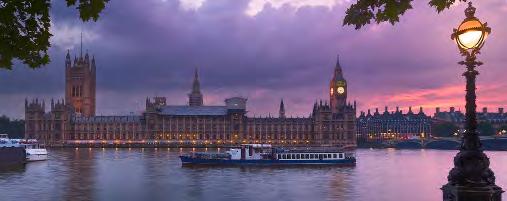
An end to the two-horse race?
How proportional representation could get more voters to the polls
Lilian Crastan
Ella Eagle Davis, 22, is unimpressed by the recent direction of UK politics.
“Watching it devolve into something which I think is the furthest away from representing me or my interests was really disheartening,” she says.
With a general election called for 4 July, she felt unrepresented by all of the parties that stood a chance of holding office. “It scared me, and it angered me and I thought, okay, right, I need to do something about this.” She became a volunteer researcher for Make Votes Matter, an organisation that advocates for replacing the UK’s first-past-the-post (FPTP) electoral system with proportional representation (PR).
Because of the way FPTP advantages larger parties, British politics has been dominated by the Conservative and Labour parties for the past century. Under FPTP, the candidate who wins the most votes in a constituency is awarded the seat, irrespective of whether they achieve a majority. This tends to
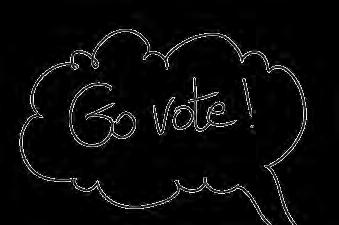
penalise smaller parties, often resulting in a distribution of seats in Parliament that does not necessarily reflect the national vote share.
Robert Johns, professor of politics at the University of Southampton, thinks the current electoral system does not accurately represent the country’s preferences. “It did a pretty good job about 60 years ago,” he says.
According to a 2022 study by the National Centre for Social Research, Britons’ support for electoral reform has grown. 51 per cent now favour introducing PR for elections to the House of Commons, which would fundamentally change how votes translate into seats in Parliament. Under PR, seats are allocated based on the percentage of votes each party receives, more accurately reflecting the vote share.
According to a 2019 YouGov survey, nearly 40 per cent of people aged 18 to 24 believe their vote does not significantly impact the general election results. Other polling has shown that in 2019, voter turnout ranged from 47 per cent among 18- to 24-year-olds to 74 per cent among those over 65.
Johns attributes the higher turnout of the older generation to a sense of duty that is lacking in younger voters. When deciding whether to vote, according to Johns, young people are more likely to ask themselves questions, such as “‘how likely is my vote to make a difference?’ We know that when they
answer that question about first-past-the-post, they’d give a more negative response.”
If the youngest don’t feel represented by the parties that are likely to win the elections under FPTP, they might decide not to vote at all, as Eagle explains:
“Young people are looking to what should be role models for them. And they see [politicians] don’t speak like them, they don’t act like them. They don’t have any sort of life experiences that resonate with them and so what’s the point in voting, when those are the sort of people that are going to get in?”
“It angered me and I thought, okay, right, I need to do something about this”
It may however be a while before the UK changes its electoral system. As Johns points out, “political culture takes a long time to change”.
But both Johns and Eagle think PR could make the Parliament more representative and Britons more eager to go to the ballot.
“Under PR,” explains Eagle, “you will have a system in which compromise takes centre stage, which will work to find a solution for the people that are represented by it, which hopefully under proportional representation is the majority.”
Yong
Yaopey
CIVIC ACTION 19
UK Parliament
Votes for kids
How giving children the vote could
reinvigorate democracy
Eliana Nunes
Until recently, there was a myth that young people were apathetic,” says Daniel Meister, communications manager at The National Youth Council of Ireland (NYCI), “[but] the independence referendum in Scotland and the marriage equality referendum in Ireland scotched that”.
This June, Belgian and German 16- and 17-year-olds cast their ballots in the European parliamentary elections for the first time, joining Austrian, Scottish, and Maltese teens. But whilst campaigns advocating for a lower voting age have been gaining momentum since the 1990s, 16-year-olds in 22 EU member states, including Ireland, still lack voting rights.
“People start their lives out being given the idea that their voices count”
In 2022, a bill to lower the voting age in Ireland failed to make it past the country’s senate. Meister points out that had it been passed, around 130,000 Irish 16- and 17-yearolds would have been able to participate in this year’s European elections. “This was a missed opportunity to strengthen Irish democracy,” he says.
Campaigners argue that lowering the voting age could help shore up support for the idea of democracy. Polls, including a recent Ipsos KnowledgePanel survey, consistently show that support for democracy across European countries is at an all-time low.
DO KIDS WANT TO BE COUNTED IN?
“Secondary school kids deserve to be taken more seriously by society,” says Eva, a 12-yearold from Greece. “Plus, being able to vote about the causes we care deeply about would teach us the importance of actively participating in our communities.”
Eva is especially keen to vote for Greece’s next prime minister but will miss the chance in the 2027 national elections, as Greece’s minimum voting age is 17. She will likely vote for the first time in the 2029 European elections, when

she will be 19.
Yet by 2029, national and international policies impacting Eva’s future will have already been determined by decision-makers significantly older than her. Greece stands out as having one of Europe’s largest ageing populations: over-65s make up 23 per cent of the population, according to a recent Eurostat report.
Athena, 13, takes a more cautious stance than Eva. “Since voting is a huge responsibility, 15 should be the minimum age to be able to vote,” she says, concerned that younger children are
“too easily influenced by parents and teachers”.
COUNT KIDS IN
Advocates for lowering the voting age to 16, including Meister from the NYCI, say that doing so is a matter of consistency. In most EU member states, 16-year-olds are given the responsibilities of entering the workforce, paying taxes, and leaving school, so their inclusion in political life makes sense.
But whilst some European countries are considering giving 16-year-olds the vote, some
20
Kids playing in the park
Eliana Nunes
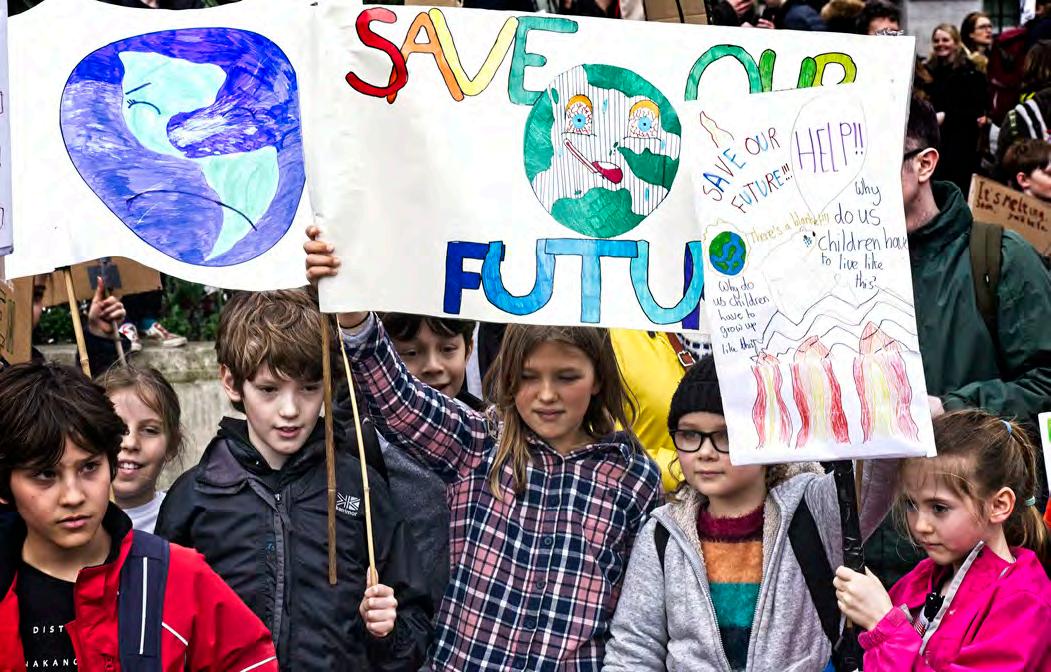
want to go even further: extending voting rights to young teens, children, and even babies.
For Professor John Wall, a childhood studies scholar at Rutgers University Camden and author of Give Children the Vote: On Democratizing Democracy, it makes the most sense for voting to be an ageless birth-right.
“People would start their lives out being given the idea that their voices count whoever they are,” Wall argues.
“At the moment, we tell people for the first quarter of their lives that their voices don’t count, that they’re not capable of exercising decision-making,” he says, explaining that under 18s, who amount to around one quarter of the global population, are the largest disenfranchised group in the world.
In the absence of surveys asking kids what they think about voting – an irony not lost on Wall – there is some evidence to suggest that 16- and 17-year-olds are enthusiastic voters when given the chance.
In Austria, where the voting age has been 16 since 2007, national electoral lists consistently indicate a higher voter turnout among 16- and 17-year-olds than among 18- and 21-year-olds.
Broadening the franchise would revive democracy, Wall believes.
“Voting always changes whenever a new group gains the franchise. It looked very different when it was only white or landowning men who had the vote,” he says.
Europe’s children might prioritise voting on environmental and social justice issues, much
like child activists and young adult Europeans. In a recent survey by the European Council on Foreign Relations (ECFR), European under29s named the climate crisis as their biggest concern, whereas older generations said they were more concerned about immigration.
LEAVE KIDS OUT OF IT
While the idea of 16-year-olds voting may be controversial, it’s hardly radical. But many might find the idea of young kids having a say in politics ludicrous. Images of a two-year-old scribbling on a ballot card spring to mind.
To address these challenges, Wall proposes a proxy voting system where parents or guardians cast votes on behalf of young children and babies. Meanwhile, Cambridge University politics professor David Runciman suggests the age of six as a tentative threshold.
But Tatiana Gorney, a child psychologist for almost two decades, is adamant that children under 16 are not equipped with the competence and life experiences needed for voting.
“To participate in voting processes, I believe a person needs to have a level of cognitive and emotional development,” Gorney argues.
“Governments should be obliged to include children’s opinions in their policies, but this does not mean children should vote,” she says. “Children under 16 have not yet developed mature ‘hot cognition’; reasoning that is emotionally
regulated. This means that their decisions may be influenced by peer pressure.”
Wall has heard such arguments countless times. Sighing, he reiterates that as adult voters, we are not tested for competence and that, in this post-truth era, we are often swayed by emotions rather than thorough political analysis.
The rise of authoritarianism is a threat to the EU: in the run-up to elections, EU campaigning stressed younger generations’ responsibility to vote “to protect democracy”.
For youth suffrage campaigners, lowering the voting age – whether to 16 or 0 – could be the solution.

CIVIC ACTION 21
Belga
Global Climate Strike, 2019 Gary Knight
Courtesy of Professor John
An election in the fog of war
How the Israel-Hamas war will sway Muslim and Jewish voters this July
Justine Noble
Sumaya, a 26-year old technology sector employee, has always voted Labour. At the forthcoming general election next month, however, she might abstain for the first time, because of the party’s attitude towards the war in Gaza.
For Sumaya, things changed after the October 7 Hamas attack when Labour leader Keir Starmer repeatedly stated that Israel has the right to defend itself regarding its military operations in the Gaza Strip. Since then, she believes the party hasn’t done nearly enough to hold Israel accountable for the suffering it has inflicted on Palestinian civilians over the past seven months. Her views, she says, are far from unique in her Muslim community in west London.
“I think the Labour party has completely alienated its Muslim voters,” she says.
According to national polls, the key issues in the UK’s general election are the economy, immigration, and the struggling National
Health Service. For many British Muslims and Jews, though, the way Labour and the Conservatives have responded to the ongoing Israel-Hamas war will ultimately dictate for whom they decide to vote.
In February, a poll by Survation and the Labour Muslim Network found that 86 per cent of Muslims voters backed Labour in the previous election. Only 43 per cent said they would vote for them again, and 23 per cent were undecided.
This drop in Muslim support for Labour has swung recent electoral outcomes. In Rochdale, a historically Labour-leaning town where about 30 per cent of inhabitants are Muslim, George Galloway from the British Workers’ Party won a by-election held in February.
The campaign of the divisive politician was dominated by a strong pro-Palestine stance and unsparing criticism of Labour’s position on Gaza. Two weeks prior to the election, when Labour proposed an amendment to a motion

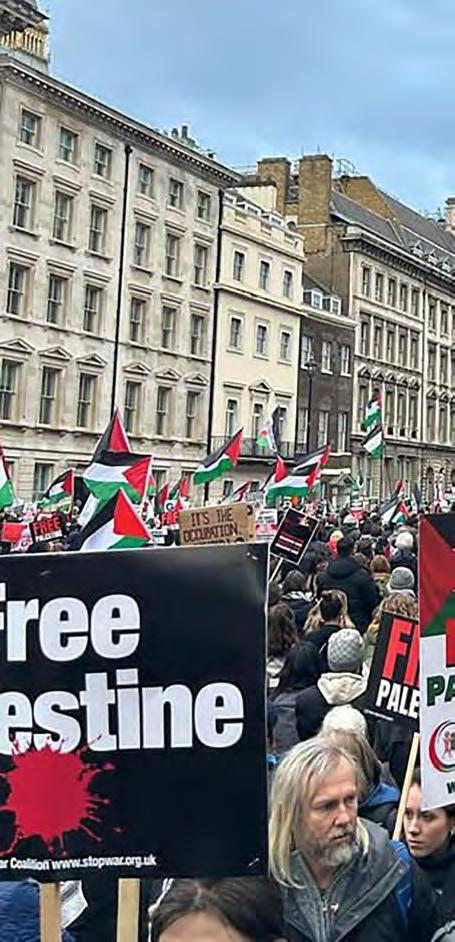
calling for an immediate ceasefire, Galloway remarked that the names of the party’s MPs were “dripping in blood”.
In neighbouring Oldham, where around 24 per cent of people are Muslim, Labour lost control of the council in the May local elections after ceding six seats to independents. While local Labour leader Arooj Shah denied that Starmer’s position on the crisis in Gaza was to blame, the party’s national campaign coordinator acknowledged that the party’s response to the war was “a factor”.
Ahead of the general election, campaign group The Muslim Vote is urging Muslims to keep Gaza in mind, especially in constituencies where they could shake up results, such as Bethnal Green and Bow, Birmingham Ladywood, and Leicester South. They are set to release a list of candidates they endorse on foreign policy, the NHS, and education.
According to Dr Andrew Barclay, a research associate in the Department of Social Policy at the University of Oxford, the political relevance
22
Wikimedia Commons

of overseas conflicts to British Muslims is nothing new.
“The Labour party has completely alienated its Muslim voters”
“The only real sort of wavering that we’ve seen historically in Muslim support for the Labour party was related to foreign policy,” he says. “So following the Iraq War, and following the war in Afghanistan, there was a fairly measurable dip in how well candidates did in constituencies with large Muslim populations, but that seemed to revert back to tide pretty quickly after that, as recently as 2010.”
Dr Barclay believes this pattern is probably due to “a feeling that major political parties
Pro-Palestine protest in London, 2024
and the British government are happy to not support Muslims around the world”.
The support for Labour is not waning only in the Muslim community, but in the Jewish diaspora too.
For 22-year-old Hannah Silverman from Elstree in Hertfordshire, where around 36 per cent of residents share her Jewish identity, circumstances at home are influencing how she’s planning to vote.
In 2023, the Community Security Trust, a charity that offers security advice to the UK’s Jewish Community, documented a record number of antisemitic incidents, up 147 per cent from the year before. Approximately twothirds of the total occurred after the Hamas-led attack on Israel on 7 October.
In October 2020, a report by the Equality and Human Rights Commission (EHRC) concluded that Labour was responsible for “unlawful” acts of discrimination over antisemitism under Jeremy Corbyn’s leadership. The watchdog highlighted three

violations of the Equality Act: political interference in antisemitism complaints, failure to provide sufficient training to those handling these complaints, and harassment.
While Silverman has been wary of the Labour party’s reputation for antisemitism since the EHRC’s report, rising anti-Jewish hate since 7 October has made voting for the party a no-go:
“As a person who’s more left-leaning, I won’t be voting Labour sadly because I just can’t for my own safety.”
Silverman isn’t alone. Dr Barclay explains that “evidence suggests that most British Jews feel levels of this kind of threat of hostility from the political left, whereas previously they probably would have felt it more from the political right”.
“You do see big spikes in domestic antisemitism [against] some Jewish diaspora whenever Israel is involved in some sort of conflict, so it raises this salience of antisemitism in Britain whenever these things happen,” he adds.
However, how Muslim and Jewish communities relate the Israel-Hamas war to domestic politics is not clear-cut. A decline in support for the Tories in Silverman’s home borough of Hertsmere in the May 2023 local elections indicated that Starmer’s pledges to eradicate antisemitism in his party may have struck a chord with Jewish voters.
“I won’t be voting Labour sadly because I just can’t for my own safety”
Haris, a 22-year-old software engineer from Small Heath; an overwhelmingly Muslim area of Birmingham, is also unconvinced that Labour has fully lost its Muslim support base:
“They know what’s on the other side, and they know the other people that probably win are the Tories, and they don’t want a Tory government.”
Courtesy of Sumaya
Pro-Palestine graffiti
CIVIC ACTION 23
Courtesy of Sumaya
People vs power
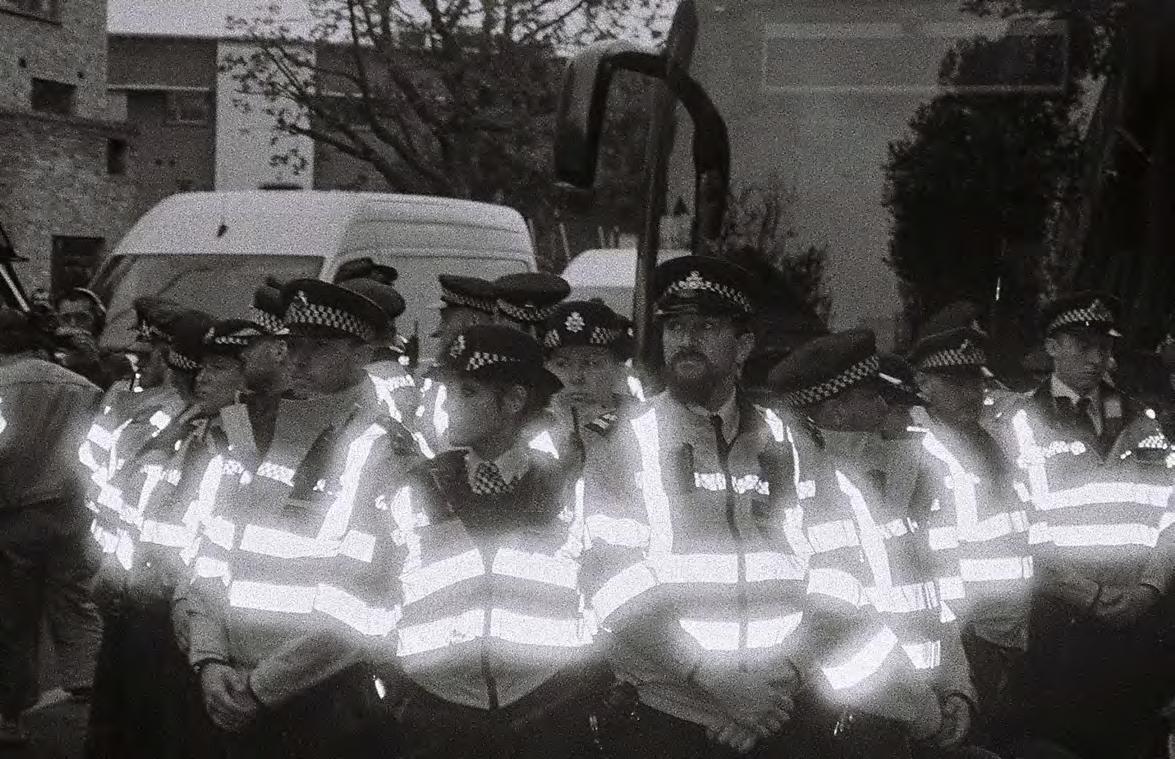
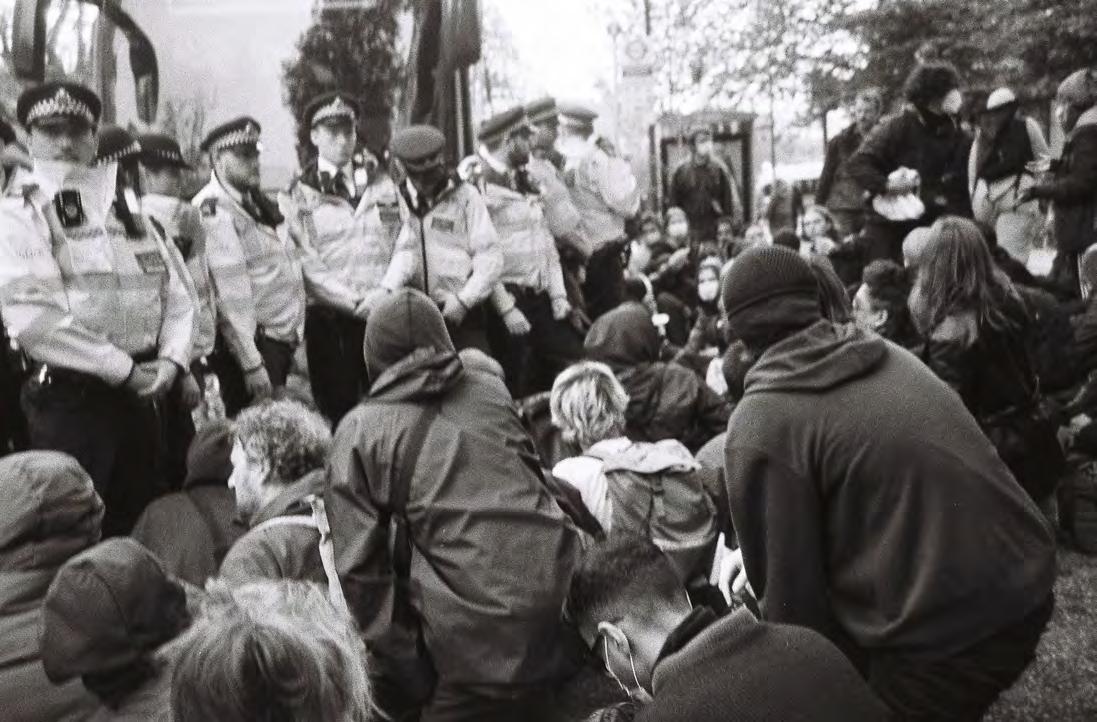
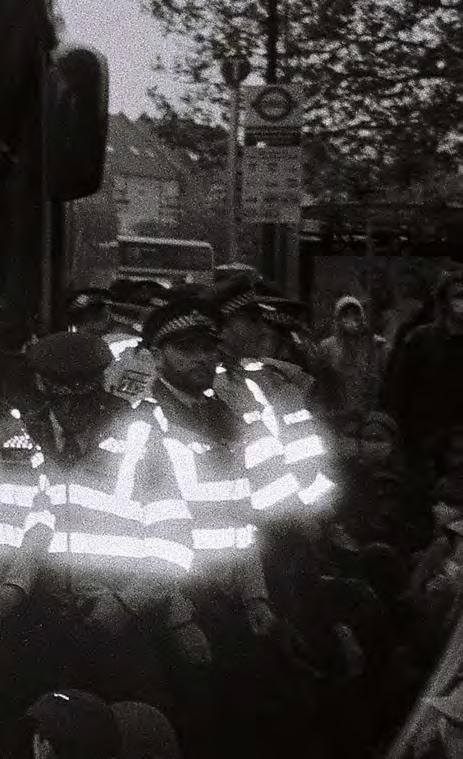

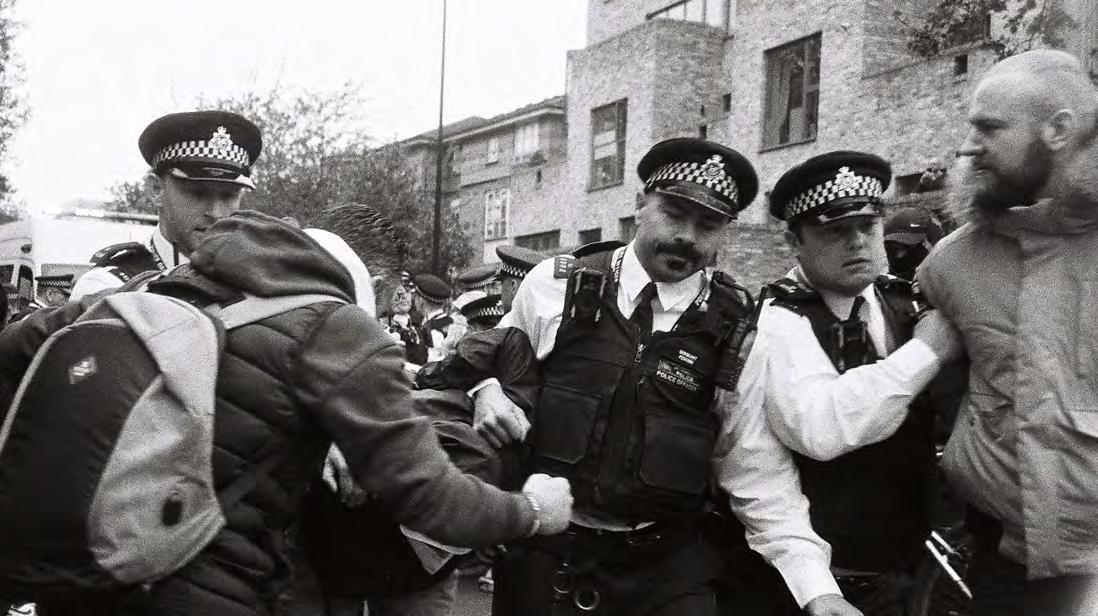
Jamie Onslow
29 25
Protesters in Peckham, south London blocked a coach that was attempting to transfer asylum seekers to the Bibby Stockholm barge, Dorset on 2 May. They clashed with the police, with 45 arrested. The protest came as the Home Office prepared to deport 5,700 asylum seekers to Rwanda this year.






International
At anti-abortion protests in the US, protestors brandish placards with slogans like “As a former foetus, I oppose abortion,” “Equally human = born and preborn” and “I vote pro-life first”. As emotive expressions of deeply-rooted opinions, these calls to action show that abortion is one of the key issues ahead of the presidential election in November.
In 2022 the US Supreme Court overturned Roe v. Wade, ending the constitutional right to abortion. Following the decision, 21 out of America’s 50 states have banned or restricted abortion before the 12-week standard set by the landmark 1973 case.
Nevertheless, polling shows that support for increased access to abortion has broadly increased in recent years – to the disappointment of Michel Dykstra, a prolife advocate and volunteer at PRC Grand Rapids, a clinic for unplanned pregnancy support in Michigan.
“Abortion does concern someone. He/she just doesn’t have a voice yet”
“It’s deeply sad, actually. We have become self-centred: ‘I do what I want, and it doesn’t concern you.’ But abortion does concern someone else. He or she just doesn’t have a voice yet,” says Dyktsra.
Claire McKinney, an assistant professor at the College of William & Mary who studies the politics of reproduction, sees a pragmatic reason for the switch in public opinion following the overturning of Roe v. Wade in 2022.
She explains that since the ruling and subsequent abortion bans, even women who weren’t pregnant have been unable to access certain medicine that could create foetal harm, leading some to rethink their support for anti-abortion laws.
As this support wanes, pro-life advocates are looking to America’s history for assistance.
They have called on the federal government to fully implement the Comstock
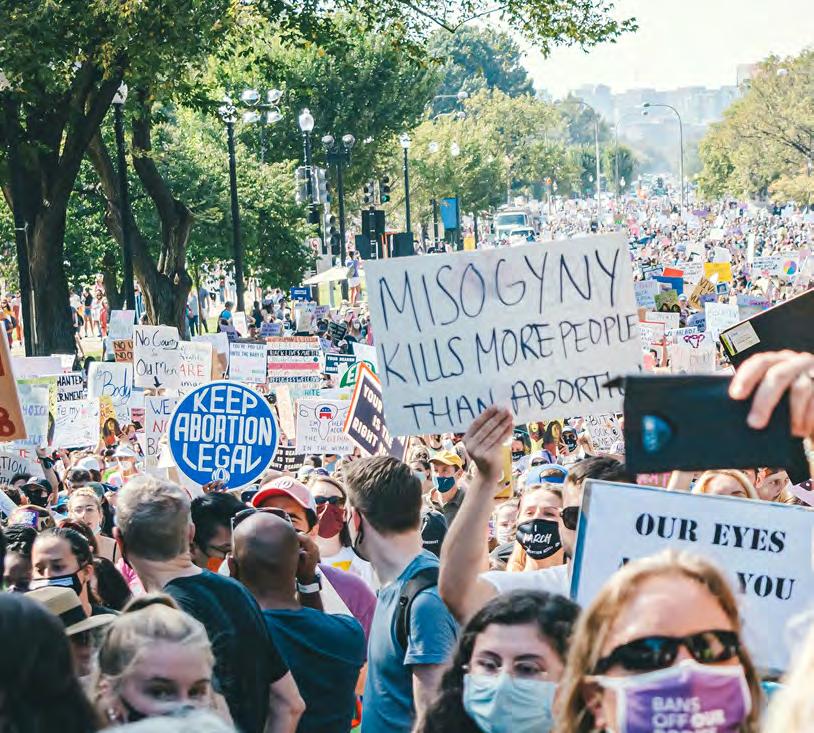
How abortion is shaping Bodies on
Lara Lovric
Act, an 1873 law that whilst still on the statute books, is not enforced by authorities. The act prohibits sending or receiving any materials designed for “the prevention of conception or procuring of abortion”. If enforced, it would sharply restrict access to abortion nationally.
“If you really believe that abortion is murder, then if there was a good law on the books, you bring it back. It’s a kind of moral absolutism where it just overrides
all other considerations,” says Paul Goren, a professor of political science at the University of Minnesota.
In response, pro-choice Democrat activists are gathering signatures to ensure that their party’s nominees have pledged to protect abortion rights. Activists have also managed to get abortion rights put on election ballots in several states. In Florida, for example, voters will decide whether the

Women protesting for women’s health protection act 28
Manny Becerra

the ballot
the US election
right to abortion should be enshrined in the state constitution.
In the 2022 midterm elections, that seemed to work. Abortion turned out to be an important voting motivator and an effective blocker of the forecasted “red wave” in which Republicans were set to gain a significant number of seats.
“It’s a moral absolutism where it overrides all other considerations”
According to KFF’s midterm exit polls analysis, 38 per cent of voters said that the overturning of Roe v. Wade had a major impact on their decision to vote in the midterms, while 47 per cent said that it had a major impact on which candidates
they supported.
This election season, the Democrats will be playing the pro-choice card heavily.
“They know they can [appeal] to the liberals who think conservatives are trying to take away a woman’s rights over her own body,” says Dykstra.
The Republicans will have to be more tactical about how they frame an issue that has become a liability. Even though legal access to abortion is not a priority for the electorate, as it falls behind concerns about economy, healthcare, illegal immigration, and gun violence, it could cost the Republican Party votes.
“When Trump is signalling that he might be open to reviving laws like the Comstock Act, that’s a wink to his base that he’s on the side of the religious right. If he makes that a prominent part of his general election campaign, he’s going to face a lot of pushback,” concludes Goren.
The two candidates in the election will likely take different approaches to abortion rights if elected.
“If Biden is re-elected, he’ll do everything within his power to make sure that the government is rhetorically committed to increasing access to reproductive technologies for women,” says Goren.
The right approach for Donald Trump, on the other hand, is less clear. Although he declared himself “the most pro-life president” and has boasted of playing a central role in the overturning of Roe v. Wade, he has been downplaying the divisiveness of the issue of abortion in his campaign and will likely keep diverting attention to other matters.
“I can see [Trump and the Republicans] saying: ‘Well, the Supreme Court decided and it’s up to the states, let’s now change the subject to immigration or some other issue on which most of us agree,’” Goren chuckles.
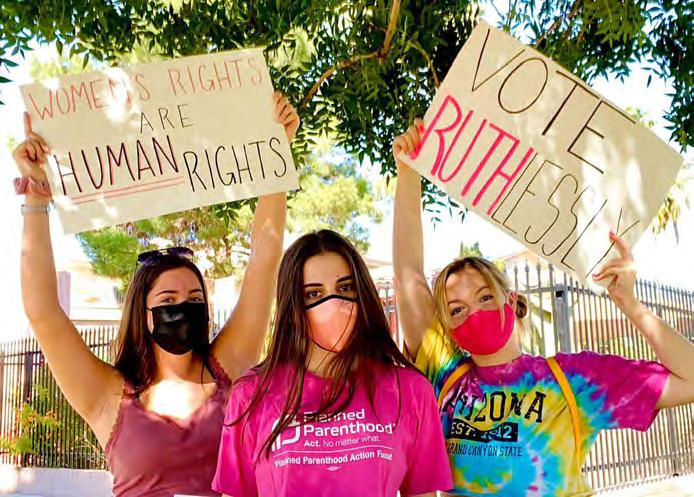
INTERNATIONAL 29
Gayatri Malhotra
Women’s March for Abortion Rights in Arizona, USA
Women’s March for Abortion Rights in Washington D.C.
Aubrey Thrower
Queer Texans and the race to the White House
Despite increasingly restrictive state legislation, changing demographics inspire hope
Cahal McAuley
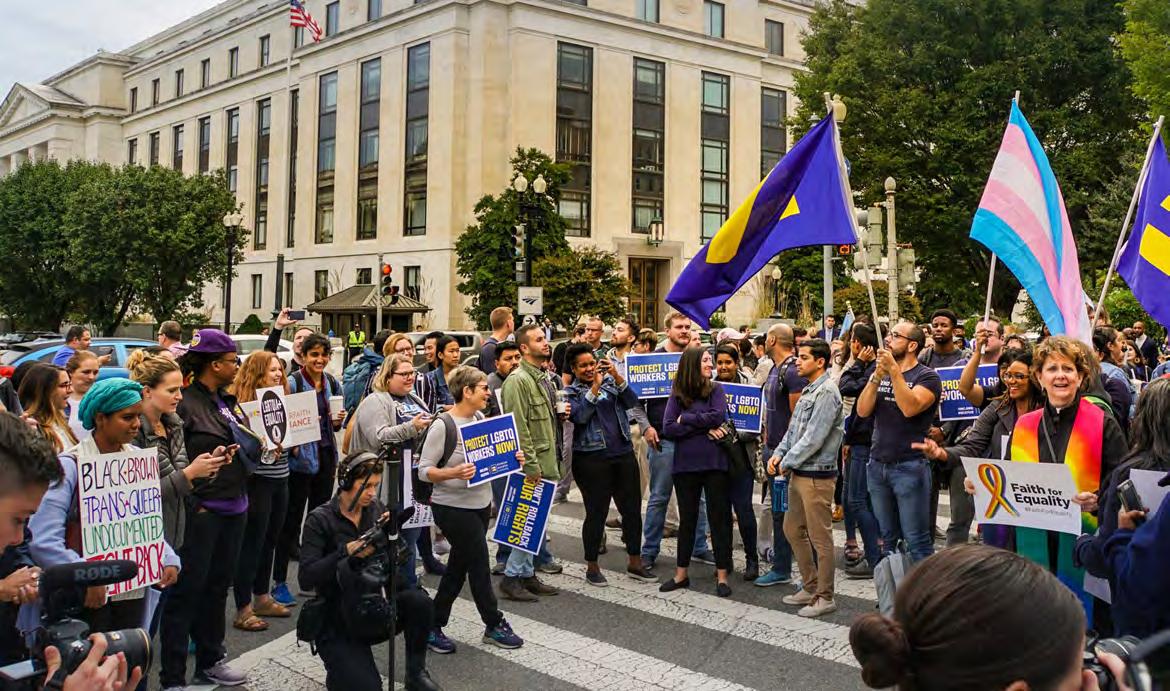
The race for the presidency between Joe Biden and Donald Trump is the rematch that few Americans wished to see.
Their combined age of 158-years-old and a slide towards gerontocracy in the United States has left many young voters disillusioned, but perhaps none more so than queer and trans youth in Republican-led states like Texas. These individuals have seen a huge increase in laws targeting their rights at state level, despite the
fact that a Democrat sits in the Oval Office.
“Regardless of who wins, people will always have something to say about trans people because our identities are constantly politicised,” said Rowan Hawke, a trans man from Houston, Texas.
The frustrations of Hawke, sitting with a pride flag hung behind him, are shared by many queer and trans Texans following the adjournment of the 88th state legislature which
passed a raft of LGBTQIA+ laws last year.
“As much as Texas wants to pretend that queer and trans kids don’t exist, they do,” he says.
“When you have bills that are specifically targeting disenfranchised groups of people, particularly the youth who already don’t have a lot of legal autonomy, [those people are] being shown by the government that they’re not welcome,” he adds.
Protestors outside the US Supreme Court
30
Ted Eytan


New laws passed included a ban on trans athletes joining college athletic teams, a ban on drag performances (later rescinded) and – most controversially of all – a law restricting the availability of genderaffirming care to trans minors.
This wave of targeted legislation is mirrored by 24 other Republican-led states who have passed legislation similar to the Texan law blocking trans children’s access to care.
Gender-affirming care is supported by most major medical associations, such as the American Academy of Pediatrics and American Medical Association. The care can be lifesaving to minors who are experiencing gender dysphoria.
Members of the LGBTQIA+ community would understandably be wary of the return of former President Donald Trump to the White House, but the increase in antiqueer and trans legislation in red states has happened under the watch of President Biden.
President Biden has cast doubt in his four-year tenure on whether advocating for trans people in conservative states is a priority, leaving many LGBTQIA+ people between a rock and hard place when they cast their ballot on 5 November.
“President Biden has done nothing in the past four years to prove that he cares about queer and trans people. He didn’t do anything to oppose these bills even though he has the power to in certain circumstances [using] federal protections,” said Hawke.
“[Yet] the thing that worries me most if Trump does become President again is the fact that his supporters will become more empowered with the vitriol he’s able to stir up,” he concluded.
Despite this bleak situation, change may be on the way as the number of voters openly identifying as LGBTQIA+ rapidly increases.
According to a Human Rights Campaign survey, LGBTQIA+ voters are expected to make up around 20 per cent of all eligible national voters by 2040 and Texas is on track to exceed this rate of growth as it has the second largest queer population in the country, after California.
Atlas Mars, a drag performer based in Austin, Texas, has witnessed the frustration with the presidential choices: “People are upset all around, wishing there was a third option, I think that’s really where most people are at.”
But Mars says they have simultaneously seen the growth in resistance to attempts to restrict the rights of queer people in Texas: “Queer people aren’t alone, there are queer people in families, there’s a lot of allies and so there’s just in general a lot of people that are unhappy. There’s been protests at the [Texas] Capitol. Every time something big happens, the community comes out in huge numbers with a lot of outside support.”
“People are upset all around, wishing there was a third option”
Gen Z have become comfortable with identifying as LGBTQIA+ in numbers never seen before, and this is sure to prompt a seismic shift in national and state voting patterns in the coming years.
In the Human Rights Campaign survey, 27 per cent of Gen Z voters identified as LGBTQIA+ compared to just 4.5 per cent of baby boomers, illustrating the stark generational divide with the majority of lawmakers who are part of the post-war baby boom.
Conservative-led states don’t show any
signs of backing down soon and things may get worse before they get better for queer and trans Americans, but these statistics still inspire hope for Ash Hall, policy and advocacy strategist for LGBTQIA+ Equality at the Texas branch of the American Civil Liberties Union.
“Hope is a discipline,” Hall adds. “There’s a lot of reasons for us to turn out and vote at this point. Both to protest for ourselves and protect the people we care about. So when you combine that sort of motivation with the kind of [voting] numbers we’re predicting down the line, I think that’s a really good reason to have hope.”
 LGBTQIA+ flag near the University of Texas, Austin
LGBTQIA+ flag near the University of Texas, Austin
31 Cahal McAuley
Cahal McAuley INTERNATIONAL
View from the roof of Texas State Capitol
To vote or not to vote?
Republicans and Democrats battle to win the US election overseas
Mia Jeronimus
Republicans Overseas chair Greg Swenson does not shy away from hyperbole when comparing his group to its left-leaning counterpart, Democrats Abroad.
“Both focus on the elections,” he concedes, “but we do events for the 4th of July, Veterans Day, D-Day – you know, we do stuff that’s pro-American with a little military flavour. Their events are like Pride Month, LGBT Diversity Week. It’s right out of the stereotype.”
Whether his statement is exaggerated or not, Swenson is right to stress the difference between the organisations representing the US two-party system to citizens residing overseas. Democrats Abroad enjoys the same funding and benefits as the Democratic National Committee’s 50 state and 6 territory parties; whereas Republicans Overseas functions as a political action committee, or PAC in American terms. It is essentially a glorified social club, part of the Republican Party’s apparatus only in name.
But Margo Miller, London-based ex-chair of Democrats Abroad and founder of the non-partisan votefromabroad.org, explains that the most important difference lies in what these two groups want: “Republicans Overseas is not interested in getting Americans to vote. They know full well that the more expats you get registered to vote, the likelihood is they’ll vote Democrat. We win elections by getting up the vote, they win elections by suppressing it.”
Swenson agrees. “My instinct is that the majority of Americans abroad would not vote Republican,” he admits. Most American professionals tend to vote Democrat, and those that live abroad tend to be professionals. Indeed many regular attendees of Republican Overseas events are not Americans but Europeans with an appetite for conservatism.
“If I was being really cynical, I would want a depressed turnout in the UK,” he adds. Miller says that expats tend to lean Democrat because “the entire mainstream political establishment in [the UK] would be firmly on the Democrat side of the American one. Labour, Lib Dem and Conservative all have policies that align with the Democrats.”
She cites the NHS as an example.
According to Miller, there’s a second reason too. Americans abroad have watched firsthand how quickly an authoritarian regime can take hold, and are subsequently more wary of democratic backsliding under Trump.
“Democrats Abroad are very active in Hungary,” she explains. “Many Americans settled there after the fall of the Iron Curtain – for progressive reasons as well as business reasons – and they have watched how quickly this progress can be reversed.”
American expats may well be natural Democrats, but they are certainly not natural voters. In the 2022 midterm elections, only 3.4 per cent of overseas voters returned a ballot compared to 62.6 per cent of domestic voters. In the 2020 presidential election, only 7.8 per cent did.
“The majority of Americans abroad would not vote Republican”
Fortunately for Democrats Abroad, not many need to vote for the Democrats to succeed. It’s about how many diasporic votes are cast in certain swing states, as opposed to how many votes are cast in total. Absentee votes in 2020 won Biden both Arizona and Georgia.
Sharon Manitta, London-based global communications lead for Democrats Abroad, says that in light of this, the organisation is “working really hard trying to get people to realise that their vote counts. We know all too well how close elections are these days.”
Democrats Abroad have gone a long way to simplify the absentee voting process for the diaspora, as well as help Americans navigate the remaining complexities of a process which is part postal, part electronic, and different for every state. The challenge they face is bolstered by the fact that little data is available on how many Americans live abroad and where.
For this year’s presidential election,
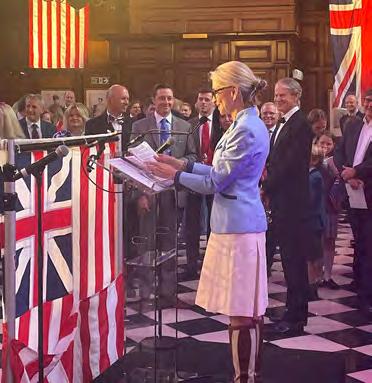
Democrats Abroad are targeting young voters in the UK by establishing extra chapters up and down the country in university towns like Oxford and Cambridge.
Mae Dobbs, a voter registration volunteer during the last presidential election, reported that this demographic had been neglected in 2020. “We set up in car boot sales and community events and at large corporate offices where we knew people were likely to vote – usually people aged 35+,” she explains.
Laurie Laird, American expat in London and US political commentator, outlines that of her four children, only her eldest votes. “She is 24, and takes it fairly seriously,” Laird says, adding, “my younger three could not give a toss”.
Miller thinks this is because “there is a lot of evidence that if you vote in the first election you can, then you will vote for the rest of your life”.
“I came over in my 30s and had voted in many elections already – I figured out how to get my ballot because voting was already important to me,” she adds.
With increasing numbers of Americans moving abroad as digital nomads, the likelihood that US elections will be decided beyond America’s borders increases. Swenson knows this too. In the future, he would like to use data-driven political targeting of the diaspora to identify likely Republican votes in the UK and encourage them to register to vote. The challenge? Convincing Trump, should he be back in the White House, to make Republicans Overseas an official wing of the Republican Party like Democrats Abroad.
Swenson may not be playing “cynical” politics much longer.

Republicans Overseas Democrats Abroad voting station Democrats Overseas 32
Susan Walton speaking

Don’t blame the pollsters
Experts suggest that US election polling is more accurate than it’s been given credit for
Anastasiia Udesiani
When pollsters wrongly predicted that Hillary Clinton would beat Donald Trump comfortably in 2016, many Americans lost faith in polling. Leading pollster FiveThirtyEight stated on election day that national support for Hillary Clinton was at 45.7 per cent and for Trump at 41.8 per cent. Nevertheless, it was a Trump victory.
Despite that massive underestimation of support for Trump, analysts are confident that polling will be accurate ahead of the upcoming US presidential election on 5 November, which will decide who will lead the US for the next four years.
“Obviously, the closer to the election date the polling takes place, the closer it can come. If done well, it is a perfect, within a margin of error, reflection of the electorate,” says Andrew Rudalevige, a professor of government at Bowdoin College, Maine.
Arnold Barnett, professor of statistics at the MIT Sloan School of Management, explains that although the polls indicated Clinton would win in 2016, their statistical predictions for the vote were actually very close to the final result. “In America, when people are asked in polls for whom they will vote, a lot of people refuse to answer,” he explains. “So the pollsters have to decide how those who did answer compared to
those who did not. And they did a very good job.”
Barnett further explains that the polls were right in indicating that should Trump win the swing state of Pennsylvania, he would likely win the election. Their mistake was that pre-election polls in Pennsylvania indicated a slight edge for Clinton (52 per cent) compared to 48 per cent for Trump, but Trump received more than 50 per cent of votes.
“When people are asked for whom they will vote, a lot of people refuse to answer”
Rudalevige says that polling in 2016 and 2020 was more accurate on a numerical level than it has been given credit for. “Even in 2016 – the national polling was not far off. In 2020, NBC’s national polling had Biden up 51-47 for a full year before the election. He won pretty much 51-47,” he says.
Polling by FiveThirtyEight for this year’s presidential election has Biden at 39.7 per cent, and Trump ahead at 41 per cent, as
of 1 June. These percentages remain largely unchanged despite a New York court finding Trump guilty of felony charges on 31 May.
Polling for this year’s election uses methodologies more diverse and varied than in previous presidential elections in a bid to be more accurate. There has been a sharp increase in address-based sampling, for example. A recent report released by the Pew Research Center shows that most national pollsters have made these changes since 2016, “in some cases dramatically”. In 2022, 17 per cent of national pollsters used at least three different methods to sample or interview people, up from 2 per cent in 2016.
How these methodological changes will affect the accuracy of polling predictions this year remains to be seen, and the polls themselves may change over the months leading up to the November election.
Barnett explains that factors including the consequences of Donald Trump’s New York trial and the upcoming debate where Biden, at 81 years old, may struggle to answer the questions posed to him, as too might Trump, 77, could influence voters. “Most people have made up their minds already, but enough are uncertain. And given that the polls are so close already, I think things could change.”
The 2020 presidential election results
Clay Banks
INTERNATIONAL 33
House of memelords
How social media has created a new form of political satire
Dom Plaskota
Dr Medusa says she would much rather be doing other things than posting multiple memes a day about Indian politics on social media – namely spending time with her dogs, whom she introduces during our interview.
“I look forward to the day when I don’t have to make videos. But at my heart I am an anti-establishment person. I think it is my responsibility to hold whoever is in power accountable.”
An academic by profession, Dr Medusa –an alias – is one of a number of “memelords” who will have their work cut out in 2024 as record numbers head to the polls around the world.
Memes have come a long way since the early days of stick drawings and stock images, overlaid with a sardonic message and posted on obscure corners of the internet. They have become mainstream, and are a big part of how social media users
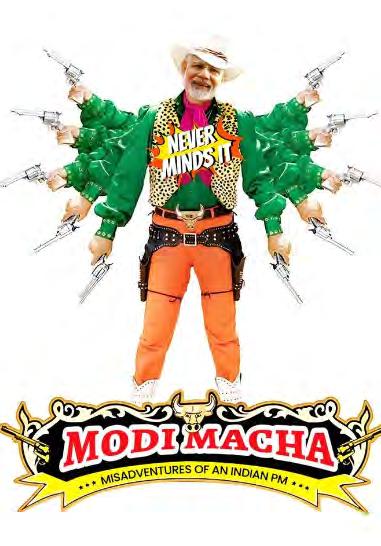
react to politics.
Memes have also been taken up by their traditional targets – politicians – who have started using them too, with varying degrees of success.
Donald Trump used memes to paint 81-year-old US President Joe Biden as the senile ‘Sleepy Joe’ and undermine his campaign for the US presidential election in 2019. Though the memes failed to stop Biden from winning, they still cause him problems as he seeks re-election this year.
“Through that comedy I evoke the tragedy that is going on”
British Prime Minister Rishi Sunak’s recent rain-soaked election announcement also provided ample fodder for meme-makers.
Dr Medusa is active on all the main social media platforms, but she is most dedicated to X, where she has 130,000 followers. Her videos poke fun at India’s political establishment, mocking Modi’s Hindu nationalist Bharatiya Janata Party (BJP) as well as the media and the electoral regulators.
The recent Indian election was the world’s biggest, involving 970 million registered voters. Although the BJP failed to win an outright majority, they won enough seats to ensure that Modi would serve a third consecutive term as prime minister. This was an outcome Dr Medusa had fought hard to prevent.
Since Modi was first elected in 2014, the BJP’s messaging has become increasingly Islamophobic.
Muslims are India’s largest ethnic minority group, accounting for roughly 15 per cent of its population, whereas the Hindu majority makes up about 80 per cent.
Dr Medusa says the Electoral

Commission of India and traditional media were slow to hold the BJP accountable.
“The satire helps me do that because traditional media and the language of the media is falling short of exposing the realities of the current times,” she says.
“I use all sorts of linguistic tools to poke fun at them, their policies, and the things they do. Through that comedy I evoke the tragedy that is actually going on right now.”
One of her videos compared the Electoral Commission of India to a lazy son who fails to react to his mother’s stories about the

Indian PM Modi in Dr Medusa’s X 34
Dr Medusa X

BJP’s transgressions. But, when he hears someone say a similar sounding word to the BJP’s rival party the Indian National Congress, he leaps into action.
Dr Medusa’s jovial demeanour belies the fact that she regularly receives death and rape threats.
Though she shows her face, her alias and the medium of the meme grant her some anonymity.
Lecturer in digital cultures at Queen Mary University of London, Dr Cristina. Moreno-Almeida says that “one of the


important things [in] the case of India and many other places, especially authoritarian regimes, is the anonymity of memes”.
“You can use that to go beyond the red lines that each country has, whatever they might be.”
She says that while in India it is speaking out against Modi and the BJP that is taboo, elsewhere, as in Morocco, it could be criticising the monarch rather than his political proxies.
Audrey Halversen, a researcher at the University of Michigan and co-author of a
study on memes, says this anonymity can be a double-edged sword.
She says in extreme cases memes become vehicles for hate speech as their creators hide behind anonymity. But they can also drive engagement in political issues.
“The really interesting thing is that people who don’t care much for politics are involved in politics [through memes] at all. This suggests that memes are a low-stakes way for a variety of people to get involved in politics and comment on political issues.”
The political memes that go viral do not always seek to influence voters, such as the meme which pitted former UK Prime Minister Liz Truss against a lettuce in a battle for survival – which she promptly lost. This year, another meme mockingly photographed her recently published memoir, 10 Years to Save the West, into the science fiction section of a bookshop.
Dr Rosalynd Southern, lecturer in political communication at the University of Liverpool, says such memes are influential with less politicallyengaged voters.
“People use these short calls or jokes to decide whether they like someone or not.”
The political implications are also important when considering the demographics of social media audiences.
Millennials (born between 1981 and 1996) and Gen Z (born between 1997 and 2012) make up most of social media users worldwide. They are also two of the largest demographic voting groups, though they have historically had low turnouts at elections.
Neither Southern nor Halversen can say whether the increased political engagement memes will translate into an increase in votes.
But, they agree, that is all the more reason to keep watching to find out.
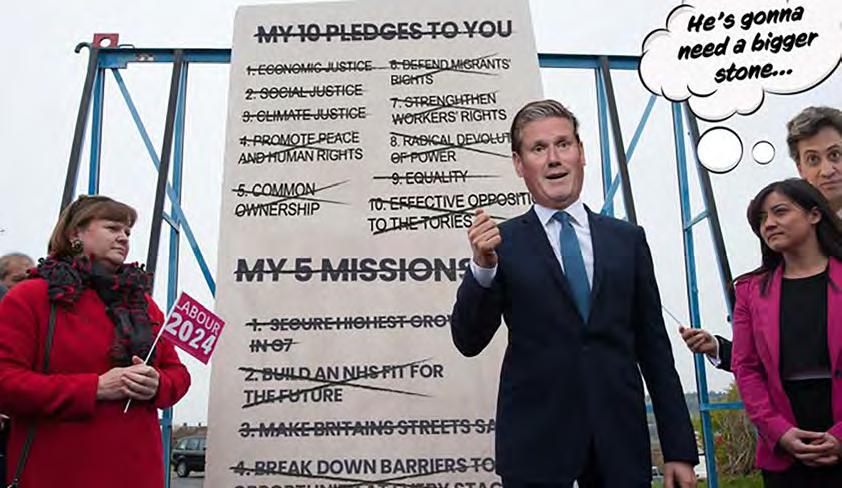
Labour Party X
Dr Medusa account
Labour and Conservative parties started a satirical battle using memes against political leaders on X and TikTok account Conservative Party X INTERNATIONAL 35
Indian satirist Dr Medusa video’s critisicing broadcasts known as “Modi Media”

Social media rebrand of Asia’s strongmen
Leaders in South East Asia are whitewashing dark pasts
Alex Daud Briggs
Alia Fariza, an Indonesian student studying in the UK, was weary when entering her overseas ballot for the 2024 Indonesian General Elections. The most popular candidate was Prabowo Subianto, a man accused of covering up human rights abuses by rebranding himself on social media.
Prabowo, 72, is a retired military commander and the former son-in-law of Suharto, the dictator who ruled Indonesia from 1968 to 1988. Troops under Prabowo’s command were said to have abducted and tortured pro-democracy activists, as well as ethnic minorities in East Timor and Papua. He was briefly banned from the United States for these alleged crimes.
“There were suspicions that he [Prabowo] was behind the kidnapping of students protesting the Suharto regime in 1997-1998. It was something I kept in consideration while
voting,” says Alia.
Despite an apparent dark past, Prabowo was elected president of Indonesia, the world’s third-largest democracy, in February.
His recent campaign was his third attempt at the presidency since 2014, and saw him seemingly successfully transformed into what people are calling a “cuddly grandpa”. He shuffled his feet on stage to the tune of bouncing pop music, dancing alongside cute cartoon mascot versions of himself. Followers described his routine as “gemoy” – a slang term meaning “adorable”, akin to a plush toy or small animal.
“[His social media activity] seemed designed to show that Prabowo is funny and can connect with young people,” says Alia. “I feel the dancing is to counteract the stigma that he is intimidating and authoritarian.”
Prabowo’s newfound popularity has not
 Citizens taking pictures with the mascot
Prabowo doing his signature dance
Quinton TembyIndopacifica
Citizens taking pictures with the mascot
Prabowo doing his signature dance
Quinton TembyIndopacifica
36
@prabowo,Prabowo Instagram
only changed people’s perception of him but also of the Suharto era in general. When he referred to his family connections in his victory speech in front of a packed stadium in Jakarta, the crowd erupted.
“I don’t know if they forgot who Suharto was, but they welcomed the sight of the family,” says Resty Yuniar, a Jakarta-based journalist. “On TikTok, we saw old videos of Prabowo when he was still a military man with his family. People liked that Prabowo was part of the family. They dressed nice, they looked important.”
Indonesia is not the only Southeast Asian country to see a political dynasty return with an online rebranding. The 2022 Filipino election saw Ferdinand Marcos Jr., son of the former Philippine dictator Ferdinand Marcos Sr. and known by his nickname Bongbong, elected as president.
For his campaign, Bongbong rarely engaged with mainstream media. Instead, he used a preexisting following on social media platforms like Instagram and worked with influencers, whom he referred to as his “army of trolls”, to produce disinformation. They portrayed his father’s reign – a martial law regime marked by violence and oppression – as a “golden age”.
Jean Encinas-Franco, a professor of political science at the University of the Philippines Diliman, says “many of his hired vloggers said Marcos Sr. was responsible for the economic growth of the 1960s but that was not accurate. There was one account that says the presidency of Marcos Jr. was prophesied by Nostradamus. It was then I knew he was going to win. These videos had so many likes, people believed it.”
Both Indonesia and the Philippines have a high number of younger voters, many of whom use social media as their main news source.
“I feel the dancing is to counteract the stigma that he is intimidating”
Kennedy Muslim, senior researcher at Indikator Politik Indonesia, said that modern social media has made it very easy for these populist politicians to gain popularity. This is not only because the platforms create an echo chamber by constantly recommending similar posts, but also because websites like TikTok make it easier for users to go viral by creating content on trending subjects.
For many Southeast Asian countries, democracy is still a new concept. Following its various 20th century independence movements, the region has often been ruled by family dynasties, with the children of authoritarian leaders themselves taking office and implementing their own undemocratic policies.

“Prabowo’s campaign highlighted the issue of democracy and corruption, but people don’t care,” adds Muslim. “For them, democracy is a tool to reach economic wellbeing. Prabowo makes fun videos and has promised to continue the policies of Jokowi [his predecessor]. People like Jokowi’s policies so they like Prabowo. Bringing up democracy issues just doesn’t have resonance with the

Indonesian population.”
This is supported by a study conducted by Muslim and political science professor Burhanuddin Muhtadi which found a diverse cross-section of Indonesian voters supported Prabowo and followed his online content, showing little concern for his ethical controversies.
Another challenge is the lack of education about the country’s recent history. Yuniar, Franco, and Muslim all agree that a large part of Prabowo and Bongbong’s success came about because their young voter base had not been born during their countries’ former dictatorships. Even when confronted with these truths, it’s easier to deny they happened or downplay their severity, as these events are often not taught in schools or acknowledged by officials.
“I think it speaks volumes of the Indonesian government’s inability to speak about our dark past,” Yuniar says. “Instead of talking about it, like say Germany does with the Holocaust, it’s swept under the rug. I don’t blame the students for forgetting history, it hasn’t been taught well in the first place.”
Prabowo’s promise of greater prosperity to Indonesia sounds wonderful on the surface, but it might ultimately take second place to the TikTok dances for which he has become renowned.
Parade ballons of one of the candidates
Poster of the candidates
Quinton TembyIndopacifica
Indopacifica INTERNATIONAL 37
Quinton Temby -
Leading with Bukele’s gang-busting model spreads to El Salvador’s neighbours
Ana Garcia Sancho
Until recently, most of El Salvador’s crime-ridden rural areas were effectively a no-go zone. Ruled by rival gangs, the simple act of travelling from one town to another often meant complying with the arbitrary demands and extortions of criminals.
When President Nayib Bukele took office in 2019 however, he implemented a crackdown on violence, arresting gang members without trial. This has transformed Salvadorian society. Once referred to as the murder capital of the world, El Salvador now ranks as the second-safest country in Latin America, with homicide rates at historic lows. Bukele’s measures have transformed a country crippled by violence.
“Now, you can walk freely with all the calm in the world”, says Carmen Valeria, a Salvadorian journalist, who recalls how just visiting certain parts of the capital would mean putting your life at risk. “In the last few years, Salvadorians have been able to access the streets they never could before.”
The calm which now reigns across El Salvador is the direct result of a state of emergency declared in response to the massacre of 87 people between 25 and 27 March 2022. Many people in rural communities have complained of family members being arrested, but they are also glad



that the violence has abated.
The declaration of the state of emergency resulted in 75,000 arrests. Of those arrested, 12,114 were sent to the new Tecoluca mega prison, which is built to hold 40,000 people. Reports from the organisation Cristosal have emerged that allege severe overcrowding and numerous human rights violations, including instances of torture and inhumane treatment.
When Salvadorian journalist Jaime Quintanilla traversed hundreds of rural communities, asking locals if they knew anyone who had been unfairly arrested, every person he met said they knew of at least one.

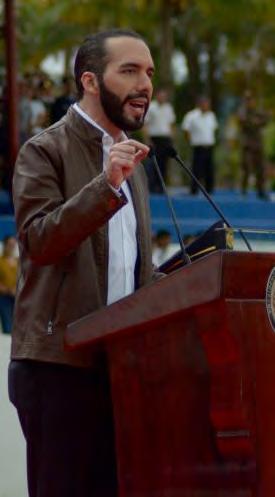
All however were glad that there was no more violence. “Even parents of children who were arrested said: ‘Yes, they arrested my son, but at least there are no more gangs in the villages,’” Quintanilla reported.
This has earned Bukele popularity, authority, and the power to change the country’s political structures. His success has prompted other Latin American leaders to adopt a similar model. Governments in Honduras, Ecuador, Guatemala, and Argentina have attempted to replicate what is known as the Salvadorian “mano dura” (“firm hand”) policy.
Popularity aside, some commentators believe El Salvador is on the verge of becoming an authoritarian state. Bukele has shaken up convention by deciding to run for a second term and by altering the legislature and judicial system. In this year’s elections, he received 83 per cent of the votes.
“Bukele is going into his unconstitutional
A man being arrested
38
Jaime Quintanilla
an iron fist
Presidency of the Republic of El Salvador

consecutive second term,” explains local journalist Jaime Quintanilla. “But he is already empowered to modify the constitution; he will just mandate it to his legislative assembly, and they will say ‘yes’.”
In addition, the government faces international criticism for human rights violations.
“Going back is not a good idea; even if the security situation is better”
“People support Bukele because they are concerned about security,” continues Quintanilla. “The Salvadorians never imagined that they would be able to walk on
safe streets. But they are used to sacrificing rights. People here haven’t really experienced a true democracy.”
“We used to have at least 10 to 15 murders daily. But after all these atrocities, which the majority of the population had to live through, we were suddenly free. We felt as if we were living in a different country, with the ability to visit previously dangerous locations and even reunite with families after years apart.”
While it may satisfy people in the country, the mano dura policy is unpopular among some Salvadorians living abroad, including Aristides Palacios, who has been living in London for several years. In his view, Bukele’s state of emergency unnecessarily restricts people’s political liberty and freedom of speech.
“Going back is not a good idea. Even if the security situation is better, there remain huge problems with social and economic
conditions that are not going to be solved any time soon,” he says.
Also working against Bukele is the fact that his anti-gang policy hasn’t proven effective in neighbouring countries, such as Honduras, where President Xiomara Castro’s administration has been adopting the El Salvador approach.
Fernando Silva, a Honduran journalist, says that since Castro took office, the relationship between the two countries has become closer. Bukele’s government has sent advisors to Castro’s administration, offering guidance on how to emulate their policies.
“Yes, they arrested my son, but at least there are no more gangs in the village”
By contrast with its neighbour, since 2022 Castro’s state of emergency has not produced the same results observed in El Salvador.
The UN recently declared Honduras “one of the most dangerous countries for individuals who defend the environment, indigenous territory, and human rights”. It also expressed concern about the imposed “state of emergency, which has been in place for the last 15 months”.
“Our police force is not structured the same way. The gangs are different, and [law enforcement] organisations are not as strong as they are in El Salvador,” explains Silva.
“There aren’t enough police for territories with a dense population,” he adds. “People in Honduras are anticipating a crackdown on violence. However, no results are forthcoming, and they probably won’t be to the same degree as in El Salvador.Nevertheless, we are witnessing the emergence of a new political authoritarian model.”
 President Nayib Bukele
President Nayib Bukele
Oscardvj
President Xiomara
INTERNATIONAL 39
Barriers at the ballot box
How Maduro
is preventing
Venezuelans overseas from voting
Before leaving the house on her way to the Venezuelan consulate in Madrid, 31-year-old economist María Antonieta Ramírez checked the documentation requested by the Venezuelan government to qualify her to vote abroad. She arrived at 7.30 am with her husband, 33-year-old civil engineer Federico Antillano, who was also trying to register himself.
After waiting in a queue for three long hours, Ramírez discovered she could not vote because she had not presented her original European identity document. This specification, however, was not on the list released by the government.
Venezuela is holding presidential elections on 28 July. This is a historic ballot because President Nicolás Maduro’s government allowed an opponent to register for the first time in a decade. The former diplomat Edmundo González is running to end 25 years of Chavismo, the left-wing populist political system implemented by former President Hugo Chávez and continued by Maduro.
Under international pressure, Maduro’s government signed the Barbados
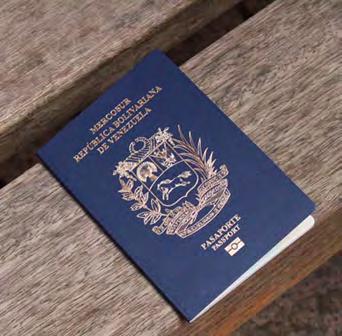

Agreement in October, with which it pledged to hold democratic elections. In practice, however, many expatriate Venezuelans cannot be guaranteed the right to vote because the government has asked them for documents many cannot access, such as a current passport and an identity card, and they also require proof of permanent residence.
“What they’re doing is putting up more obstacles to stop us from voting”
Overseas voters could prove decisive in securing an opposition victory, considering Venezuela has seen major emigration caused by shortages of medicines and food, government repression, violence, and hyperinflation. According to the Plataforma de Coordinación Interagencial para Refugiados y Migrantes, 7.7 million people have left the country in recent years; its current population now stands at around 29 million inhabitants.
Ramírez says that in Madrid, registration was only open for a fortnight, catering to 60 people a day, even though the country is home to 477,000 Venezuelans. “What they’re doing is putting up more obstacles to stop us from voting because they know that many people living abroad are going to vote for the opposition,” says Ramírez. Her husband waited in the queue for eight hours and managed to register. He was lucky to meet at least the basic registration requirements. This is not the case for 76-year-old social worker Maritza Castillo, who left Venezuela for Chile in
2018 and saw her passport expire a year later. Until last year, Venezuelan embassies were closed for passport renewals abroad. Though they are now open, they are unaffordable for some people. According to the Administrative Service for Identification, Migration and Foreigners, the document costs around £250.
In Chile, Castillo is required to have permanent residency. “[It] takes at least five years to obtain. It’s depressing. There’s a feeling of helplessness in not being able to do anything about the electoral process,” says Castillo, who worked in voting centres in the pre-Maduro era.
32-year-old marketing manager Oriana Fantin, who has been living in London since 2018, got her new passport in January. She waited one hour to register her vote in April.
“I don’t have any faith in these elections, but I [registered] because I always felt this responsibility to my country,” says Fantin. She campaigned in the 2015 parliamentary elections to get young voters registered.
Ramírez also feels this responsibility. She doesn’t plan on returning to Venezuela, but she wants to vote, dreaming of guaranteeing the quality of life for her compatriots.
“I wanted to do it for my family, my friends, and all the people who want to be in Venezuela. I feel that being far away, this is the only way I can help,” she says.
The process of trying to vote led Ramírez to revisit memories of the difficult days and weeks when she initially moved from Venezuela to Spain.
“[But] even though immigrating was difficult, it was the best decision of my life.” Not being able to vote has reaffirmed her desire to stay away from her country of origin. “[It] makes me feel that I have no future and nothing will change.”
40
Alice de Souza
Venezuelan passport
Alice de Souza
Alice de Souza
Oriana Fantin, Venezuelan in London
An unrecognised democracy
Somaliland’s upcoming presidential elections amid struggle for international recognition
Cahal McAuley
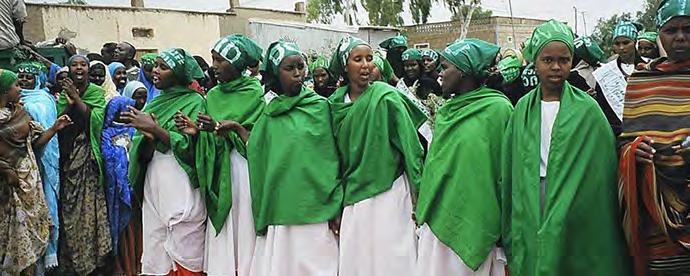
Born a year after Somaliland won its independence, Mukhtar Harir has observed his homeland’s progress every day of his life.
“I was born when Somaliland was born,” reflects Harir, an NGO worker. “I came into the world in 1992 – Somaliland began in 1991, and I’ve stayed here peacefully my whole life. There is progress – we cannot say Somaliland hasn’t progressed. The only thing we lack is recognition.”
With 6.2 million residents and an area of 176,000 square kilometres, Somaliland, in the Horn of Africa, is the largest unrecognised country in the world by territory that it controls.
Despite its lack of international recognition and few diplomatic ties, Somaliland has managed to become one of the bestfunctioning democracies in the region. Its strong public participation in politics and peaceful transfers of power provide a contrast to the instability of neighbouring Ethiopia, Djibouti, and Somalia.
Somalilanders will go to the polls this November to vote for their next president. However, their elections have been controversially delayed for over two years, eroding trust in the democratic system and threatening the advances that the country has worked so hard to build.
The incumbent President Muse Bihi Abdi, from the Kulmiye party, had his mandate extended by two years after the National Election Commission postponed voting due to “time, technical, and financial constraints”.
The delay led to major clashes between
https://tinyurl.com/mv5xby83
opposition protesters and government security forces, who used tear gas and live ammunition, killing at least five and injuring 100 more.
“It has created some problems, people have become more suspicious about what happens next. It started political unrest and affected the economy,” says Harir from his office in Hargeisa, Somaliland’s capital city.
“During the extension, there wasn’t much growth in the country, the people were stagnant,” he adds. “We are a developing country, but the building of new infrastructure and purchase of land around big cities stopped because of this violence and the people’s trust was reduced.”
“There is progress – we cannot say Somaliland hasn’t progressed”
Along with unrest at home, Somaliland’s position within the Horn of Africa seems likely to shift before the election.
The country seems on the verge of its first official recognition by landlocked Ethiopia, in exchange for allowing Ethiopia to use its Berbera port, after a shock Memorandum of Agreement between the two countries was announced in January.
This may not be the long-awaited victory for Somalilanders, as Somalia, which claims
sovereignty over Somaliland, is vehemently opposed to any recognition.
Somalia has already been ravaged by fighting against the Islamic insurgency group Al-Shabaab – which Somaliland has largely avoided – but further destabilisation may change this.
Although Somaliland won its independence from Somalia, it is also wary of a deal with Ethiopia, as Harir explains:
“Since Somaliland has no binding recognition, if we try to go ahead with this agreement, there is no way to raise our concerns because we have not legally existed in the world and people believe we cannot give up our land for the recognition of one country.”
“Only one country can’t give you recognition; you need to look at others,” he concludes.
Bihi hopes the deal with Ethiopia and potential recognition will be enough to negate the controversy of his extension and win him a second term.
But Candace Cook, research associate on elections at the Africa Centre for Strategic Studies, argues the credibility of his government has been damaged.
“The disagreement over the sequencing and scheduling of the presidential election undermined Somaliland’s reputation of local conflict resolution and political compromise. The upcoming election will be competitive,” Cook says.
She believes that the elections come at a time of great uncertainty for Somalilanders, but their democratic institutions have endured in spite of their relative isolation and remain an important part of their path toward recognition.
“Somaliland has made tremendous progress in its democratic trajectory. This is all despite its lack of international recognition.”
Cook adds: “Elections have been important for Somaliland’s quest for international recognition, but its democratic trajectory is not dependent on it. Broader legal and electoral reforms will be needed to ensure Somaliland continues on its path of being one of the most inclusive multi-party democratic systems in East Africa.”
F. Omer
41 INTERNATIONAL
Women in Somaliland at a parade
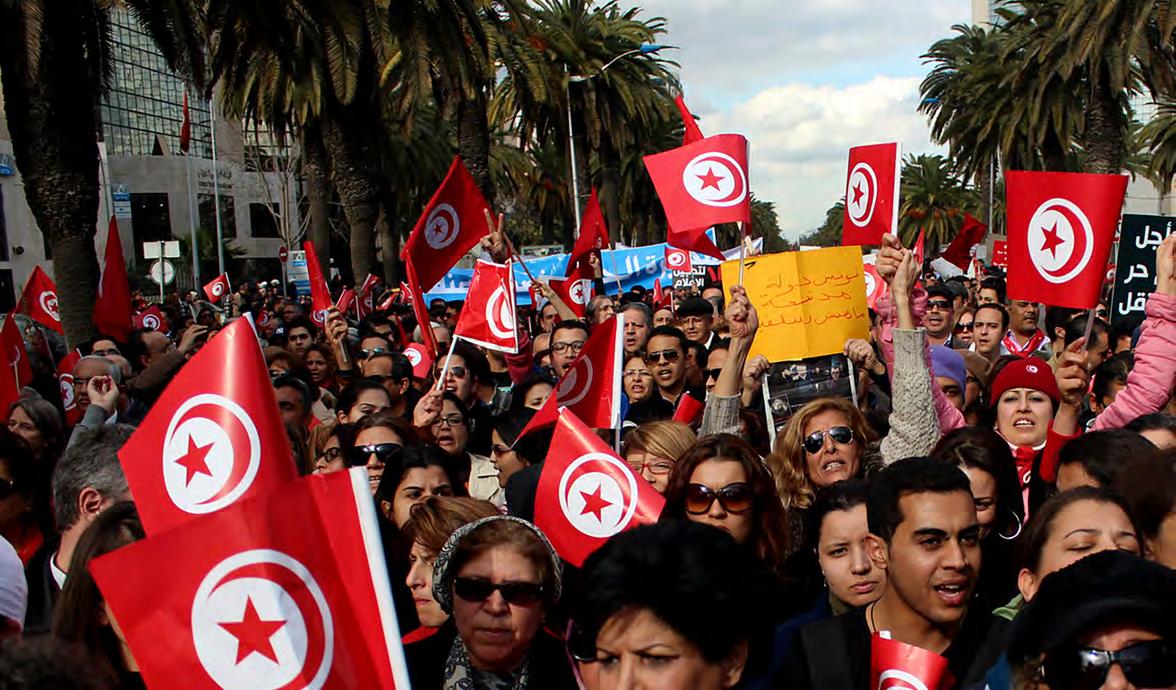
Black women resist Tunisia’s backslide
Activists’ ongoing fight against authoritarianism
Roberta Spada
Growing up during the regime of Ben Ali, the dictator who held power in Tunisia between 1987 and 2011, Aicha never understood why her upperclass family was so politically involved. As part of Tunisia’s Black minority population, which accounts for 10 to 15 per cent of the country’s population, they cared passionately about changing things in their country and achieving freedom.
“Everything was okay in my life, so I didn’t understand why,” she says. “I’m happy. I have everything I need,” she remembers thinking.
But when her mother sent her to Denmark for a holiday at 17, everything changed.
Unlike in Ben Ali’s Tunisia, the democratic
Scandinavian country didn’t subject the political opposition to imprisonment and torture. There, human rights were a reality. Freedom of speech, movement, and association were permitted.
“Now I get my parents! I saw the gap,” she recalls.
After coming back from her trip, Aicha started getting involved in activism. She has not stopped since and has become a core figure in the fight against racism, inequality, and gender discrimination in Tunisia.
But she is not alone in this. Black women have been at the forefront of the prodemocracy movement in the country since 2011, when the Arab Spring brought down
Ben Ali’s authoritarian regime.
These activists spent the last decade bringing issues of racism, gender, sexuality, inequality, and migration into the public consciousness. They carved a new space for Black women in the political sphere, but such space is rapidly shrinking as Tunisia faces a new wave of repression and racism under President Kais Saied.
“We’ve never ever thought that we would experience a backlash in terms of our rights, our achievements,” says Aicha. “It’s something that we have been building and building and building and then everything vanished!”
Aicha’s name is a pseudonym. She has asked to have her identity concealed because
42

her safety and that of her fellow activists is at risk under re-emergent repressive circumstances. Many of them have already been arrested.
Tunisia’s return to authoritarianism started in 2021, when President Saied staged a coup, dissolving the parliament and arresting prominent political figures. He proceeded to heavily limit civic space and continues to do so with increasing force. Elections are set to take place in the country this fall, but whether they will unfold lawfully and democratically is questioned by activists and scholars.
“The people who nowadays oppose Saied’s regime do it with immense courage because the consequences for them and their families are enormous,” says Guendalina Simoncini, a political science researcher at Scuola Normale Superiore in Pisa, Italy. “Women have it worse,” she adds, as “repression is never indifferent to gender”.
The 2021 coup was met with disbelief. After the Arab Spring, a series of anti-government protests, uprisings, and armed rebellions that began in Tunisia and spread across the Arab world in the early 2010s, Tunisia was considered the only country that had successfully transitioned into a democracy.
Tunisia’s path toward democracy in the past decade had allowed Black women’s activism to develop and challenge racism and gender inequality in the country.
“The Tunisian environment is deeply racist, with structural problems around the visibility and participation of Black Tunisian people,” says Simoncini. She further explains that Black women face an added layer of oppression because of their gender.
“Women obviously pay an even higher price to take up space in public and talk about their marginalised experience,” she continues.
After 2011, they worked with other branches of Tunisian civil society to draft the new constitution, backing Black Tunisians and the rights of migrants from other African nations. They bolstered the need for their full social, economic, and political participation. In 2018, they successfully campaigned for the first anti-racial discrimination law in the Arab world.
However, achievements in racial justice are at risk under Saied. In February 2023, the president made a speech supporting the Great Replacement theory, a conspiracy theory popular in the West which states that native-born populations are being deliberately replaced by immigrants from non-white countries.
“Women have it worse. Repression is never indifferent to gender”
“His speech was a social trauma,” says Simoncini. She highlights the speech’s link to the global rise of populism and the Tunisian economic crisis, as well as the violence that ensued from his stance: “The impact was huge and is ongoing.”
“The president gave [racists] this
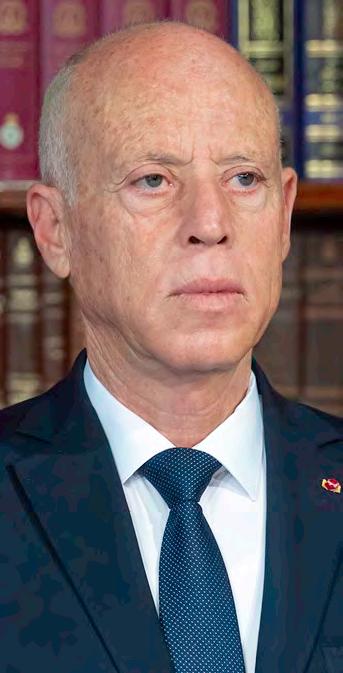
legitimacy,” explains Aicha. “He gave them the power to go from verbal violence to physical violence. It was like just saying go and kill people!”
In May, the number of arrests of political activists, including several prominent Black women, increased. Tunisians however are taking back to the streets to protest and preserve the civic space they fought for over the past decade.
“One of the few things that we kept from the revolution is that we are a very, very committed, informed, and strong civil society,” says Aicha. “We lost everything that we built during these ten years, but something that we maintain until now is this community that we created.”
As political repression intensifies ahead of the next election, it remains unclear whether the legacy of these activists will be enough to protect what is left of Tunisia’s feeble democracy.
 Tunisian protests
President Saied
Gwenael Plaser
Houcemmzoughi
Tunisian protests
President Saied
Gwenael Plaser
Houcemmzoughi
INTERNATIONAL 43
Gwenael Plaser

Georgia at the crossroads
The civil society groups struggling
to survive in Tbilisi
Jamie Onslow
There wasn’t one specific moment at which Tengiz Gogotishvili, a journalist at Georgian independent news channel Mtavari TV, decided to take a stand against Georgia’s government. Rather, as the situation gradually deteriorated he felt he had no other option.
Gogotishvili and his colleagues are continually harassed by pro-government thugs while trying to report. “It’s not just getting a bit worse, it’s getting catastrophic. Journalists are physically beaten” he says.
He insists that they are “wire-tapped everywhere, always.” Worse still, the Georgian communications regulator has frozen Mtavari’s bank accounts and imposed fines: According to Gogotishvili, the state is determined to break his outfit financially through spurious means.

“And they succeeded,” he adds bitterly.
The situation has become so bad that Gogotishvili has had to abandon journalistic impartiality. “Now we are not a ‘real media’ –we are part of the fight, a side in this conflict. We have no other choice,” says Gogotishvili.
Georgia has caught the world’s attention in recent months because of mass protests against a new law that requires NGOs and independent media organisations that receive more than 20% of their funding from overseas to register as “pursuing the interests of a foreign power.” The legislation has sparked fears amongst Georgians that its government is trying to sabotage the country’s EU accession, and turn towards Russia.
For the groups affected by the law, it is just the latest in a series of provocations by the
Pro-EU protesters
“No place for him in this country”: poster of Vladimer Mkervalishvili in Tiblisi
Levan Gogotishvili
44
Vladimer Mkervalishvili

governing Georgian Dream party, which has ruled for the past 12 years.
Paata Gaprindashvili is the director of Georgia’s Reform Associates (GRASS), a think tank that advises the government on European integration. Whilst GRASS has been able to cooperate in some areas with the government, it has also found itself “a target for different kinds of pressure [such as] blackmail, first and foremost from the ruling party.”
Rights Georgia, one of Georgia’s oldest human rights organisations, is another NGO that has been subject to intimidation from the government. “Last week outside of my office was stuck the posters of NGO leaders, including me, with the slogans ‘enemy of the state’, ‘foreign spy’, ‘there is no place for him in this country’,” says Vladimer Mkervalishvili, Rights Georgia’s executive director. “Previously, we allocated our resources to the protection of others, but we now have to prioritise our own security.”
“We now have to prioritise our own protection and security”
Groups like GRASS and Rights Georgia, as well as independent journalists such as Gogotishvili, are the backbone of Georgian civil society. For the past thirty years, they have been the driving force behind Georgia’s gradual assimilation with Europe.
Their work has been animated as much by a desire to modernise their country as by a deepseated fear that it will not be able to escape Russian domination: “We do not have a choice but Europe. The other choice, if one can dub it a choice, is to be part of the Russian swamp,” says Gaprindashvili.
This has made them the natural target of a ruling party that seems increasingly ambivalent about the country’s European future. Georgian Dream was founded in 2011 by Bidzina Ivanishvili, an oligarch who
made his fortune in Moscow in the 1990s. UnderGeorgian Dream, the country has made some progress towards European integration – Georgia was granted candidate status by the EU in December last year. But the Ivanishvilicontrolled government also increasingly resembles Vladimir Putin’s regime.
The proposed foreign agents law appears to have been lifted straight from the Kremlin’s playbook – an almost identical piece of legislation was enacted in Russia in 2012. Georgian Dream has also taken steps towards normalising relations with Russia. It did not join in with Western sanctions against Russia following the invasion of Ukraine, and reopened flights with Russia last year.
If Gogotishvili, Gaprindashvili, and Mkervalishvili are right in believing the Ivanishvili-controlled government is intent on fully replicating the Putin system and eliminating democratic opposition, then it makes sense to go after civil society groups. These are well-organised and staffed by Georgia’s educated elite, rather than the opposition parties. “Unfortunately the political opposition in Georgia is very weak,” says Mkvervalishvili, who explains that it is made up of discredited members of the previous government which had become deeply unpopular by the time it left office.
As a result, civil society groups are one of the last relatively organised bastions of liberal democratic values in Georgian society. “[NGOs are the only] remaining institutions capable of holding the state to account for its illegality, corruption, arbitrariness and opacity”
says Mkvervalishvili.
The foreign agents law, which finally passed the Georgian parliament on 28 May and will come into force in the coming months, could well be a fatal blow to this network, as it is largely dependent on foreign funding from overseas donors, such as the UN. Rights Georgia and GRASS have both said that they will not comply with the law, and will cease all cooperation with the Georgian Dream government.
This reliance on foreign funding has made them an easy target for Georgian Dream’s propaganda. At a recent speech, Ivanishvili claimed that Georgian NGOs were doing the bidding of Western spy agencies, who he blamed for provoking conflict with Russia in Ukraine and Georgia.
“I wish Georgia already was strong enough, rich enough to help”
One protester and former NGO worker says that “there are several people, including my childhood friends, who really believe that I’m getting paid for this protest. So you imagine how deep the roots of this propaganda have gone.”
Gaprindashvili says that the reliance on foreign funding is simply a result of a lack of funding available in Georgia: “I wish Georgia was, if not like the UK, like that wonderful country Estonia, which itself has become rich enough [to fund NGOs] domestically. I wish Georgia already was rich enough to help others, including its own civil society groups. We are not.”
Georgia will hold parliamentary elections in October. Gaprindashvili is cautiously optimistic that Georgian Dream will not be able to hold onto power: “Now there is a top issue: to stop Georgia changing its foreign policy direction and to get it back to the European trajectory. I predict that if elections are held in a free and fair manner, then Georgia’s ruling party does not have a political future.”
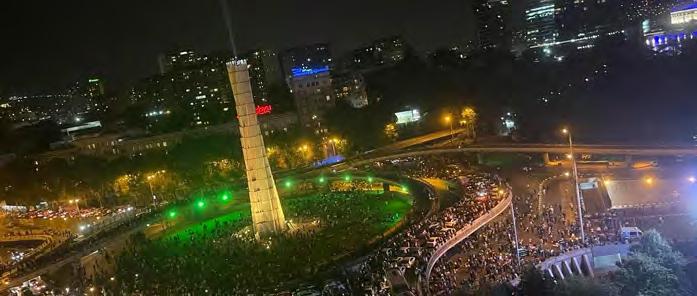
in central Tiblisi
Demonstration
Posters of other NGO leaders
INTERNATIONAL 45
Levan Gogotishvili
Vladimer Mkervalishvili

Ukraine’s election dilemma
Postponed elections in a
Jasper Goddard
Four years ago, Volodymyr Zelensky pulled off a shock victory in the Ukrainian presidential elections. As the Russian invasion of Ukraine continues into its third year, 31 March 2024 – the date set for the next election – came and went without any votes being cast in a country still under martial law.
For Oleg Kolesnik, a student at Donetsk National University, elections are far down the list of concerns.
“This is not the time for elections, because every Ukrainian, every politician and soldier, needs to concentrate on the war against Russian occupation,” he says. “Only after that can we conduct elections, because right now it’s impossible.”
Polling suggests the Ukrainian public overwhelmingly support Zelensky’s decision to postpone the election. A survey conducted by Kyiv’s Institute of Sociology in October 2023 found that 81 per cent believe the elections should be postponed until after the end of the war.
Yet despite some Western countries pressuring Zelensky to go ahead with the scheduled elections, Elena Davlikanova, Fellow at the Center for European Policy Analysis (CEPA), says there is simply not enough money for an election campaign.
“Basically the whole budget that we earn ourselves goes towards buying weapons, while the other part of the budget that is subsidised by western aid goes to support the economy,” she explains. “That’s why
war-torn country
[Zelensky] said if the West wants us to hold elections then they should share this responsibility financially as well.”
For Davlikanova, a major concern is the inability of the armed forces to participate. With estimates of between 200,000-300,000 soldiers currently on the frontline, holding an election would exclude a large section of the population from both voting and running for office.
There is also the issue of safety. Russia has indiscriminately targeted civilians with its bombing campaign, so there are fears polling stations would become military targets. Valeriia Syzoniuk, a postgraduate student, thinks the risks to voters are too high.
“They’re targeting civilians, parks, places where people walk. Let’s say we organise
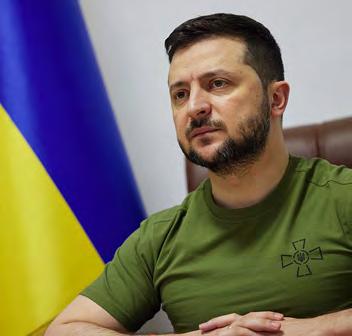
the election, will they target them?” says Syzoniuk. “So if you ask, am I for or against it? I would say I’m against the election at the moment.”
Unlike Ukraine, Russia held its own election in March, but the result was internationally condemned as illegitimate. Davlikanova acknowledges this paradox, which has played into Putin’s attempts to portray Ukraine as authoritarian and Russia as democratic.
“The lack of elections helps this narrative, but in reality it doesn’t affect the truth,” she says. “We are trying to explain that Russia holding elections is not a democratic country, because elections themselves are not a sign of democracy. We don’t want ritual voting [like in Russia], we want political processes.”
With no foreseeable end to what has become a war of attrition, it’s not clear to Syzoniuk when the next opportunity to vote might arise.
“Who knows, maybe I will live forever under this state of war. Does this mean we will have Zelensky forever? I don’t think so. I think if [war] continues, we will bring this up again, but at the moment I don’t think it’s the right time,” she says.
For now, it seems elections are both undesirable and unfeasible in Ukraine. For young Ukrainians like Kolesnik and Syzoniuk, the Zelensky administration is right to focus its efforts on fighting the Russian invasion.
Ministry of Defense of Ukraine: https://tinyurl.com/bdhk3nvw The Presidental Office of Ukraine: https://tinyurl.com/3b2kbbtr President Zelensky 46
Military tanks in eastern Ukraine
Dreams come true, for some
Over 13,000 South Africans cast their ballot at Trafalgar Square, London on May 18. They shared same concerns about corruption, crime, unemployment and power cuts with their family and friends at home. Eventually, the ruling African National Congress lost its grip on power, winning just 40% of seats. The country is likely to see its first coalition government since apatheid ended 30 years ago.

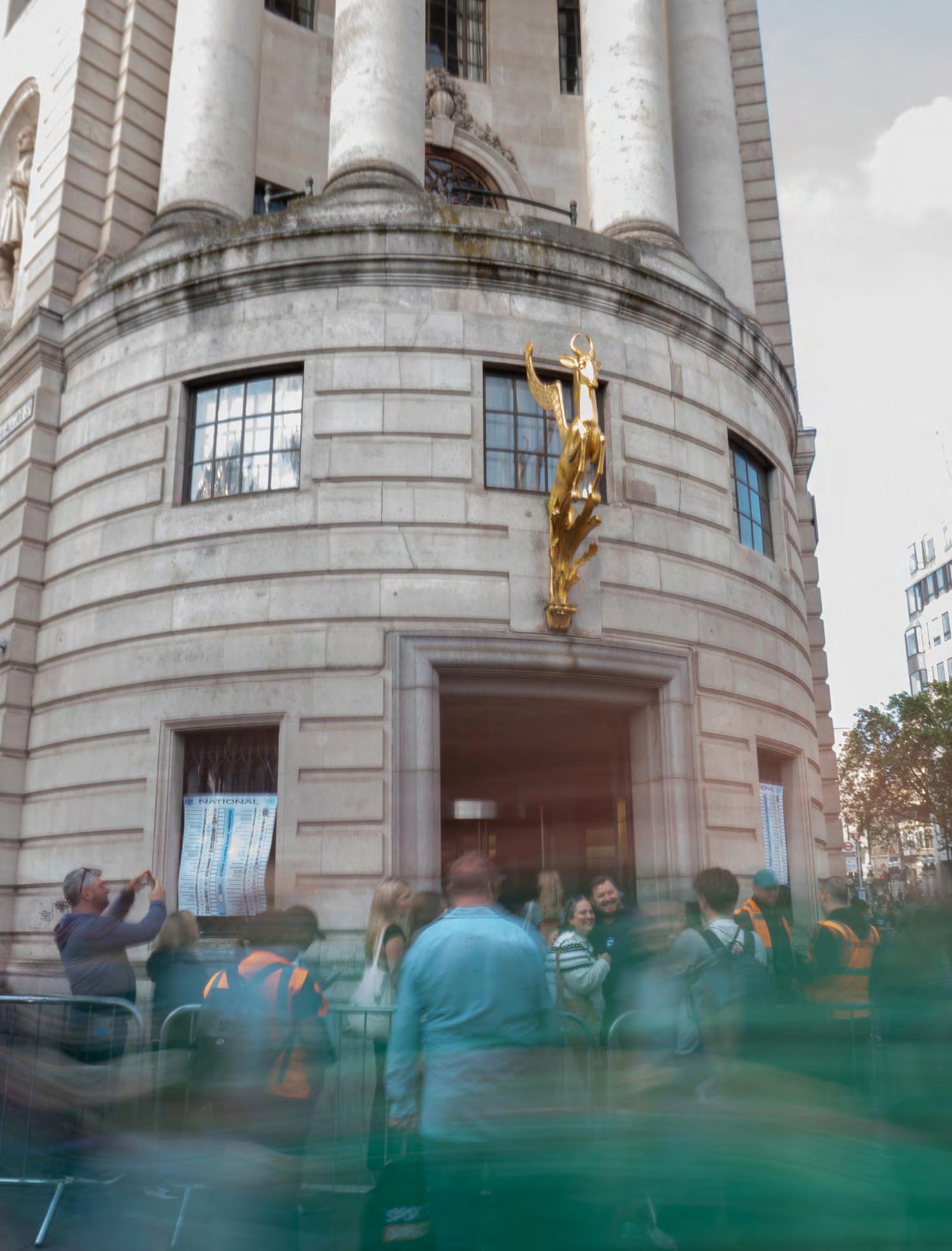
Kai Kong
















Voices
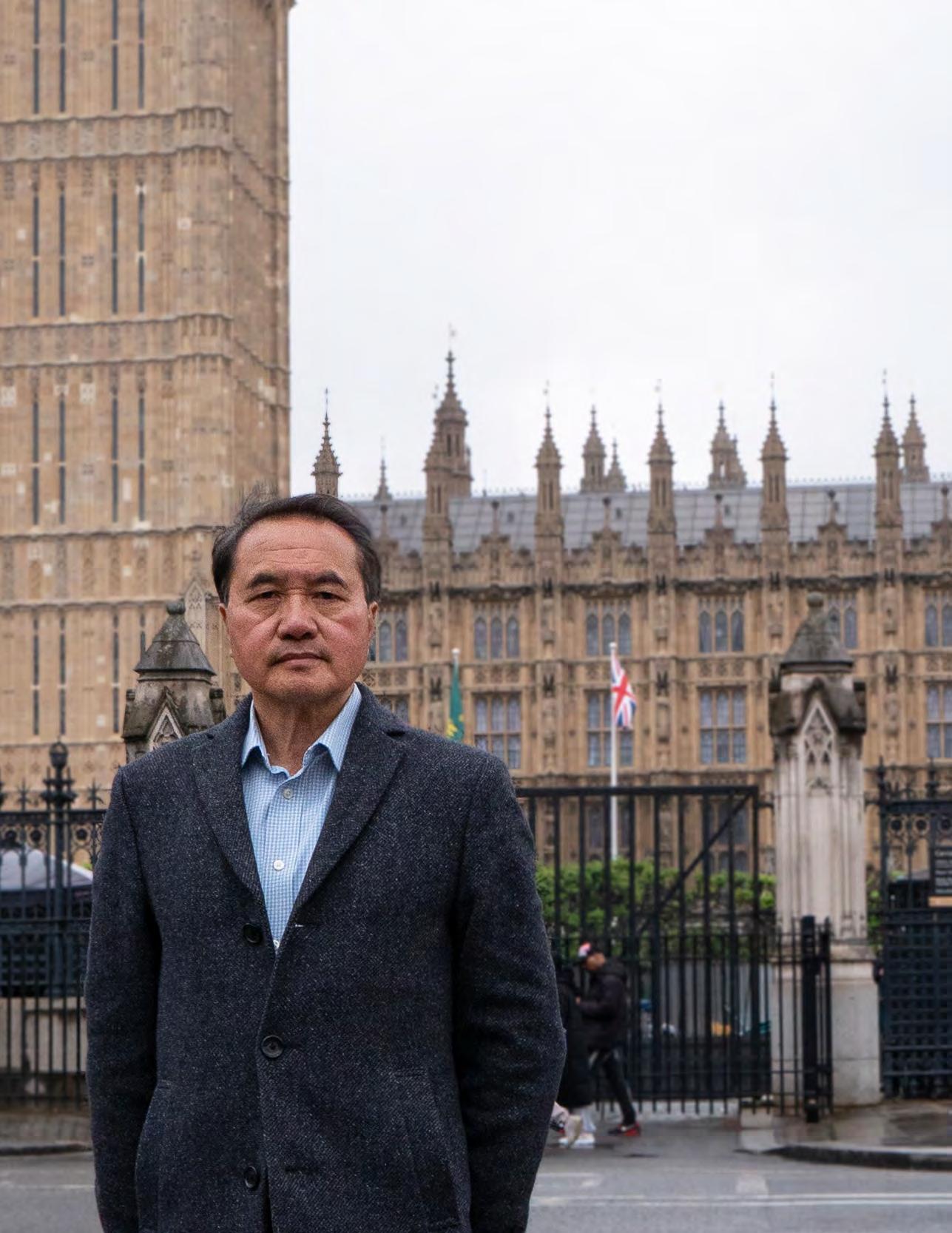
Passing the baton
A veteran Hong Kong democrat continues his mission overseas
Kai Kong
Kai Kong
Lee Wing-tat was almost late for our meeting. He bumped into an old friend from Hong Kong on the tube, who tried to invite him for a coffee. Thankfully for our interview he declined, but they chatted for 20 minutes.
“Young people may not know me, but some people over 40 do,” he says.
Today, it is more common than ever to meet Hongkongers in the UK. Over 150,000 people from the city have moved to the country since the British National Overseas (BNO) visa scheme, according to the Home Office. The scheme was introduced in 2021 after Beijing imposed a sweeping National Security Law in June 2020 that cracked down on dissent.
Lee, 68, is a familiar figure to many of the new arrivals. For the past four decades he has been at the heart of the Hong Kong’s politics.
From the 1980s to the 2000s, he was elected multiple times as a district councillor, regional councillor and legislator. In 1994, he co-founded the Democratic Party, the largest opposition party in the city.
Lee fled Hong Kong in 2021 after 47 democrats were charged with subversion under the National Security Law. The law was passed by the Chinese central government in response to 2019 protests in Hong Kong against a proposed extradition bill, which would have allowed China to extradite Hong Kong residents to the mainland.
Three years after leaving his home, he is now working with young democrats as an ambassador for Vote for Hong Kong 2024 (Vote4HK), a project to mobilise the Hong Kong diaspora to vote in the upcoming UK elections.
For Lee, advocating for democracy is a lifelong commitment regardless of where he lives.
In an airy café in Westminster with tourists enjoying tea, coffee, and cakes, we start the interview before we’ve even ordered: “Keep talking,” Lee says. “These guys are so slow.”
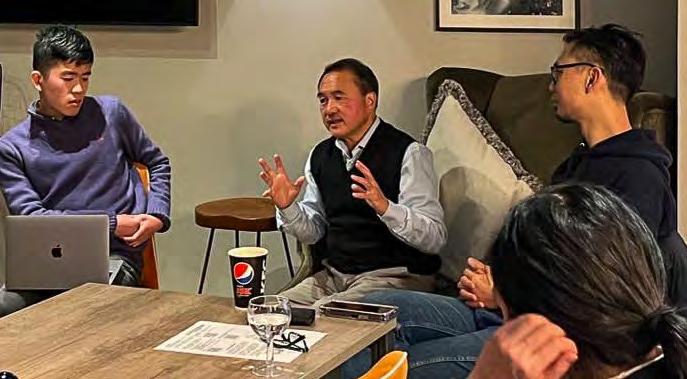
Lee meets South London’s Hong Kong community
The café is near the Houses of Parliament, where Lee often meets MPs. The former legislator says he never misses a chance to network in Westminster, as few other Hongkongers enjoy his privileged access.
“It would be very sad if I didn’t attend a meeting and therefore no Hongkonger was present,” he says.
Vote4HK’s lobbying campaign targets swing constituencies with a high population of Hong Kong emigrants, such as Sutton and Reading West, to put their concerns about the UK’s policy towards China and Hong Kong on the political agenda.
Lee says that if they are to have any hope of influencing politicians, Hongkongers need to show that they are a unified electoral constituency: “In short, how many ballots do you have?” he asks.
Despite being the oldest on the campaign’s committee, Lee’s opinion holds as much weight as the young activists he works with.
Ian Ng, 21, another committee member, calls Lee “Ah Tat”, an informal form of his name that denotes a peer relationship in Chinese. Ng is from the more radical localist camp of Hong Kong politics which has had factional conflicts with the more moderate Democratic Party, but he has no problem working with Lee, finding him “sincere” and feeling like they are equals as colleagues.
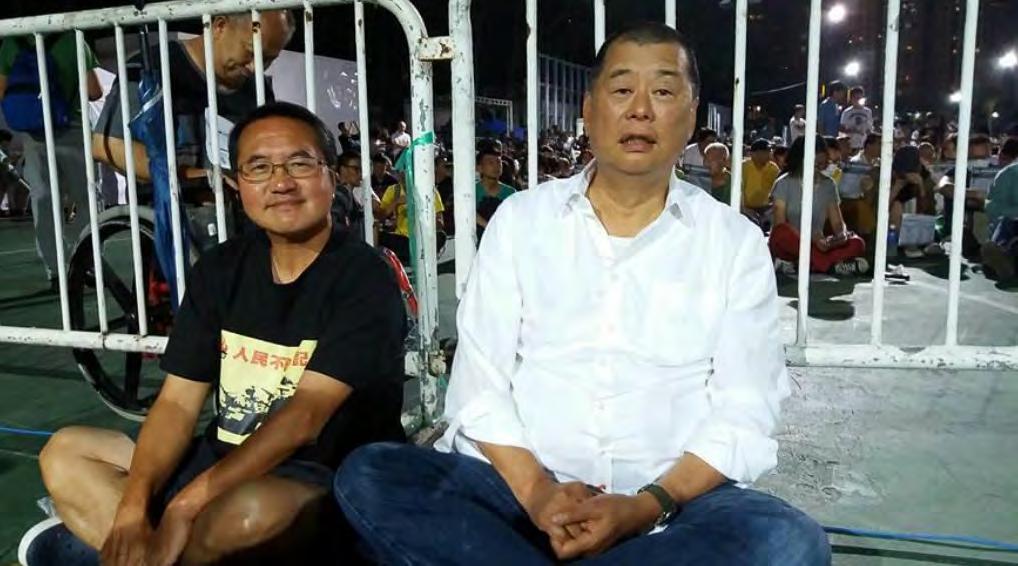
Lee says the most important thing is not to divide the generations, with the young bringing enthusiasm and the elders contributing their experience.
As a protestor in his 30s, he was himself criticised by the city’s older politicians after he heckled then-Foreign Secretary Sir Geoffrey Howe, who had refused to grant millions of British subjects in Hong Kong the right to live in the UK after the brutal crackdown on pro-democracy protesters in Beijing’s Tiananmen Square in 1989.
“I might not live to see it, but I believe your generation will”
This year Lee will mark the 10th anniversary of Hong Kong’s pro-democracy Umbrella Movement away from his hometown. As one of the nine leaders, Lee was convicted of public nuisance charges and received a suspended jail sentence. Today, five of them have either been jailed or forced to flee their homes.
“To engage in politics under an authoritarian regime,” Lee explains, “you have to get mentally prepared”.
Citing the example of the struggle for women’s rights, he believes democratic progress may seem painstakingly slow or non-existent – but that sudden breakthroughs do occur.
“I might not live to see it,” he says, “but I believe your generation will”.
At an event in April attended by MPs and various Hong Kong community groups in the UK, he told the young people: “You don’t need to prove to me that democracy will arrive. If you know where I’m buried, just come and tell me, ‘Uncle Tat, Hong Kong is democratic now.’ That will make me smile even in the grave.”
Courtesy of Ian Ng
With pro-democracy activist Jimmy Lai at Tianenmen Square vigil, Hong Kong
VOICES 51
Courtesy of Lee Wing-tat

Folk the system
Singer Beans on Toast on writing political songs in volatile times
Calum Taylor
It’s not easy writing songs about politics, as folk singer Beans on Toast knows well. He’s taking a break from it this year.
“I’m literally in the studio the day after tomorrow recording the next record,” he says, one breezy May afternoon. “Not wanting to get too bogged down in the election cycle, I’ve written a bunch of pagan hymns. So it’s ignoring politics completely and just going back to the wild.”
This marks a departure for the Essex-born singer-songwriter. He’s built a reputation over the last 15 years for his distinctive brand of light-hearted, politically conscious folk music. With an acoustic guitar and his trademark optimism, he waxes lyrical about topics such as love, politics, and escapism into the jacuzzi.
The political songs came early. His first album, Standing on a Chair, released in 2009, features a track called “Thanks for Fucking Up the World for Us” – essentially, he says, “me having a moan about George Bush and Tony Blair, and how bad they were and how it’s got to get better.” He pauses for breath. “We didn’t know how good we had it, almost.”
Since then Beans’ work has juggled political hot potatoes as varied as climate, Brexit, land ownership, protest, conspiracy theories, and artificial intelligence. The way his songs tackle social issues with humour and frankness is reminiscent of singers like John Prine or Billy Bragg.
Beans on Toast, real name Jay McAllister, started his music career as a teenager in the late nineties with the grunge band Jellicoe. When they disbanded, McAllister gave up singing in a faux-Seattle accent and started the Beans on Toast project.
The name, a tribute to the British delicacy, comes from McAllister’s desire to re-embrace his roots. “I wanted to be more myself,” he says, full of beans. “I’d write songs in an English accent, and I guess I wanted a name that was going to portray that Englishness as well.”
Beans’ output is prolific, a consequence of releasing an album every year since 2009 on his birthday, 1 December. Across those 15 years, he has learned a thing or two about political songwriting.
“I suppose that’s the blessing and the curse of writing about current events”
“If you’re going to write songs about current events,” he says, “you’ve got to be open to the fact that they’re going to have a short shelf life.”
Such as when he wrote a song called “2016”. He remembers soon after thinking: “Okay, this has got six months on it.”
“There’s another song, ‘On & On’,” he continues. “It’s the best song to finish a set on. But the second verse says the lines, ‘There’s less war now than ever before, less disease and less famine.’ And the truth is, since I
wrote it, there’s been more disease, more war, and more famine. So it’s like the words feel pretty fucking clunky coming out my mouth now, and I feel the need to explain myself.”
“I suppose that’s the blessing and the curse of writing about current events,” he muses. “They go out of date quickly. But then at the same time, you can look back and feel how you felt about stuff in the past.”
In the third verse of “On & On” Beans describes how “children marching in the streets” give him “hope”. I ask whether this is still the case. “Yeah,” he says, his optimism barely twitching. “I have hope in the children of the future.”
His advice to young people is to “follow your heart” but also “be careful whose advice you take”.
One difficulty when mixing politics and music is the risk of sounding preachy. “I certainly don’t claim to be right on any of the subjects,” Beans makes clear. “I try not to push anything down anybody’s throat.”
Throughout his music, Beans on Toast showcases a knack for balancing the political and the personable. “I’d like to see my songs as like a celebration, really, of life,” he reflects. “But through that celebration you can’t be naive. So, you know, I’m happy to criticise the world around us, but only ever from a place of love without sounding too corny.”

This is Now Agency
This is Now Agency Beans on Toast performing on stage 52
Jay McAllister aka Beans on Toast
A view from West Jerusalem
One young Israeli’s fight for Palestinian rights
Eliana Nunes
Noa is speaking from West Jerusalem, her gentle voice slightly muffled by the melodies of Shabbat prayers in the background.
“If you understand that Israel is conducting a genocide,” she says, “then it’s the worst time in the world to be an Israeli”. For now, she has put aside any questions about what it means to be an Israeli, saying simply: “there’s an urgent state and you have to act”.
Noa is a 24-year-old self-described antiZionist peace activist from Israel. She is a member of Free Jerusalem, an activist group focused on “apartheid resistance”. Before the war, this group of West Jerusalemites supported communities in East Jerusalem resisting home evictions and demolitions by the Israeli government.
Since October last year, their efforts have shifted towards campaigning against the current war in Gaza. “It just seems to get worse and even more cruel,” she says. “And I keep feeling angrier and more powerless.” She feels shame at her government’s actions.
Days before our conversation, Israeli prime minister Benjamin Netanyahu had rejected a hostage deal with Hamas and the prospect of a ceasefire. At this point in mid-May, reports indicated over 34,971 Palestinians and over 1,200 Israelis and foreign nationals have been killed, with many more injured.
Alongside Free Jerusalem, which Noa calls “reactionary” in its activism (protests, demonstrations, road blockages), she also takes part in so-called “protective presence”. This involves visiting Palestinian communities in the West Bank’s Jordan Valley and Masafer Yatta area and documenting any abuse that Palestinians suffer from the Israeli army and “extreme settlers”.
“If there are Israeli activists,” she says, “there’s less of a chance that the settlers will strike that village and build settlements”. Though there are significantly fewer activists in Jerusalem than in Tel Aviv – Israel’s liberal epicentre – Noa explains how their proximity to the West Bank makes them “the most radical”.
“From my neighbourhood,” she says, “if I cross the road and look out, the occupation is right there”. Since 1967, East Jerusalem and
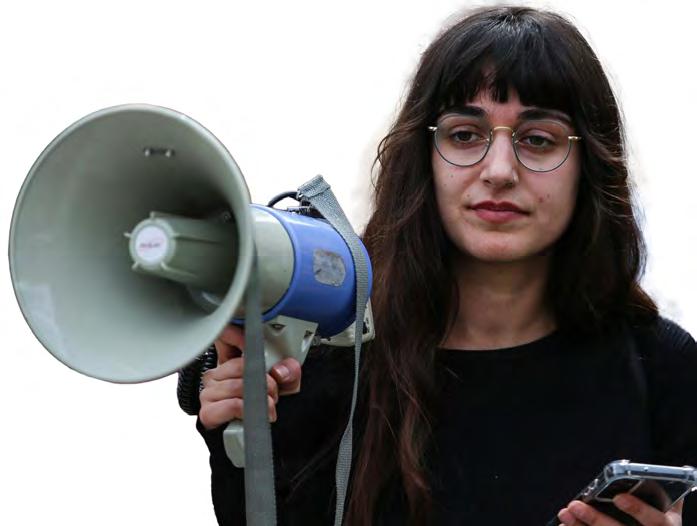
the West Bank have been occupied by the Israeli military. “Jerusalem is perhaps the only city in Israel where you cannot ignore the occupation,” Noa explains. “Half of the people in the city don’t have citizenship.”
Noa’s mother is an activist too, though their approaches differ. For Noa, “being an activist means acting in the field”. Her mother, a journalist and editor of a Hebrew magazine, prefers writing about marginalised Palestinian and Israeli communities.
“If I cross the road and look out, the occupation is right there”
Growing up, Noa was always conscious of “a lot of racism towards Palestinians,” but she never expected the divisions that have surfaced in her country over the past seven months.
“Before the war, I at least thought that the people living here – that we as Israelis – have some solidarity with each other,” Noa says. “But now we’ve reached the point that people are actually willing to sacrifice their own
hostages to continue this massacre in Gaza.”
Noa finds herself in a minority in more ways than one. She believes in a one-state solution to the conflict: a single secular Israeli state where citizens have equal rights. A poll by the Geneva Initiative earlier this year found that just 2.9 per cent of Israelis favoured a type of one-state solution, with no mention of such a state’s religious status.
One might assume that openly holding such views is isolating and even scary for Noa and her family, but Noa feels “powerful” within her communities.
“As long as you’re Israeli and Jewish, there’s a limited number of repercussions, even if you speak very boldly,” she says. She compares her position to that of Nadera Shalhoub-Kevorkian, the Palestinian professor at Hebrew University – where Noa herself studied – who was arrested earlier this year after accusing Israel of conducting a genocide.
Noa sees herself as an optimistic person. Even so, it seems difficult to find optimism with all that is happening near her.
“I’ve stopped thinking about questions about my identity as an Israeli,” she says. Noa pauses for a moment. “I think these questions will come when I’m no longer in Israel.”
VOICES 53
Courtesy of Noa
Israeli activist, Noa
Radical hope
Noga Levy-Rapoport on what youth can bring to activism
Dara Zheleva
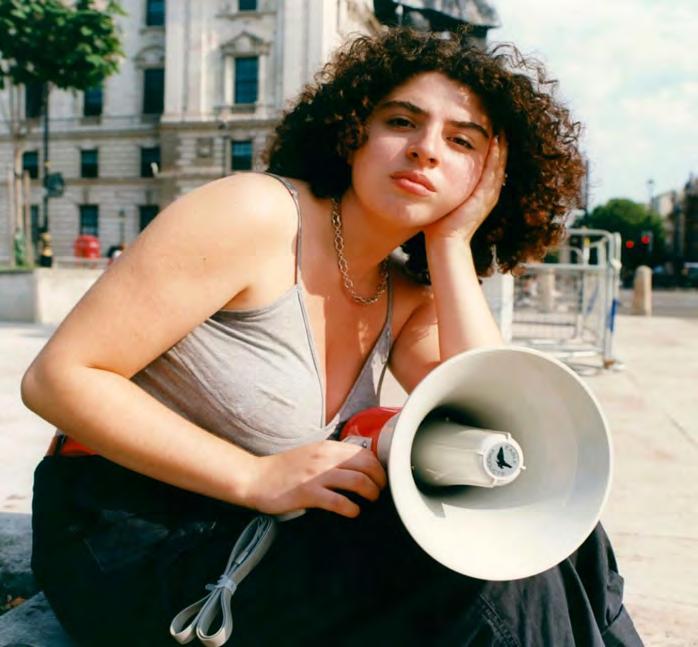
As a 17-year-old, Noga LevyRapoport was very clear about what they wanted to do with their life: “I wanted to be an opera singer and just do music my whole life.” Rapoport is now 22, and whilst still doing music, they are much better known for their work as a climate activist, speaker, and organiser of British climate strikes at the UK Student Climate Network.
In February 2019, Rapoport joined London’s first climate strike march, when pupils from across the UK skipped school to demand stronger action on climate change. They soon threw themselves into climate activism.
“I reached out to the original organisers and expressed my desire to be more involved,” they explain. “They welcomed me with open arms, and I quickly found myself in the midst of planning and organising subsequent climate strikes.”
In September 2019, Rapoport organised London’s largest climate strike. The next month, London’s Evening Standard named
them as one of London’s most influential people of 2019. In 2022, they delivered their own TED talk addressing the climate crisis and emphasising the crucial role of young people in preserving our planet.
Reflecting on their activism, they acknowledge their parents for encouraging them to speak up about their beliefs: “I was very lucky to grow up with very political parents, with newspapers on the breakfast table and the dinner table. That has really been ingrained in my life.”
“There was a time in my life when I didn’t think that [being politically engaged] was possible,” Rapoport says, “but the more I engaged in politics, the more I found a community, the braver I became, and the more I knew I would be supported no matter what I did.”
Nowadays, Rapoport is most involved with the Make Freedom Ring Collective, which organises fundraising classical music concerts to support humanitarian aid in Gaza and the occupied Palestinian territories. “This work is deeply
meaningful to me because it combines my passion for music with my commitment to social justice,” says Rapoport.
For Rapoport, youth engagement in politics is a fundamental aspect of civic life: “Politics isn’t a privilege, it’s a part of our lives. My aspiration for the future is that young people see that because I think that is one of the strongest tools that they have.”
At the core of Rapoport’s beliefs is the idea of radical hope: “We need to believe that a better world is already possible. We must imagine that everything will be solved, otherwise the noise around us will drag us down.”
“Politics isn’t a privilege, it’s a part of our lives”
Rapoport’s vision of the future is certainly optimistic, if not utopian: “I envision a future with a robust renewable sector providing secure, well-paid jobs, extensive public infrastructure, especially in neglected rural areas, and a nationalised, affordable, or free transport system. Our healthcare needs a significant investment to rejuvenate the NHS, and our education system should place political education at its heart.”
Rapoport’s message to young people who want to get involved in activism is just to make a start: “Don’t be afraid to try something just because it might not be perfect or groundbreaking. Activism doesn’t have to be revolutionary; it can build on the work of the past.”
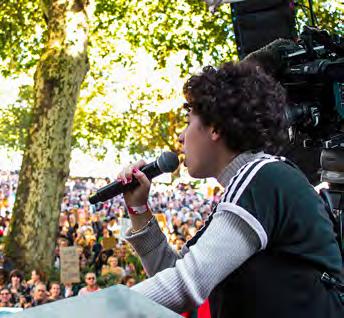
54
Climate activist Noga Levy-Rapoport
Courtesy of Noga Levy-Rapoport
Rapoport speaking at a rally
Courtesy of Noga Levy-Rapoport


Called to climate action
Giorgio Brizio on life as a young activist
Lara Lovric
Giorgio Brizio is never at rest. As a 22-year-old Italian student activist, he is always running from meetings to protests to book presentations. During our Zoom interview, he jogs through Milan central station, trying to catch a train to Padova after two hours of sleep.
Today he is attending two presentations for his book: For many years from tomorrow: 27 European activists on climate, peace and people’s rights. The collection of 27 essays, each written by an activist from a different member state of the European Union, was published in Italian and English in May, deliberately timed for just before the European elections.
The book was born out of Brizio’s worry that the increasing presence of defence on the European political agenda would overshadow the global issues that “threaten our whole existence”.
He sees this year’s EU elections as a “watershed moment” because of the 2030 climate target plan. He is not optimistic: “The climate crisis takes the first place on the agenda of young people, but not of political parties, so I’m not expecting these elections to go very well.” In fact, far-right parties that want to roll back on climate change measures were successful.
Brizio did not want to write a manifesto, he says, but rather gather a diverse set of voices that are passionate and knowledgeable about the climate crisis, peace, and human rights to share a collective idea for the future
of Europe.
It’s a future in which fossil fuels are replaced with renewable energy sources, socially conservative policies with values of equality, freedom, and human dignity, and hostility towards migrants with solidarity. The latter, Brizio says, is especially close to his heart.
He remembers visiting Marina di Modica, his grandfather’s hometown in the south of Sicily and one of the places in Europe worst affected by the migrant crisis. “Even if you’re not interested in human rights [or] in migration”, he says, simply being in a boat in the south of Italy makes you “scared of finding bodies and clothes instead of jellyfish”.

This fear, anger, and anxiety acted as the initial catalyst for his activism. He started following migration campaigns, moved to Berlin at 17 to study, and returned to Italy “insatiably curious, even about simple things”.
Brizio began attending exhibitions and events without any expectations. One of them was a climate protest on the main square of Turin that he stumbled upon on Instagram in February 2019. He chuckles when he tells me he brought a dozen friends with him, only to realise there were very few people involved. “We were standing under the rain,” he recalls. “I felt guilty and responsible, so I hoped that we had mistaken the day, the hour, the square, but that wasn’t the case.”
In reality, they were there at the inception of a new wave of the youth climate movement. “A few people there were singing ‘con Greta per il

pianeta’, which means ‘with Greta for the planet’, and I was asking myself ‘Who is this Greta?’” Brizio then discovered Thunberg’s speech at the UN Climate Action Summit (COP24) in Poland and for the first time understood the gravity of the threat that the climate crisis presents to human beings.
“It hit me that climate change is a mother crisis of all the others,” he says. “It’s the primary issue we need to fix. Because if we don’t, we won’t be able to fix anything.”
With that mindset, Brizio became one of the leaders of the climate movement Fridays for Future in Turin and published his first book about climate migrations, We’re not all on the same boat, in May 2021. He graduated in International development and cooperation sciences in Turin and is currently deciding which master’s program to apply to. “I’d just like to do something related to climate and social issues,” he smiles.
Five years after beginning his journey as an activist, Brizio says he sometimes still asks himself why he does it. “It’s because I genuinely enjoy it. And because I think the most powerful and meaningful thing in life is to do things for other people.”
Brizio (left) hangs from a lamppost at a protest
Brizio reclines on a bed with his new book, Non siamo tutti sulla stessa
Gaia Benedetti
Courtesy,Giorgio Brizio
55
Brizio speaks at a climate event
Tanya Park, a Lib Dem councillor for Eastleigh North in Hampshire, is the first trans person many of her constituents have ever met.
“They will have preconceived ideas about what being trans is depending on what news they watch and who they follow on social media,” she says. “But then they meet me, and they see that I’m just a normal human being with my own foibles, my own passions, and my own faults.”
Park knew she was trans from a young age, but faced challenges growing up in a small village in Suffolk without the vocabulary or societal support to understand her feelings. “I spent most of my 20s running away from the whole situation,” she says, reflecting on the time she spent moving around and working dead-end jobs to escape her identity. At one point, she even ended up on the streets.
These experiences showed her the need for a support system for the most vulnerable. “I was a trustee for a local homelessness charity that had helped me when I was homeless,” she says proudly.
The turning point came after the death of her wife. Forced to look inward while tackling her emotions, she embraced her true identity and transitioned at 40.
Park’s 2021 campaign to be elected as a local councillor did not focus on her gender identity, but instead on her role as a representative of her community. She had been a volunteer with Samaritans, during which she talked people out of ending their lives.
“They elected me to represent them, not necessarily to shout about who I am,” she
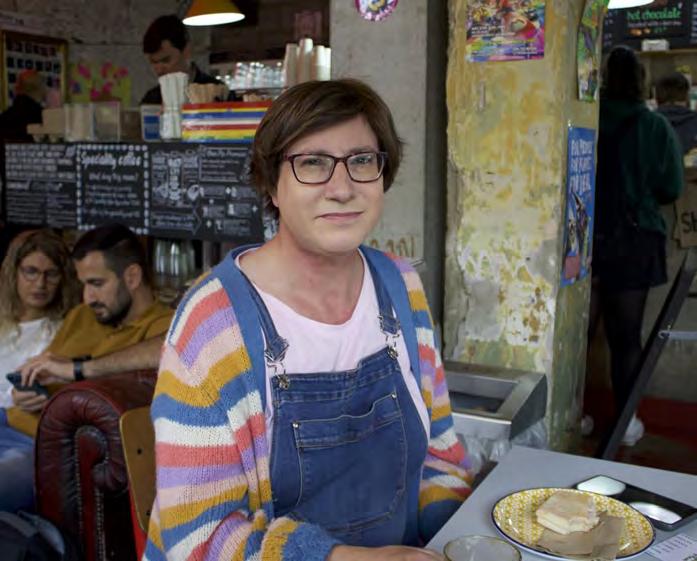
Parklife
Tanya Park’s journey as a transgender councillor
Heleena Panicker
Courtesy of Tanya Park

says. “But people do know about it, and it’s not a secret,” she adds.
Although Park has experienced minor instances of transphobia on social media, her community and party have been overwhelmingly supportive. Her reelection in the Eastleigh local election on 2 May only proves that her constituents stand behind her as a councillor.
Frustration as a fervent Remainer during the 2019 Brexit debates propelled Park from political activism into formal politics. She joined the Liberal Democrats to channel her energy into tangible change. “I got fed up of shouting at the television,” she says with a laugh.
Park is always looking for ways to make the lives of others better, be it in politics or her varied charity work. “One of my favourite things I do as a councillor is being able to solve residents’ problems,” she says. “They will contact me and say X is not happening and I will go at it,” she adds.
Park encourages people from marginalised groups to enter politics. “A real problem with local government is that it is very male, pale and stale,” she says. “The more representation we get – be that people of colour, disabled
people, women, LGBT – then the better.”
She suggests they go to their local parties and get involved by canvassing, putting leaflets through doors, and building up experience on the ground – just how she started.
“Most local parties are finding it really hard to find candidates because nobody wants to step up and do these things anymore because of the amount of vitriol and hate that gets talked about on social media,” she explains. “So they will be happy to help you if you want to stand for election,” she adds.
“I spent most of my twenties running away from the whole situation”
Park believes that the value of local government should not be overlooked. She says, “Everybody thinks that being an MP wields the greatest political power, but locally, you can really effect change.”
56
Heleena Panicker

Pride in London
This year in London, the mammoth parade will take place on 29 June, advocating for the rights of LGBTQIA+ community.
jackal
















Culture
Making politics ‘sexy’
The Dutch theatre group getting young people to vote
Mia Jeronimus



 Courtesy of De Kiesmannen
Courtesy of De Kiesmannen
Jochem Jordaan looks for “a twinkle in people’s eyes” at the end of his company’s shows, “triggered by the fact that they might now want to go out and vote”.
Jordaan founded De Kiesmannen (“The Electors”), almost by accident with his friend Dylan Ahern when they were both in their early 20s.
“We started in 2017 because Brexit just took place and Trump was elected president in the US, and a lot of data showed that young people did not turn out to the ballot box.”
Dutch general elections were imminent. “Dylan and I thought: we have so many political parties in the Netherlands. A lot of young people are unaware of what choices they have when it comes to voting and what the political parties stand for.”
“Young people are unaware of what choices they have”
The pair put on an informal event to educate about “the three Fs: friends, family, and fools” which they advertised on Facebook. 450 people turned up.
The largest theatre in the north of the Netherlands caught wind of the event and asked if they would perform in Groningen in two days.
Neither Jordaan nor Ahern have any acting or stage-writing experience. They met during a master’s course in political science at the University of Amsterdam and both hosted interviews on Room for Discussion, the university’s high-profile political interview platform.
This training quashed any stage fright, but did not fill them with confidence that
the show in Groningen would be a success. They were surprised by a theatre full of young faces.
Grants from the Dutch government and the European Commission helped professionalise their activities, but De Kiesmannen retains its playful character.
Sarah Bronkhorst, a journalist, attended one of their shows as a student in Amsterdam in 2019: “They have this great gift of being able to make politics very sexy.”
De Kiesmannen’s shows compare different parties’ programmes and introduce political leaders through performance. Their most recent show did so in the style of Eurovision. They have also parodied the reality TV show First Dates, “because elections are kind of the First Dates as well, in which the citizen is looking for a political match”.
In May, they tried a new format: merging nightlife with political discussion. At a club in Amsterdam, open from 8 pm to 5 am, revellers could move between a variety of rooms: some for partying, others hosting late-night talks with activists speaking on the major themes of June’s European elections.
The average attendee age was 23, a result of the fact that De Kiesmannen targets firstand second-time voters. “Young people have at least 50 to 20 per cent less voter turnout compared to the average,” says Jordaan. “And they also are more likely to fall for authoritarianism.”
The election of far-right politician Geert Wilders’ Party for Freedom in November illustrates Jordaan’s view: “He got more votes from the young than the old.”
According to a report by the European Commission, Dutch youth are also increasingly involved in activism, but less likely to vote in elections. “That is exciting, but I also find that worrying. Voting is still the most impactful part of democracy,” says Jordaan.
De Kiesmannen has an educational programme targeting schools with students

who feel most ostracised by the political establishment and are less likely to believe in the impact of their vote. This includes schools with a high number of migrants.
“The feedback we’re receiving shows us that these people are not excited for us to come. [But] after an hour, when they’re seeing we’re chill, we are just encouraging them to talk about politics and listen to what their thoughts and worries are, [then] they’re actually excited to be heard.”
Shows, club nights, and educational programmes combined, De Kiesmannen are reaching tens of thousands of people. Jordaan says that just the day previously, four of them recognised him on the street.
After stumbling across a winning formula to engage young voters, De Kiesmannen could serve as a template for other countries struggling to encourage youth to the ballot box.
 Courtesy of De Kiesmannen
Courtesy of De Kiesmannen
Attendees discussing protest themes in the club’s late night talk
Courtesy of De Kiesmannen
Courtesy of De Kiesmannen
Attendees discussing protest themes in the club’s late night talk
CULTURE 61
An attendee writing a protest slogan
Hit the notes, get the votes
What’s the role of music in 2024’s elections around the world
Justine Noble
In Venezuela’s latest reality show, contestants are pulling out all the stops. In front of a panel of five judges, singers perform before flashing LED lights, enthusiastic back-up dancers and passionate instrumentalists. Their impassioned performances have a singular aim – to impress the man whose infamous name is called out by the chorus as a participant salsa dances across the stage: “Maduro”.
Once per week, Venezuelan state TV broadcasts Factor M, a programme in the style of The X Factor. The show’s purpose: to choose the song for current president Nicholás Maduro’s upcoming election campaign. The first episode aired in April, and the final one is scheduled to take place shortly before campaigning starts in June.
Maduro is widely regarded as a dictator who oversees rigged elections
to remain in power. His human rights abuses and the soaring inflation caused by his mismanagement prompted one of the worst refugee crises of recent times when hundreds of thousands of people fled across Venezuela’s borders in 2019. However, their struggle is overshadowed as Factor M places Maduro in the spotlight.
One of the competition’s judges, reggaeton and salsa artist Xuxo, has been writing music to back Maduro since 2017. To him, it’s necessary for galvanising voters.
“Including music in political campaigns is very important,” says Xuxo, one of many in Venezuelan society who does not criticise Maduro, “because music moves the masses. With music that’s well made, messages are able to be passed on to the people quickly. People are able to get motivated, enjoy the music, dance to the
music and people get inspired to do things through music.”
“It can sort of buoy up both the supporters but also the campaigners”
While Venezuela devoting an entire TV show to finding the perfect campaign song is a global first, music is a key feature of 2024’s elections across continents. From India to South Africa to the United States, major political parties have been making use of mainstream popular tunes as well as original songs.

62
Xuxo (second from left) with the other Factor M judges and the show’s presenter
Courtesy of Xuxo

According to Dr Adam Behr, senior lecturer in contemporary and popular music at Newcastle University, the purpose of music during election periods is complex.
“What it does do is two things,” he explains. “If it’s successful, it can sort of buoy up both the supporters but also the campaigners: not just the candidates themselves – people that are working for them. There’s a sort of nexus of influences.”
When UK Conservative prime minister
Rishi Sunak recently announced the upcoming general election, pro-EU campaigner Steve Bray made a political point by blasting the D:Ream song “Things Can Only Get Better” – a song widely associated with Tony Blair’s landslide Labour victory in 1997.
Behr also emphasises that music as a campaign tactic is a historic one, particularly in the context of the United States. “Campaign songs go way back to the beginning of American democracy.
There are campaign songs about George Washington and onwards really.”
Behr identifies jazz singer Al Jolson’s song “You’re the Man for Us”, endorsing Republican candidate Warren Harding, as a watershed in political music. Since then, many pop songs have enjoyed a second life as the soundtrack to an election – such as with Bill Clinton’s use of Fleetwood Mac’s “Don’t Stop” in the nineties.
When artists’ politics do not align with the candidate using their music, however, it can stir up controversy. After Donald Trump played “Nothing Compares 2 U” by Sinéad O’Connor at a rally in March, her estate asked the former president to stop using her work.
Campaign music has also proved contentious in Indian elections. “Hamare Modi Ji”, one of over 150 songs written to promote the incumbent Narandra Modi’s Bharatiya Janata Party, caused a spat on Twitter/X when opponents to the party started replacing “Modi” with “Feku”, a derogatory Hindi word for someone who makes empty promises.
Haripriyaa Bharggav, who wrote the song, regards this online flare-up as “an unfortunate event that stems from a lack of understanding and respect for differing political perspectives”.
There’s certainly no room for different viewpoints on Factor M. With the final taking place this month, Xuxo wants a contestant with genuine support for Maduro. It seems that while music can be a powerful mode of political expression, it can also pay to sing a certain song.
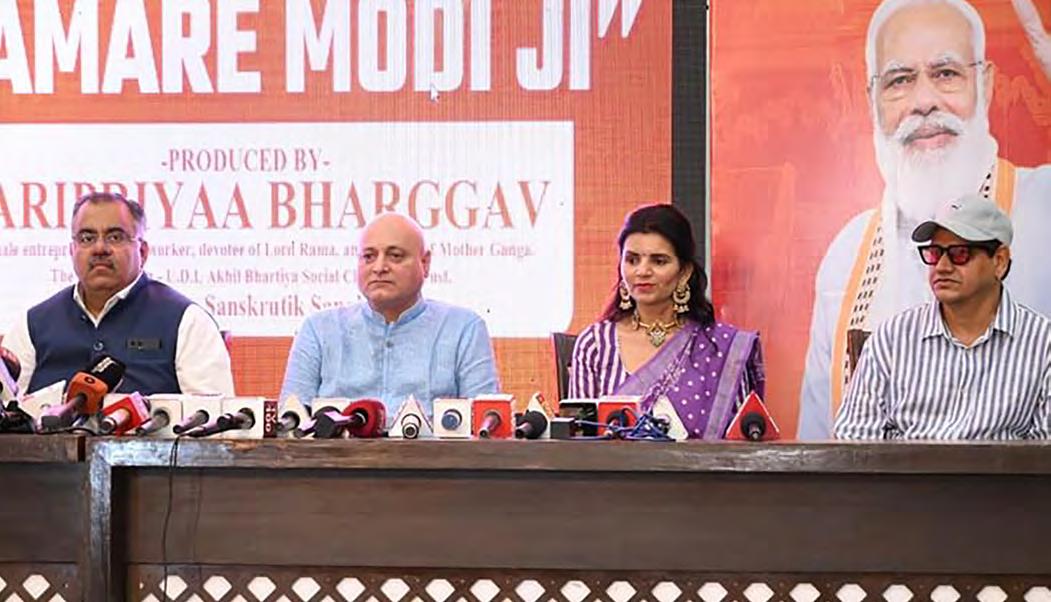
CULTURE
63
Xuxo
Xuxo, a judge on Factor M
Haripriyaa Bharggav (third from left) at the launch of her song, “Hamare Modi Ji”
Courtesy of Xuxo
Courtesy Haripriyaa Bharggav
of Emma Hanny
Courtesy
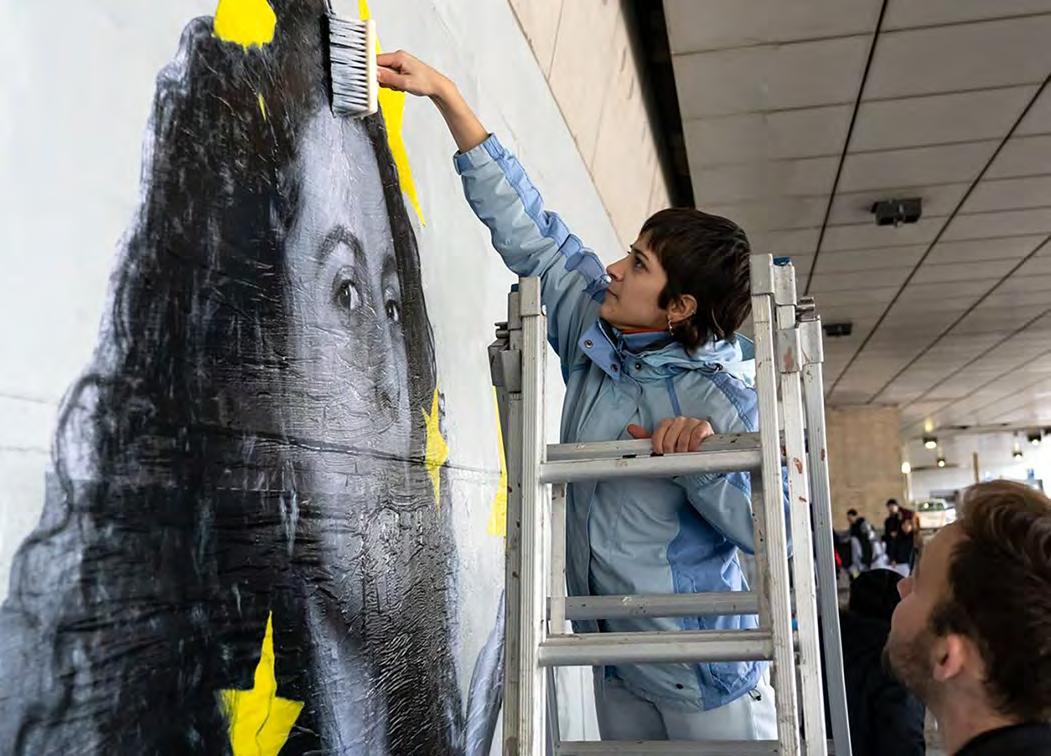
Pop the vote!
European artists encourage engagement in the EU elections
Clara Passarinho, a young theatre director and co-founder of the Portuguese NGO Associação Da Minha Rua, remembers being told while growing up that young people are the citizens of the future. She rejects this notion. “Young people are the citizens of the present because we are impacting society today,” says Passarinho.
She warns that the media is reinforcing a dangerous and inaccurate narrative that claims younger generations are not engaging with the formal political processes in their countries. “If they say we don’t engage with politics, and if we don’t see any young people engaging, we will start believing it.”
Close to 51 per cent of voters cast their ballots in the 2019 European election, the first time there was an upswing in the declining pattern of voter turnout since the first European election in 1979. While this is the average across nations, some countries had significantly lower turnouts, such as 24.74 per cent in Slovakia. Passarinho’s country, Portugal, had a 30.75 per cent turnout.
Pop the Vote! Culture on the Ballot is a campaign launched by Culture Action Europe and sponsored by the EU. It tries to address the depressed voter turnout by encouraging
engagement with the help of young activists and artists such as Passarinho from the 14 EU countries with the lowest voter turnout.
The project’s manager Maya Weisinger says the campaign’s mission is to bolster these young artists’ existing work and give them “support so that their voices are amplified, able to reach more people and able to work on their artistic practice through this opportunity.”
Weisinger believes the main reason for the low EU voter turnout is that people struggle to see the impact the EU has on their daily lives. “I think it’s very difficult to define, when we start talking about Europe and European values, because of the very rich, diverse histories,” she says.
“Young people are the citizens of the present because we impact our society today”
 Lilian Crastan
Lilian Crastan
64
Emma Hanny working on a piece
She also thinks the EU’s language is too institutional, distancing the public from the issues that affect them.
To try to narrow that distance, the artists and activists recruited for the project attended a week of training in Brussels on “artivism” and how to engage their communities in conversations about the EU. They were then tasked with hosting two events in their home countries.
Emma Hanny, an Italian artist involved in the project, said that the training “was really special, seeing 44 artists working on the same themes and the same problems but in such different ways. I was a photographer and then there were people doing dance, opera.”
“I don’t think we are supposed to be experts in politics to talk about it”
Hanny began her activism career by photographing the start of the Fridays for Future campaign as a student in Holland. She thinks photography is a strong medium for activism because “it is a universal language, no words needed,” adding that for her, the way to reach people is through “feelings – art works with feeling.”
She hosted a workshop for high school students, some of whom were eligible to vote in the European elections. They were asked to
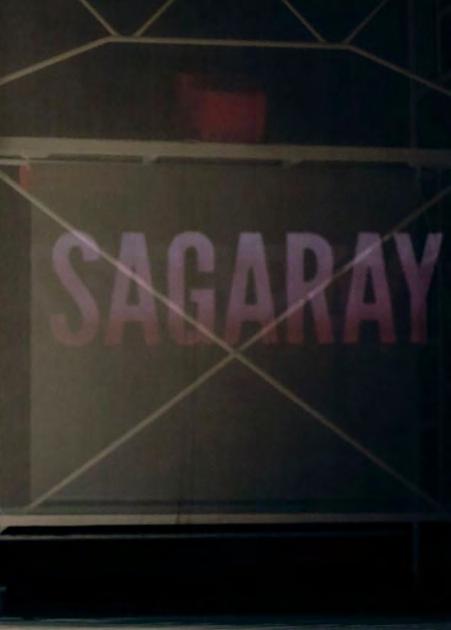
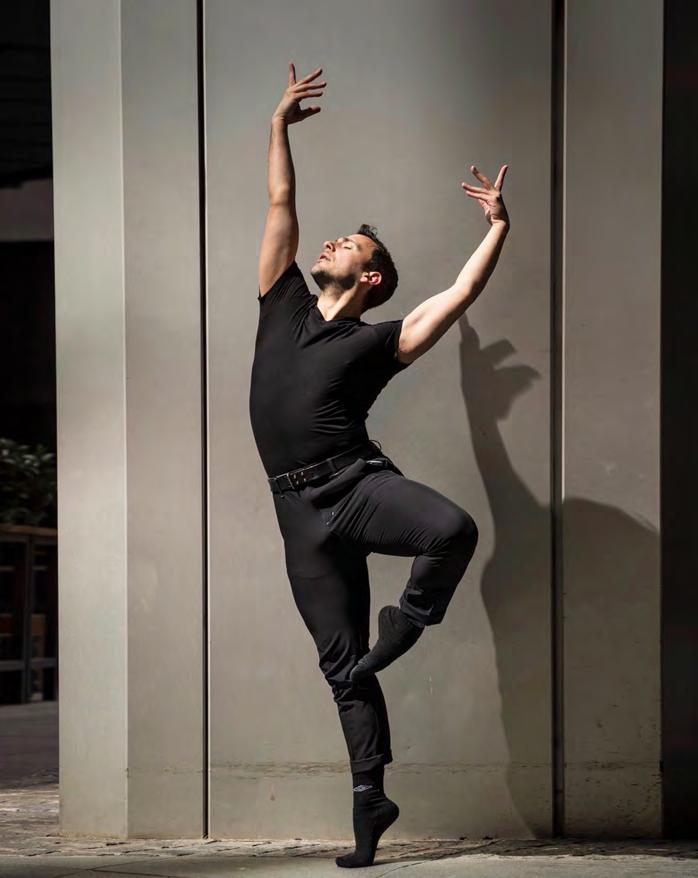
submit a photograph for exhibition addressing the question “How does Europe impact your life?”
Passarinho is also motivated by the belief that culture can educate people about the EU. She thinks art can bring clarity to intangible concepts through giving them a visual form.
“It’s very easy to see where culture is, but it’s not easy to see where the European Union is,” she says.
Passararinho recalls that after one of her workshops, some grandmothers came up to her and exclaimed: “I didn’t know that the European Union has had these impacts on our lives!”
Stefanos Dimoulas, one of Pop the Vote’s activists from Greece, also speaks of experiencing the impact of his work firsthand. Dimoulas has advocated for LGBTQIA+ rights through dance, public speaking and founding a charity. He was the youngest Greek judge on Dancing with the Stars and has also given a TEDx talk. Greek politicians praised his efforts for contributing to the Greek parliament’s passing of marriage equality and adoption rights.
“I didn’t have to become a politician to play a
This is the mantra at the centre of Pop the Vote’s mission. The campaign’s impact has exceeded Weisinger’s initial expectation: “It’s not always guaranteed with such a large group, but it was really amazing to see how [the activists] were connecting their ongoing work in their own communities to this larger scope at a European level.”
“I don’t think we are supposed to be experts in politics to talk about it.”
Weisinger says she cannot measure the extent to which the campaign has led to more votes at the ballot box but she is proud that the activists have been able to facilitate “crucial conversations at times where it’s been difficult to.”
vital role, I did it as an artist,” says Dimoulas.
Stefanos Dimoulas strikes a pose
Clara Passarinho in performance
Andy Houghton
Helena Tomás
65 CULTURE

Playing president
Video games simulate the rough and tumble of politics to engage youth
Spenser Surerus
You are the president. Not the president of the United States, France or South Africa, but of a country in Latin America. Its name is not important. After three and a half years in power, you are approaching potential re-election. You have survived a coup attempt, corruption scandals, and inflationary pressures. Your opponent has just launched a series of adverts attacking you. Your poll
numbers are dropping by the day and your electoral prospects are hanging by a thread. A media executive approaches your team, saying he can boost your popularity and ensure re-election through a coordinated fake news campaign. What do you do? Swipe left to dismiss him, swipe right to agree on a deal. Your bus has arrived, so you slip your phone into your pocket and forgo the decision – and
your political future – for a few more hours. You were playing Senhor Presidente, a mobile game that simulates the life of a Latin American president. Your goal is to remain in office for two full terms.
The game was created by Eric Anderson, a Brazilian video game developer, and was released a month before Jair Bolsonaro’s election in 2018. Anderson says that he wanted to create
Stardock 66
Donald Trump in The Political Machine 2020 video game
a game that reflected the drama of Brazilian politics and the difficulty of being president. With the impeachment and imprisonment of successive presidents, he, like the rest of Brazil, had been “breathing politics for years,” and wanted to channel that interest into a game.
Simulation games have grown in popularity and scope since the release of the Sims. Today, you can find video games that simulate experiences as varied as managing a restaurant, washing cars or being a goat. As a sub-genre, political simulation games explore various aspects of political life. From balancing government budgets to running election campaigns and creating government policy, these games immerse players in the dynamics of a given political system.
The games vary in their faithfulness to real-world political processes, but all offer a different way to engage with politics. Daniele Battista, a research fellow in cultural and communicative processes, views these games “as powerful tools not only for educating those who are already interested in politics but also for attracting and engaging people who might not have an initial interest”. While Senhor Presidente lifts from past political history, it does not attempt to be an exhaustively realistic portrayal of presidential rule.
“Politics is complicated,” says Anderson.
“Games have the opportunity to show alternative perspectives”
“You have to simplify things to get people to engage with the game. It’s often a trade-off between mass appeal and realism.” Anderson and his team attempted to balance jokey elements – a senator proposing legislation for a Purge-like killing day – with realistic political decision-making.
The formula proved a success. With limited marketing, it had tens of thousands of downloads from the Google Play Store. The
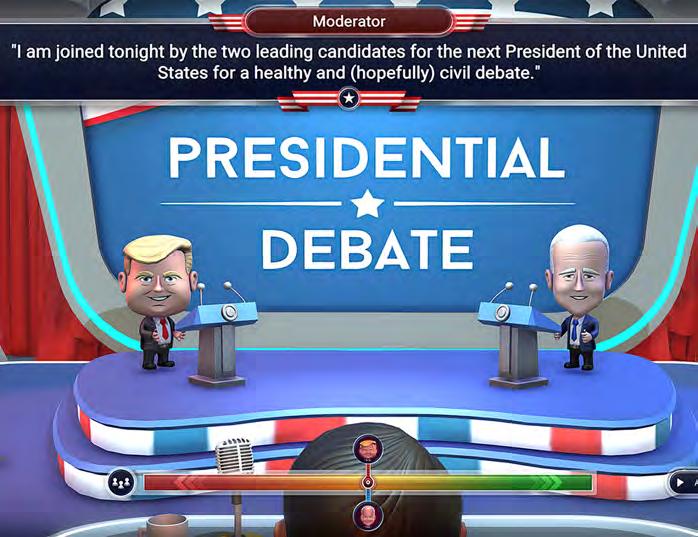
was re-released before the 2022 Brazilian general election and, with no additional advertising, was downloaded thousands of times. For Anderson, this shows the appetite for political video games during a heightened political debate.
The Political Process, a game that simulates US electoral politics, has taken a different approach. What began as a federal budget simulator now encompasses the entire electoral process. Players can create their own politicians and run in any of the over 3,000 counties of the US. If elected, they can write legislation and attempt to balance government budgets. The game uses actual census and election data to make the experience more realistic.
For one player, who goes by the name Priscilla, it is the realism that draws them to the game. “It keeps players engaged and adds to the fun,” they say. “You can see how changing the minimum wage can impact the economy or how lowering tuition raises education levels. It’s important so players can see the fruits of their efforts.”
The granular detail and wide array of policy
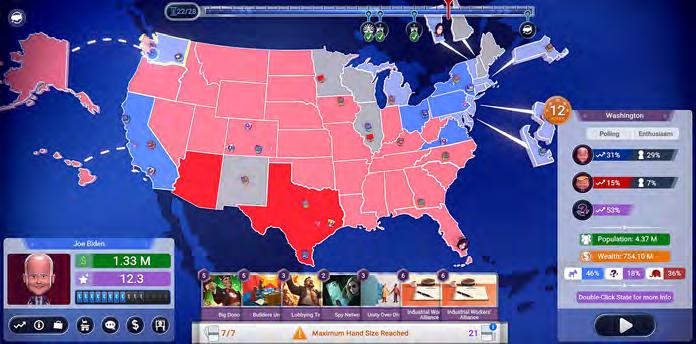
tools sets the Political Process apart from many other simulation games. However, as one Reddit user highlights, those characteristics make attracting a broader audience difficult. “Unfortunately, I think you’ll find the kind of people to buy this game were already very, very into politics to begin with,” they say.
Verlumino, the company behind the Political Process, says games can make politics “more approachable and less intimidating”. Through gameplay, players can learn how the political process works and gain a deeper understanding of political issues. “Games have the opportunity to show alternative perspectives and broaden a
“It’s often a trade-off between mass appeal and realism”
player’s understanding of the world,” they add.
While many young people are frustrated with real-world politics, Priscilla notes, they can “escape” to political simulation games where they have more control and can experience change. It is this ability “to make decisions and see the consequences of their actions in a realistic political context that makes the gaming experience very engaging,” says Battista.
It is as easy as a swipe across the screen and you are president. You expand social programs to appease progressive voters, and lower taxes to keep the business community happy. Your thumbs keep swiping. You stand by your principles and refuse to take part in any fake news campaign. You get trounced at the election. No matter. You can play again tomorrow.
game
Stardock
Stardock
CULTURE 67
Debating in The Political Machine 2024
Presidential gameplay
Fear and loathing in dystopian films
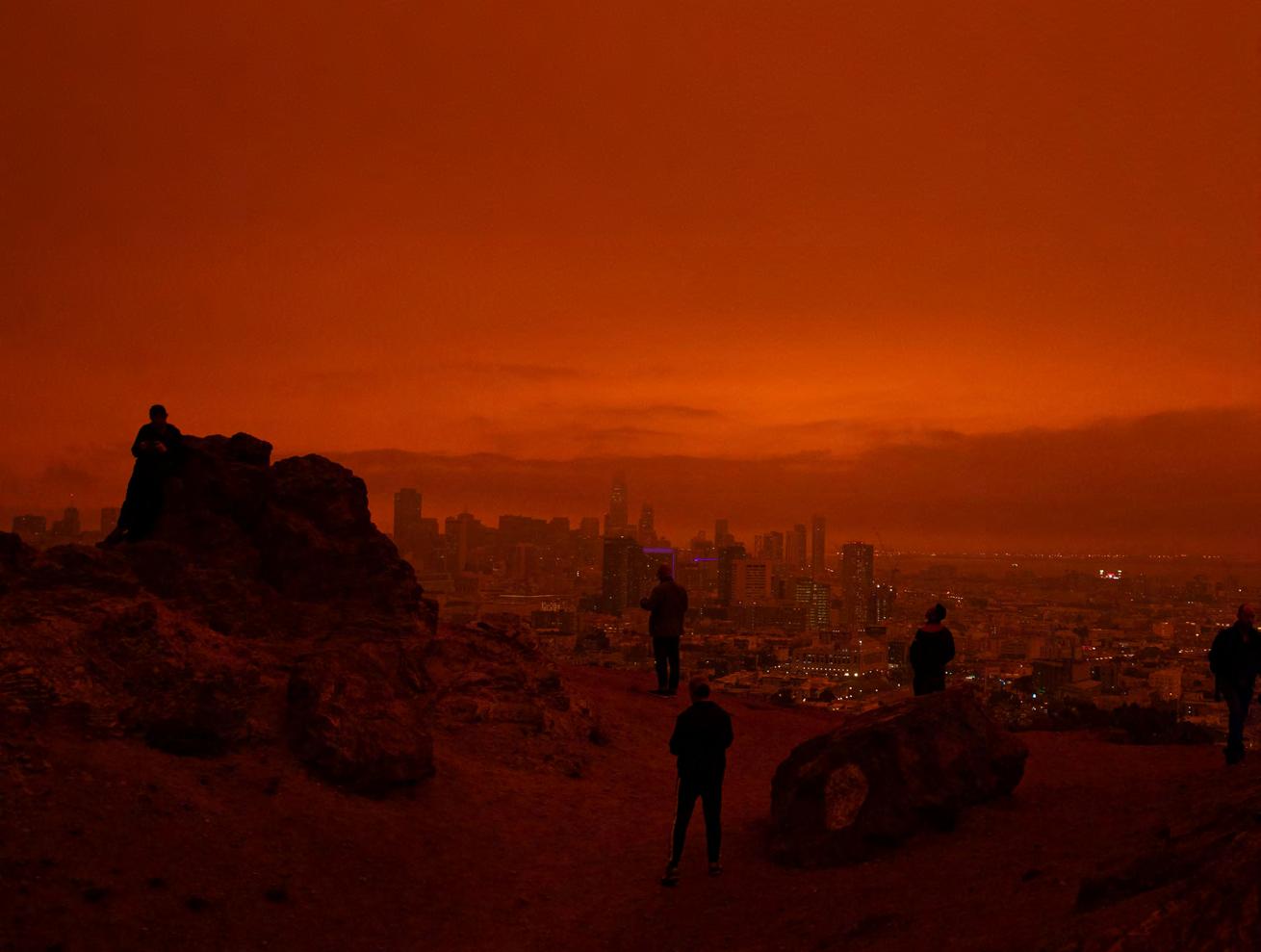
The genre’s rise reflects uncertain times
Vasiliki Tsekoura
Dark and brooding visions of the future have been projected onto our cinema screens with increasing frequency in recent years.
From The Hunger Games to studio A24’s newly released film Civil War, dystopian films are dominating box offices and captivating audiences worldwide. But why do these tales of oppressive societies and environmental catastrophes resonate so deeply with us?
“Dystopian films come from our dystopian reality, where climate breakdown and a new era of dictatorship and fascism is rapidly approaching,” says Lee Grieveson, professor of media history at University College London.
Dystopian films have always blended entertainment with social commentary. They transport audiences to worlds that, while different from our own, echo our fears and anxieties. Whether set in a totalitarian regime or post-apocalyptic wasteland, they offer a lens through which

we can explore our current issues.
Filmmaker Neil West says that these films do more than just entertain – they provide a cathartic experience:
“In an age where headlines often feel like they’re straight out of a nightmare, dystopian films let us confront these fears head on. They allow us to deal with worstcase scenarios in a way that feels both thrilling and oddly reassuring.”
Dr Jean-Baptiste De Vaulx, associate lecturer in film at University College London, says “the appeal is in the escapism. But it’s also about facing our fears in a controlled environment. We watch these heroes rise up and fight back, and it gives us a sense of hope and resilience.”
At the heart of many dystopian stories is a fight for justice and freedom. Characters like Katniss Everdeen and Tris Prior, from The Hunger Games and Divergent franchises, are symbols of resistance, inspiring viewers to believe in the power of
Courtesy of Neil West
San Francisco 2020, after the Labour Day fire
68
Neil West on set
Patrick Perkins
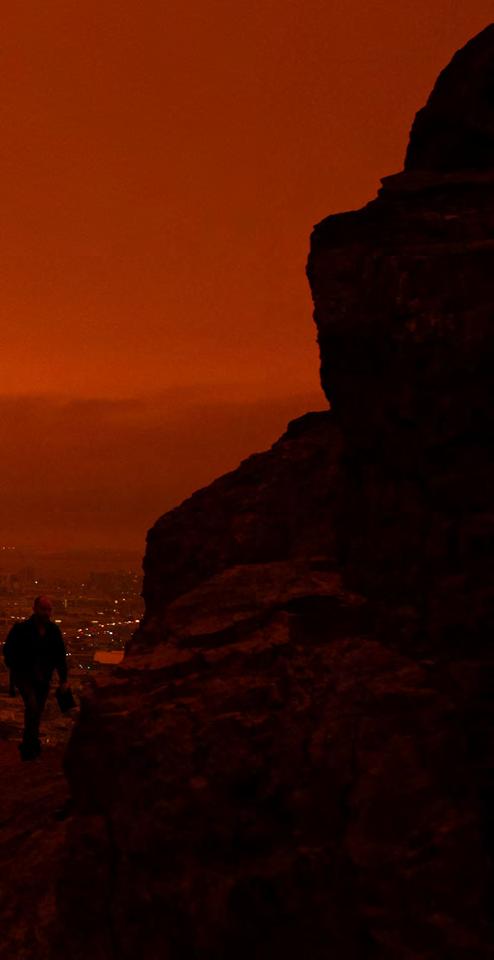
the individual against oppressive systems. This narrative of rebellion and triumph strikes a chord in turbulent times.
“It’s about empowerment,” explains West. “These films tap into the universal desire to make a difference, to stand up against injustice. In a way, they validate our frustrations with the world and encourage us to think about our own potential for change.”
A24’s film Civil War is a gripping addition to the genre. Set in a future America torn apart by internal conflict, the film explores the devastating consequences of political polarisation. “Civil War does a great job in depicting something that may not be that far from the truth considering the upcoming US elections,” says West. “It reflects our current societal anxieties.”
Dystopian films can also offer a potent critique of contemporary society by exaggerating certain elements of current issues. In 2021’s Don’t Look Up, an impending asteroid impact is used as a metaphor for humanity’s failure to take action on climate change. Narratives such as these often push us to ask tough questions about where we are headed and what we can do to stop them from becoming a reality.
“It’s kind of sad in a way,” says West, “that you could arguably have more impacts on a larger scale through a terrifying story about environmental change than you would get if you had a series of environmental experts actually talking about the likely reality of what’s going to happen.”
After seeing Civil War , filmgoer Tom
thought the film reflected his own fears. “It was intense and terrifying, but it felt so relevant. The divisions and chaos in the film hit close to home. It made me think how fragile our society is, and it is almost inspiring to think that we could do something to change the world like they did.”
“While these films can inspire action, they can also lead to desensitisation”
But that does not mean that the impact of dystopian films is always positive. Even among filmmakers, there’s a growing concern that the constant exposure to such pessimistic narratives could foster a sense of cynicism.
“It’s a real risk,” says De Vaulx. “While these films can inspire action, they can also lead to desensitisation. If we’re always seeing the worst-case scenario, we might start to believe that change is impossible.”
Despite this, the ongoing popularity of dystopian films suggests they play a crucial part in our culture. They challenge us to think more critically about our own world and its future. “As long as there are fears to confront and futures to imagine, these dark narratives will continue to draw people in,” says West.

The lone survivor stands on the damaged bridge and looks at the destroyed city covered in volumetric fog. 3D render CULTURE
Alex Shuper
Count recommends
Books and films we think you will enjoy to learn more about the topics we’ve covered!
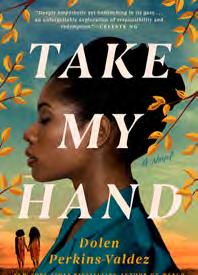
Take My Hand
Dolen Perkins-Valdez
Inspired by true events, the novel tells the story of a Black nurse in post-segregation Alabama who brought light to terrible events happened to some of her Black patients.
 Salvador Oliver Stone
Salvador Oliver Stone
An American journalist covers the Salvadorean Civil War. While trying to save his family, he gets entangled with both the right-wing military dictatorship and the leftist guerrilla groups.
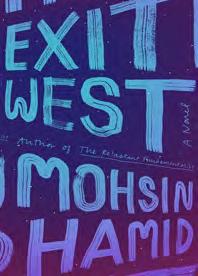
Exit West Mohsin Hamid
Two young people meet when their country enters a civil war. As violence escaltes, they hear a rumor. There are doors that can take people far away. They decide to leave, embarking on a long journey.

Okja

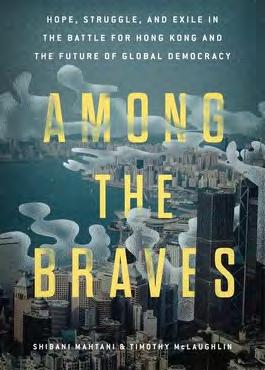
Minor Detail Among the Braves
Adania Shibli
A woman in Ramallah is fascinated to the point of obsession with the 1948 war that Palestinians call the Naqba, the “catastrophe”, and Israeli as their War of Independence.

On My Skin
Bong Joon-ho Alessio Cremonini
For ten years, young Mija has been taking care of Okja, a massive animal. But that changes when a corporation takes Okja for themselves and transports her to New York.
Stefano Cucchi was arrested for a minor crime and mysteriously found dead during his detention. The film covers one of the most controversial Italian court cases in recent years.
Shibani Mahtani and Timothy McLaughlin
Focusing on four core activists, two journalists recall the Hong Kong pro-democracy movement that culminated in the 2019 mass protest and China’s brutal crackdown.

Happening
Audrey Diwan
France, 1963. Anne is a bright and promising student. But when she falls pregnant, every opportunity disappears. Anne resolves to act, even if she has to confront shame and risk prison.
70

Music to our ears
Scan this QR code to hear the playlist inspired by our stories!
In this playlist, you will find a song for each of the features you have just read. Some of them were suggested by our interviewees, some of them we chose ourselves. The songs’ order follows the sequence of the magazine, but here are some examples of what you will find:
Barriers at the ballot box: “Lejos” by La Vida Bohème
An unrecognised democracy: “Somaliland Ani Adi” by Sahra Halgan The elephant in the room: “Europe Endless” by Kraftwerk
Hear from us

Scan this one to listen to our podcast!
In this podcast, you will find episodes on various subjects and themes in our news stories and features. Tune in to hear our Podcast Editor Jasper Goddard and several of our team members debating and discussing both cultural and political issues, such as:
Politicial dystopias in film
The 2024 US election
Latin America’s governments, both stuck and in flux
71
Glossary
Arab
Civil
Deliberative
First past the post (FPTP)
A series of anti-government protests, uprisings, and armed rebellions that swept across much of the Arab world in the early 2010s. It began in Tunisia as a reaction to corruption and economic stagnation.
Page 42
The UK’s voluntary exit from the EU on 31 January 2020. Determined by a 2016 referendum in which 52 per cent of voters chose to withdraw.
Page 14
Refusal to obey governmental commands, especially as a nonviolent and usually collective means of forcing concessions from the government.
Page 16
All forms of social activities undertaken by individuals or groups that are independent of government control, such as non-governmental and humanitarian organisations, labour unions and others.
Page 45
A form of democracy in which citizens reach political decisions after discussing what actions and policies to the greatest public good.
Page 11
Action that seeks to achieve an objective directly and by the most immediately effective means (such as a boycott or strike).
Page 16
An imagined world or society, characterised by suffering, fear or disaster.
68
An electoral system wherein people vote for a single candidate to represent their constituency, and the candidate with the most votes wins without needing a majority. Used in the UK to elect MPs to Parliament.
The generation of people born between 1997 and 2012.
Page 31
Page 19
A form of rule in which a state or society is governed by a group of old people.
Page 30
Arabic for rebellion or uprising. The name given to both Palestinian uprisings in the occupied territories of the West Bank and Gaza Strip seeking to establish an independent Palestinian state.
Page 10
A general term for political ideologies that give precedence to the local, i.e. local production and consumption, localised government and celebration of local history, culture, and identity.
Page 53
Literally “firm hand” in Spanish. A series of hard line policies enacted by El Salvador’s government to tackle prolific gang violence.
Page 38
An entertaining image, video or phrase spreading online.
Page 34
The use of peaceful means, not force, to bring about political or social change.
Page 17
A succession of political leaders who all belong to the same family.
Page 37
The belief that abortion should be legalized because people have the full ability to make autonomous decisions about their own bodies.
Page 28
The belief that abortion should be illegal because the foetus is a human being with a right to life.
Page 29
An electoral system in which the proportion of the total votes cast for a party aligns with the amount of government seats they get.
Page 19
The discriminatory practice of using ethnicity, race or religion by law enforcement as a basis for criminal suspicion.
Page 10
72
Spring
Brexit
disobedience
society
Civil
democracy
action Dystopia
Direct
Gen Z Gerontocracy Intifada Localism Mano Dura Meme Nonviolence Political dynasty Pro-choice Pro-life
Racial profiling
Proportional representation (PR)
Page

Front and back cover: Hannah Te hannah-te.com
Inside back cover: Yves Flores
The team at Count Magazine would like to express our utmost gratitude to Yuen Chan, Malvin van Gelderen, Tom Parry, and Daniel Bourke for their unwavering support and invaluable insight throughout the whole process

countmag.com Instagram @count.mag TikTok @count.mag X @countmag



















 Justine Noble Deputy Editor-in-Chief
Eliana Nunes International Editor
Jamie Onslow Sub-editor
Cahal McAuley Production Editor
Vasiliki Tsekoura Art Director
Kai Kong Photo Editor
Roberta Spada Social Media Editor
Alex Daud Briggs Digital Editor
Heleena Panicker Digital Editor
Jasper Goddard Podcast Editor
Dara Zheleva Reporter
Anastasiia Udesiani Reporter
Abdi Abdalla Sub-editor
Spenser Surerus Art Director
Dom Plaskota Civic Action Editor
Lilian Crastan Culture Editor
Mia Jeronimus Chief Sub-editor
Lara Lovric Deputy Editor-in-Chief
Calum Taylor Voices Editor
Ana Garcia Sancho News Editor
Justine Noble Deputy Editor-in-Chief
Eliana Nunes International Editor
Jamie Onslow Sub-editor
Cahal McAuley Production Editor
Vasiliki Tsekoura Art Director
Kai Kong Photo Editor
Roberta Spada Social Media Editor
Alex Daud Briggs Digital Editor
Heleena Panicker Digital Editor
Jasper Goddard Podcast Editor
Dara Zheleva Reporter
Anastasiia Udesiani Reporter
Abdi Abdalla Sub-editor
Spenser Surerus Art Director
Dom Plaskota Civic Action Editor
Lilian Crastan Culture Editor
Mia Jeronimus Chief Sub-editor
Lara Lovric Deputy Editor-in-Chief
Calum Taylor Voices Editor
Ana Garcia Sancho News Editor
 Alice de Souza Editor-in-Chief
Alice de Souza Editor-in-Chief

 Alice de Souza Editor-in-Chief
Alice de Souza Editor-in-Chief















 Police overlooking pro-Palestine protest 2024
Family at pro-Palestine protest 2024
Police overlooking pro-Palestine protest 2024
Family at pro-Palestine protest 2024









 Abdi
Abdalla
Police watch as protestors occupy Waterloo Bridge
Abdi
Abdalla
Police watch as protestors occupy Waterloo Bridge
 Courtesy of Tom Penketh
Courtesy of Tom Penketh



























 LGBTQIA+ flag near the University of Texas, Austin
LGBTQIA+ flag near the University of Texas, Austin











 Citizens taking pictures with the mascot
Prabowo doing his signature dance
Quinton TembyIndopacifica
Citizens taking pictures with the mascot
Prabowo doing his signature dance
Quinton TembyIndopacifica








 President Nayib Bukele
President Nayib Bukele






 Tunisian protests
President Saied
Gwenael Plaser
Houcemmzoughi
Tunisian protests
President Saied
Gwenael Plaser
Houcemmzoughi


























































 Courtesy of De Kiesmannen
Courtesy of De Kiesmannen

 Courtesy of De Kiesmannen
Courtesy of De Kiesmannen
Attendees discussing protest themes in the club’s late night talk
Courtesy of De Kiesmannen
Courtesy of De Kiesmannen
Attendees discussing protest themes in the club’s late night talk




 Lilian Crastan
Lilian Crastan










 Salvador Oliver Stone
Salvador Oliver Stone









